VENTURE CAPITALISTS SHARPEN FOCUS ON TARGETING STARTUPS’ PROFIT PATHS
SILICONBOX BREAKS BOTTLENECK IN CHIPLET PACKAGING



SG-BASED STARTUP CEOS EARN TRIPLE MORE THAN SEA COUNTERPARTS
NEW BILL TIGHTENS GRIP ON FUNDRAISING AND CONTROL OF FIRMS CRITICAL TO NATIONAL SECURITY
Management Excellence Awards 2023
Issue No. 107 Singapore’s Best-Selling Business Magazine Daily news at www.sbr.com.sg
Display to 30 June 2024 S$5.90
SURVEY MBA PROGRAMMES RANKINGS

Farther: 7,750 nm/14,353 km1
Faster: Mach 0.9352
an innovator. time to flY like it.
your
NBAA IFR theoretical maximum range at Mach 0.85 with 8 passengers, 4 crew and NBAA IFR reserves. Actual range will be affected by ATC routing, operating speed, weather, outfitting options and other factors. All performance is based on preliminary data and subject to change.
Maximum Operating Mach Number.
You’re
Request
private consultation 1
2

Maximum Operating Mach Number.
CIRCULATION: 18,000
ONLINE READERSHIP: 410,000 monthly unique clicks through Google Analytics
The SingaporeBusinessReview is the highest circulating and best read business magazine in Singapore. Our online readership has an average of 215,000 unique viewers, according to Google Analytics. We won the Business Trade Media of the Year Award at the 2017 MPAS Awards.
Do reach out to us if you would like us to tell your story to our readers via print and online advertising or events.
PUBLISHER & EDITOR-IN-CHIEF Tim Charlton
EDITORIAL MANAGER Tessa Distor
PRINT PRODUCTION EDITOR Eleennae Ayson
LEAD JOURNALIST Noreen Jazul
JOURNALISTS Diana Dominguez Gwyneth Bejer
EDITORIAL RESEARCHER Angelica Rodulfo
GRAPHIC ARTISTS Simon Engracial
COMMERCIAL TEAM Janine Ballesteros Jenelle Samantila Cristina Mae Posadas
ADVERTISING CONTACTS Shairah Lambat shairah@charltonmediamail.com
AWARDS Julie Anne Nuñez awards@charltonmediamail.com
ADMINISTRATION Eucel Balala accounts@charltonmediamail.com
EDITORIAL sbr@charltonmediamail.com
SINGAPORE
101 Cecil St., #17-09 Tong Eng Building, Singapore 069533 +65 3158 1386
HONG KONG
Room 1006, 10th Floor, 299 QRC, 287-299 Queen's Road Central, Sheung Wan, Hong Kong +852 3972 7166
MIDDLE EAST
FDRK4467,Compass Building,Al Shohada Road, AL Hamra Industrial Zone-FZ,Ras Al Khaimah, United Arab Emirates
www.charltonmedia.com
PRINTING
Times Printers Private Limited 18 Tuas Avenue 5, Singapore 639342 www.timesprinters.com a member of Times Publishing Limited
Can we help?
Editorial Enquiries: If you have a story idea or press release, please email our news editor at sbr@charltonmediamail.com. To send a personal message to the editor, include the word “Tim” in the subject line.
Media Partnerships: Please email sbr@charltonmediamail.com with “Partnership” in the subject line.
Subscriptions: Please email subscriptions@charltonmedia.com.
Singapore Business Review is published by Charlton Media Group. All editorial materials are covered by copyright and may not be reproduced without consent.
Contributions are invited but copies of all work should be kept as Singapore Business Review can accept no responsibility for loss. We will, however, take the gains.
Sold on newsstands in Singapore, Malaysia, Hong Kong, London, and New York. Also out in sbr.com.sg with an online readership of
FROM THE EDITOR
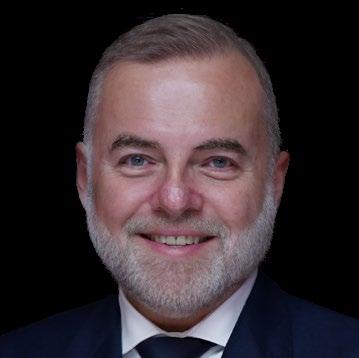
Green tech investments in Singapore are surging as the net zero deadline nears, a trend evidenced in 2023 and expected to continue into 2024. The heightened emphasis on sustainability is reflected in this year's Hottest Startups list, which features four enterprises dedicated to addressing ecological concerns. Learn about these four startups and 16 more groundbreaking companies on page 30 to 36.
We chat with CEO Justin Quek about his plans to steer OrangeTee to a more consumer-centric real estate agency. Know his vision for the company on page 24. We also sit down with Tim Hortons Singapore CEO Vaibhav Punj to discuss the Western coffee market scene and its importance as “third places” in communities. Read his insights on page 25.
In its ninth year, the SBR Management Excellence Awards recognises leaders who have actively engaged with the changing expectations of their stakeholders and have added value to their industries with sustainable and innovative solutions. Head to page 44 to 47 for the list of award recipients.
Congratulations to everyone!
Read on and enjoy.
 Tim Charlton
Tim Charlton
Singapore Business Review is a proud media partner and host of the following events and expos:
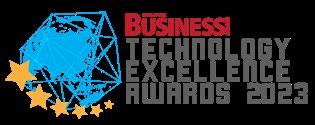



Singapore Business Review is available at the airport lounges or onboard the following airlines:
Singapore Business Review is available at the following clubs and hotels:


2 SINGAPORE BUSINESS REVIEW | Q2 2024
215,000 monthly unique visitors*.
Google Analytics **If you’re reading the small print you, may be missing the big picture caveat emptor About Us
*Source:
Club Hollandse Club Laguna National Orchid Country Club Raffles Country Club Raffles Town Club RSYC Seletar Club Sentosa Golf Club Singapore Cricket Club Singapore Island Country Club Swiss Club The Tanglin Club The China Club The Legends Fort Canning Park The Pines Club Tower Club Singapore Fullerton Hotel Grand Plaza Park Royal Hotel Inter-Continental Le Meridien Orchard New Park Hotel Pan Pacific Raffles Hotel The Hilton The Regent Singapore The Ritz Carlton The Swiss Hotel Stamford Traders Hotel Singapore Darby Park And at 16 serviced residences
American

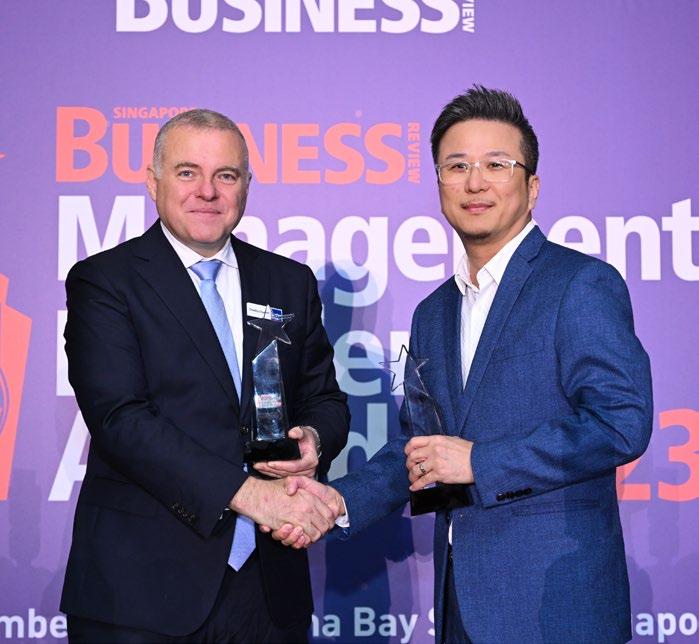
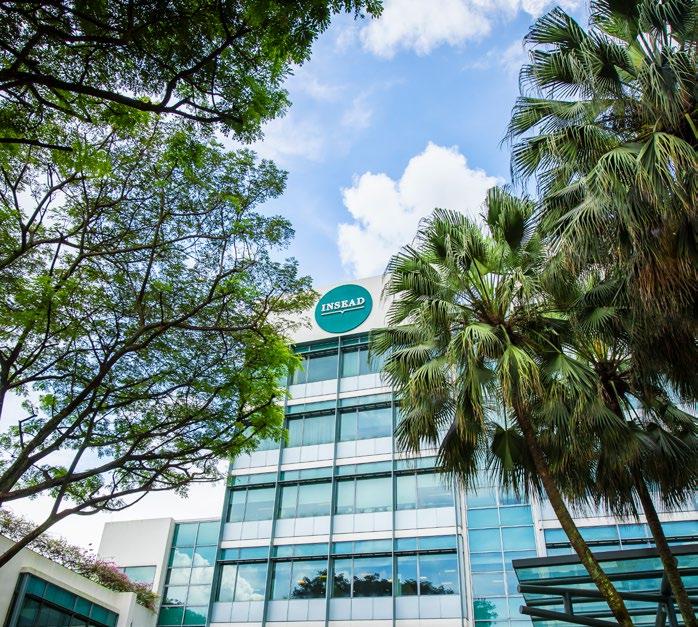

SINGAPORE BUSINESS REVIEW | Q2 2024 3 SINGAPORE BUSINESS REVIEW | MARCH 2018 Published Quarterly by Charlton Media Group 101 Cecil St. #17-09 Tong Eng Building Singapore 069533 For the latest business news from Singapore visit the website www.sbr.com.sg CONTENTS 30 COVER STORY FOODTECH, FINTECH EMERGE AS BRIGHT SPOTS IN HONG KONG’S STARTUP LANDSCAPE MBA RANKINGS MBA PROVIDERS SCRAMBLE TO COUNTERACT FALLING STUDENT INTEREST 37 44 EVENT COVERAGE SBR MANAGEMENT EXCELLENCE AWARDS 2023 HONOURS VISIONARY LEADERS AND TEAMS FIRST ANALYSIS BRIEFING CEO INTERVIEW INDUSTRY INSIGHT FINANCIAL INSIGHT SPACEWATCH STARTUP 08 Singapore's plan to raise retirement and re-employment age sparks debate 09 SG-based startup CEOs earn triple more than SEA counterparts 10 Lessons Lazada's layoffs teach about collaborating with unions 18 Three strategies to mitigate BEPS 2.0's tax impact for MNEs 24 National security is put front and center with new Significant Investments Review bill 25 Why Tim Hortons vies for top spot in Singapore's 'third place' Western coffee scene 26 Strategic locations and valueadded services drive growth in self-storage sector 28 Venture capitalists sharpen focus on targeting startups’ profit paths 14 Airport co-working centre launched for business travellers 16 Aspire’s new vibrant workplace, a tribute to Singaporean roots 12 Silicon Box breaks bottleneck in chiplet packaging 20 Singapore's plan to raise retirement and re-employment age sparks debate 22 Retailers are urged to view returns management as loyalty drivers
News from sbr.com.sg
Daily news from Singapore
MOST READ

MARKETS & INVESTING
10 investment ideas for 2024
Wealthy investors are choosing to diversify their portfolios by investing in private and alternative assets, a strategy that is gaining attention and prompting many others to emulate. Accredited investors in Singapore and professional investors in Hong Kong have also been diversifying into private markets and alternatives, which is underutilised in both markets.
MOST READ COMMENTARY

Could Singapore’s obsession with productivity be problematic for its future?
BY Larissa Murphy
If you look at the statistics coming out of the US, it is well documented that in the current economic climate, neither increasing productivity nor decreasing cost delivers increased profits. Unfortunately, the productivity equation that worked so well in the industrial era is no longer applicable.

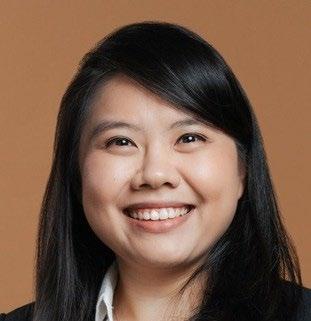
PROFESSIONAL SERVICES/LEGAL LEGAL LUMINARIES
Financial services is the top practice area for SG lawyers
Singapore's rise as a popular destination for high-net-worth families has spurred the demand for legal advice in the financial services space. This, along with the resurgence of asset management and private equity investment activity in Southeast Asia, has made it the top practice area for lawyers in the country.

Building Singapore’s future: embracing technology for safer and smarter construction
BY Haresh
Khoobchandani
From what was a small fishing village just under 60 years ago, the country’s remarkable transformation into a vibrant metropolis with innovative infrastructure, stunning skyscrapers, and clever land optimisation has been an inspiration for many countries and a testament to Singapore’s relentless pursuit of excellence.
20 most outstanding lawyers under 40
Ten women and ten men have made it into the Singapore Business Review's 2024 list of most influential lawyers under 40. This year’s awardees have served and advised big clients such as Keppel Corporation, Temasek Holdings, StarHub, Morgan Stanley, Citigroup, OCBC Bank, and DBS Bank, to name a few.

How 2024 will spark financial services innovation in Southeast Asia
BY Brian Thung
In 2024, Southeast Asia’s financial services (FS) sector will see the profound impact of emerging technologies and strategic innovation. In response to the region’s digital and social commerce growth, the sector will increasingly be characterized by instant cross-border payments, embedded finance and core banking modernization.


CERTIS AVIATION SECURITY
TEAM OF THE YEAR
BUSINESS SERVICES
Certis is a leading outsourced services partner who designs, builds and operates multi-disciplinary smart security and integrated services.
Our multi-service offerings leverage our strong heritage in security, and are augmented by applied AI solutions.
We are committed to building a safer, smarter, better and more sustainable business for our clients.



For more information, visit us at http://certisgroup.com/solutions
SINGAPORE BUSINESS REVIEW | Q2 2024 5
OPPORTUNITIES
DOCUSIGN
DocuSign helps organizations connect and automate how they prepare, sign, act on and manage agreements. As part of the DocuSign Agreement Cloud, DocuSign offers eSignature, the world’s #1 way to sign electronically on practically any device, from almost anywhere, at any time.
Today, over a million customers and more than a billion users in over 180 countries use the DocuSign Agreement Cloud to accelerate the process of doing business and simplify people’s lives.

OPPORTUNITIES
NORDVPN
NordVPN is the world’s most advanced VPN service provider, used by millions of internet users worldwide. NordVPN provides double VPN encryption, Onion Over VPN, and guarantees privacy with zero tracking. One of the key features of the product is Threat Protection, which blocks malicious websites, malware, trackers, and ads. NordVPN is very user-friendly, offers one of the best prices on the market, and has over 5,000 servers in 60 countries worldwide.

OPPORTUNITIES
S P JAIN SCHOOL OF GLOBAL MANAGEMENT
S P Jain School of Global Management (SP Jain) is an Australian business school with campuses in Mumbai, Dubai, Singapore and Sydney. The School offers a plethora of undergraduate, postgraduate, professional and doctoral programs with a motive of crafting leaders for the 21st century workplace. The learning experience provided by them is modern, relevant and truly global. Their full-time MBA programs have significant recognition as evinced through global rankings by Forbes, The Economist and The Financial Times to name a few.
To know more, please visit www.spjain.sg
6 SINGAPORE BUSINESS REVIEW | Q2 2024 visit
FOR MORE INFORMATION on EVENTS AND ADVERTISING PEOPLE | PLACES | SERVICES | OPPORTUNITIES
charltonmedia.com
AGENDA




edgepointinfra.com ONE - STOP ECOMMERCE LOGISTICS www.jtexpress.sg SCAN FOR MORE International Delivery Fulfilment & Warehousing Last Mile Delivery Our Services

Singapore's plan to raise retirement and re-employment age sparks debate
In six years’ time, Singapore is set to shelter one in four citizens aged 65 and older, with the majority of them expressing a desire to remain in the workforce.
Following the previous hike in retirement and re-employment age ceilings to 63 and 68, respectively, in 2022, Singapore has announced its plan to further elevate these thresholds to 64 and 69 in 2026. The goal is set 65 as the age ceiling for retirement and 70 for re-employment by 2030.
Last year, 90% of senior workers who were eligible and wished to continue working were offered re-employment opportunities. This measure represents a step forward in Singapore’s pursuit of broader workplace inclusivity.
“Raising the retirement and re-employment ages would create more opportunities for our seniors to participate more and for longer in the labour market. This also enables businesses to tap into a wider workforce,” Ang Tze Phern, partner for the Employment Group at Rajah & Tann, told the Singapore Business Review.
In taking this course of action, the government needs to consider four key factors for its future policies, according to Ang: life
and healthy years expectancy; timing and pace; government support; and terms of reemployment.
All of these have been considered by the Singapore government, which is why it is gradually implementing the age ceiling until it meets the targeted ages by 2030. Additionally, there are measures in place to provide security and support for both employers and senior workers.
Financial independence
Viewing another perspective, Seow Hui Goh, partner and head of Bird&Bird’s Singapore Employment Group, told Singapore Business Review that from a socio-economic standpoint, the strategy is logical.
“People are living longer… want to work longer, and people are also healthier. So… it makes sense to raise the retirement and re-employment ages, which have consistently
been going up,” Seow said about the government's plan.
“The retirement age isn’t mandatory. It’s just a minimum retirement age [and] you don’t have to force someone to retire at that retirement age. I think it’s pretty unique globally, [as] it’s based on the idea that people should work into their old age for as long as they are able, and willing to do so,” she added.
The Survey on Retirement and Employment carried out by the PAP Seniors Group - Singapore (PAPSG) and NTUC U Women and Family (NTUC U WAF) showed that approximately 88% of participants aged 50 and above support a retirement age of 63 or older, whilst around 80% support raising the re-employment age to 68 or higher. The survey collected responses from 1,471 individuals from 7 to 21 August 2023.
“Culturally, and [philosophically], I think here (in Singapore), it is… seen as a positive thing to be able to support oneself to be financially independent [or] as an older person being able to contribute to the economy. So I think this stems largely [from] cultural, social, and political views of our country,” Seow told Singapore Business Review
This adjustment will affect sectors such as wholesale and retail trade, administrative and support services, transportation and storage, accommodation and food services, and manufacturing. These are the primary industries that employ individuals aged 65 and older.
Workplace and employment concerns
Although this change will benefit a lot of senior workers, it will also be the root cause of some inevitable consequential reactions in the increasingly inter-generational workforce. Ang also predicted that the difference in backgrounds and mindsets, plus the rapid changes in technology in relation to skill sets across different generations, will be magnified. “Generational gaps in values and work ethics may lead younger employees to feel that older workers are not agile enough to meet changing demands, whilst mature workers may feel uncomfortable reporting under a younger authority,” he said.
“Moreover, stereotypes may exist such that older workers tend to be considered less capable of training and adapting to change. This can pose difficulties if the workplace culture is not welcoming of age diversity,” he added.
People are living longer, want to work longer, and people are also healthier. So it makes sense to raise the retirement and re-employment ages, which have consistently been going up
8 SINGAPORE BUSINESS REVIEW | Q2 2024 FIRST
This adjustment will affect wholesale and retail trade, food services, and manufacturing`
& EDUCATION
HR
NUMBERS
STARTUP CEOS TAKE PAY CUTS TO EXTEND CASH FLOW
Have You Taken a Pay Cut in the Past 12 Months? Average Pay Cut Percentages
Base Monthly Salary (USD) for CEOs, CTOs, and COOs by Last Funding Round
Source: Glints and Monk's Hill Ventures Startup Talent Trends Report 2024
SG-BASED STARTUP CEOS EARN TRIPLE MORE THAN SEA COUNTERPARTS
Startup CEOs in Singapore significantly surpass their Southeast Asian counterparts in terms of earnings. Those leading ventures in the US$11mUS$50m funding stage are now earning 3.1 times more, marking an increase from the previous 2.1x gap.
This finding is detailed in the "Southeast Asia Startup Talent Trends Report 2024" by Glints and Monk’s Hill Ventures. The report brings to light an expanding salary gap in a region where startup salaries generally saw a decline in 2023.
The base monthly salary for Singaporebased CEOs of startups at the specified funding stage is between US$19,000 and US$20,000, whilst their counterparts outside Singapore earn between US$5,700 and US$6,700.
Funding stages
At the $0m-$5m funding stage, Singaporebased CEOs earn about 1.7 times more than those outside Singapore, with salaries ranging from US$6,300 to US$7,500 for Singapore-based CEOs and US$3,500 to US$4,500 for non-Singapore-based CEOs.
Similarly, at the US$6m-US$10m funding stage, Singaporean CEOs earn 1.4 times more, with their salaries ranging from US$7,300 to US$8,300, compared to US$5,000 to US$6,300 for CEOs based outside Singapore.
Although startup salaries saw a general downturn in 2023, in Singapore, market salaries are increasing but at a slower pace due to a higher demand for mid and senior talent than the available supply. As a result, overall startup salaries in Singapore increased by 5%.
Base Monthly Salary (USD) for SG-based CEOs vs. Non-SG-based CEOs by Last Funding Round
Source: GlobalData
SINGAPORE BUSINESS REVIEW | Q2 2024 9
FIRST

Lessons Lazada's layoffs teach about collaborating with unions
There is generally no legal mandate for companies to consult unions about layoffs; however, the situation is different for unionised companies. This explains why Lazada's failure to notify the Food, Drinks and Allied Workers Union (FDAWU) about its January retrenchments was met with disappointment by the National Trades Union Congress (NTUC).
"We are extremely disappointed in this move by Lazada. NTUC would like to reiterate that it is critical for companies to work with their union to ensure that a fair and equitable process was carried out to safeguard the interests of all workers, especially our Singaporean core,” it stated.
Ian Lim, the head of Employment and Labour at TSMP Law Corporation, pointed out that Lazada is covered by the Tripartite Advisory on Managing Excess Manpower and Responsible Retrenchment. This advisory mandates that a unionised company must notify its pertinent union about retrenchments before informing the employees.
"[This is the rule if the company is unionised] unless any memorandum of
understanding or collective agreement [entered into by the company] stipulates exactly how the union must be notified," Lim told Singapore Business Review
Apart from adhering to the Tripartite Advisory on Managing Excess Manpower and Responsible Retrenchment, NTUC underscored that companies must also observe guiding principles outlined in the Fair Retrenchment Framework and ensure “openness, transparency and consultation with unions and workers” in the event of any planned retrenchment.
Whilst the tripartite advisory is not a statute, it is something for which administrative sanctions can be levied by the authorities such as the Ministry of Manpower (MOM).
Administrative sanctions can include curtailment of work pass privileges, which Lim said may be a big deal for large
employers like Lazada. The FDAWU had stated earlier that it has escalated Lazada’s layoff lapse to the MOM.
Given that Lazada is unionised, Lim warned that the FDAWU can even drag the company to the Industrial Arbitration Court (IAC) should there be a labour dispute arising from the retrenchment.
Responsibility to notify
Whilst there is no obligation for companies not unionised to consult with a union about workforce reductions, they have the responsibility to inform the MOM as mandated by the Employment (Retrenchment Reporting) Notification 2019.
“You now have to notify the MoM of every retrenchment, as long as you have at least 10 employees,” Lim stated.
He stressed that the whole industrial relations landscape is more concerned with the spirit of fairness. For this reason, the IAC is empowered to decide matters on this basis of fairness, as opposed to just purely what the letter of the contract requires.
“This is why you have had unionised companies still finding themselves subject to consequences even though a collective agreement had not yet been entered into,” Lim said.
When asked if the Lazada layoffs may stir regulation changes in the current tripartite advisory, Lim said: “It’s possible it may ultimately be passed into law.”
So far, however, there has been no sign of moving the advisory into legislation just yet.
On-going negotiations
As for Lazada, it has already issued an apology to the NTUC and the FDAWU for failing to abide by the notification process with regard to its January retrenchment and has agreed to cooperate with the union to do what may be best for the workers.
The company also assured the union that they will be “consulted in advance for any future exercises.”
In an email to the Singapore Business Review, an NTUC spokesperson said negotiations between Lazada and the FDAWU are already “in progress.”
Based on an earlier statement, one of the things that FDAWU wants to negotiate further is additional benefits for the retrenched workers as they found the current retrenchment package “unsatisfactory.”
It is critical for companies to work with their union to ensure that a fair and equitable process was carried out to safeguard the interests of all workers
10 SINGAPORE BUSINESS REVIEW | Q2 2024 FIRST
Lazada laid off over 100 employees on January 3
HR & EDUCATION

FOR COMMAND AND CONTROL
Experience unparalleled oversight and efficient operations with Certis. Harnessing the power of technology and data, we provide real-time visibility and insights for agile decision-making, giving you seamless control over day-to-day operations. DATA-DRIVEN

Discover how Certis is WIRED for your business at certisgroup.com/wired

SINGAPORE BUSINESS REVIEW | Q2 2024 11
OPERATIONS
INCIDENT RESPONSE
MANPOWER
SEAMLESS OPERATIONAL SYNERGY RAPID
REDUCED
STARTUP
Fr8Labs secures major backing to digitalise Asia's freight sector
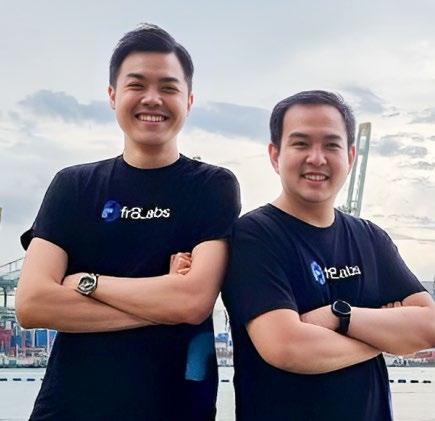
Investors are showing strong support for Fr8Labs, a company set on transforming the freight forwarding sector traditionally bogged down by manual processes.
With a $1.9m (US$1.5m) seed fund, the backing from high-profile firms such as East Ventures, FEBE Ventures, Kaya Founders, Mulia Sky Capital, Seedstars, Venturra, and various angel investors underscores the industry's readiness for a digital overhaul.
Fr8Labs Chief Executive Officer Glenn Lai, has underscored how his company has positioned itself on the path to improve the industry by centralising critical ship information in one platform
that is accessible to both freight forwarders and their customers.
“You can think of us as a SaaS-enabled marketplace for freight forwarders to really level up their game,” Lai told the Singapore Business Review.
Asian market
Localisation is one strategy Fr8Labs focuses on, and this enables them to locate and address nuances specific to Asia.
“There are a lot of local nuances in Southeast Asia and in Asia that are not easy to pass [or] that require a lot of infrastructure builds and local knowledge to be able to cater to correctly. And it takes network, time, and expertise to be able to do that efficiently,” Lai said.
Nevertheless, the vision still extends to being the name player in verified SaaS platforms known by every freight forwarder in the Southeast Asian logistics industry, then expand globally.
“Within five years, we want to be very well known and have sufficient depth in Southeast Asia itself at least, and then parts of Asia. [Our] vision is all about how we create an interconnected freight forwarding or interconnected global supply chain fit for freight forwarders,” the Fr8Labs CEO said.
Startup aims at health before illness strikes
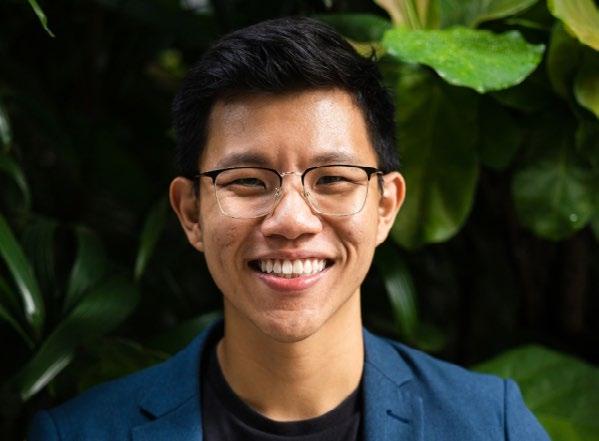
After observing a healthcare industry that is very focused on addressing illnesses and managing diseases, Mito Health co-Founder and CEO Kenneth Lou realised the importance of “upstreaming preventive healthcare” to nip health issues in the bud “before it’s too late.”
Named after “mitochondria,” known as the cell’s powerhouse, Mito Health offers a platform to track health indicators and enhance overall longevity.
“Mito Health focuses on helping our clients order their blood tests [and] run the insights holistically together with
other aspects of their life, like family. We will look at their sleep… exercise, nutrition, diet, and then give them recommendations on where they can do better. So there’s what we define as customised health plans,” Lou said.
Competing with traditional health screening companies, Mito Health offers clients a “10, 20, or 30 year risk horizon” to assess a client’s lifestyle and its possible health implications in 10, 20, or 30 years.
Mito Health offers a $499 flagship panel testing 67 biomarkers in the blood. “The flagship panel is extremely comprehensive [and] is comparable to executive screening services which can go into thousands of dollars. But I think the main differentiator [is that we are] virtual, [so we are able] to transfer those cost savings to our end clients,” he said.
The health tech has raised $2m largely from institutional investors like Forge Ventures who filled up half the round, while angels from PatSnap, Shopback, Carousell, Glints, [and] Dr. Tan Min Han, Founder of Lucence, completed the round.
Silicon Box breaks bottleneck in chiplet packaging
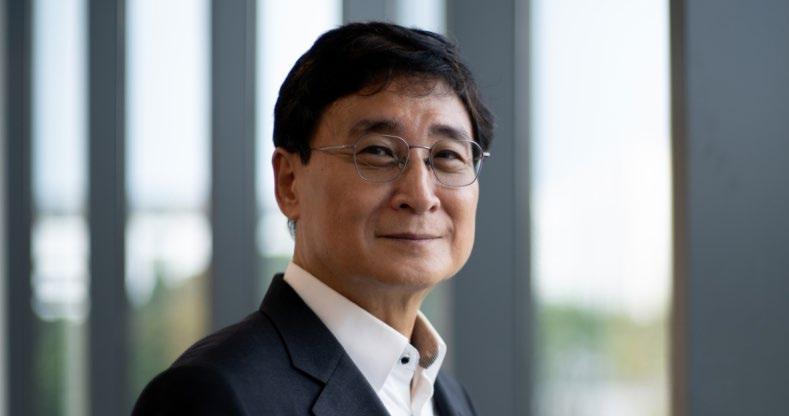
In creating chips, designers have the propensity to prioritise manufacturing ease over performance. To eliminate any compromise, Silicon Box has come up with a chiplet integration technology that can expedite chiplet design cycles and reduce the cost of new devices.
Through its sub-5-micron technology proprietary fabrication method, Silicon Box has the “ability to package chiplets with the shortest interconnections,” leading the way for semiconductor integration whilst offering cost benefits to its partners.
Speaking to the SingaporeBusinessReview, Dr. BJ Han, CEO and co-founder of Silicon Box, underscored that whilst the concept of chiplets is already well accepted across the industry, there is is currently a bottleneck in advanced packaging capability and capacity.
“Our technology uses the shortest interconnections and the world’s first standardised large-format production for chiplet integration,” Dr. Han said. “Our approach has led to the highest electrical performance in terms of speed and bandwidth, the best thermal performance, and the highest reliability by eliminating material interfaces.”
By its own computation, Silicon Box has attained the improvement of electrical performance by over 50% and, at the same time, lowered power consumption by over 40%. This breakthrough is crucial because, as Dr. Han explained: “reducing thermal output means less power is required to cool the device, reducing energy use.”
To address the “missing link” in the “transformational movement towards chiplet adoption," Dr. Han cofounded Silicon Box with Dr. Sehat Sutardja and Weili Dai who were CEO and President at Marvell Technology Group, respectively. “We are ‘box’-ing semiconductors in better ways!” said Dr. Han.
Faster time to market
Apart from shortening the design cycle of chiplets and lowering new device costs, Silicon Box’s technology also allows faster-time-to-market for its partners involved in areas such as artificial intelligence (AI), data centres, electric vehicles (EVs), mobile, and wearables, according to Michael Han, head of business at Silicon Box.
“Our technology and manufacturing process lowers packaging costs for chiplet-based systems by up to 90%, whilst producing chips at high volume. This is because we are able to minimise the form factor of system packages, and manufacture in a large format,” he said.
In July 2023, Silicon Box opened a 750,000 square feet semiconductor factory in Tampines.
“The factory houses a state-of-the-art production line equipped to execute a one-of-a-kind, large-format fabrication method that improves the design cycle of chiplets,” he shared with SingaporeBusinessReview
12 SINGAPORE BUSINESS REVIEW | Q2 2024
Felix Lu, CPO and Glenn Lai, CEO
Kenneth Lou, CEO of Mito Health
Dr. Byung Joon Han, co-founder and CEO of Silicon Box
Small business inspiration from Singapore startups that became global successes
Singapore is a hotbed of entrepreneurial talent, with many homegrown small businesses becoming global success stories.
RedWhite Apparel and Zelos Watches are two such stories of entrepreneurs with the tireless commitment to turn their passion into business success. Delving into their journeys can give other budding entrepreneurs the inspiration and insights they need to enable their own success journeys.
RedWhite Apparel: Revolutionising Cycling Comfort
Yuva Viswanathan founded RedWhite Apparel with a simple yet powerful idea – to make high-performance cycling bib shorts for everyone. His own passion for longdistance cycling helped him identify a gap in the market – the need for cyclists to ride comfortably in high-performance shorts that are also affordable.
His newly founded business then got a boost when he won the FedEx Small Business Grant Contest. Since then RedWhite Apparel has seen consistent growth year on year.
He initially adopted a conservative approach to business growth – focusing on economies of scale and prudent pricing strategies to avoid unnecessary debt. This allowed the business to be resilient even in a niche market. He outsourced many of his business operations from warehousing to order fulfilment. This helped him manage his inventory and control his cash flow. It has also helped him build strong relationships with his suppliers and partners.
Cycling into New Markets
His entrepreneurial gene has always kept him looking for the next new business opportunity. During the pandemic, he identified an untapped market – many prospective customers who had newly taken up long-distance cycling. These beginners needed the ‘entry bib short’ made specifically to meet their requirements and at a lower price than other products. This

new product helped the business register a steady growth in sales and acquire a whole new set of customers.
And by constantly listening to customer feedback, RedWhite Apparel has continuously ideated and refined its product offerings. This has helped it win and retain the loyalty of its customers.
One other factor has contributed to its customer success – working with a reliable logistics partner. RedWhite Apparel’s relationship with FedEx has given it the ability to connect and reach its customers wherever they are, quickly and promptly. This has made the business more efficient and set it up for future success.
Zelos Watches: Crafting timeless elegance
Elshan Tang has been driven by his love for analogue timepieces since his high school days. It is this drive that saw him launch Zelos Watches and run a Kickstarter campaign to fund his business growth.
This helped him reach out to a global target audience and since then, the brand has climbed to the top of many international watch enthusiasts’ lists.
Elshan’s mission is to make great timepiece designs accessible to a wider
Building a business is hard work. By working with a reliable logistics partner like FedEx, you too can streamline and simplify your e-commerce so you can focus more on business growth
audience beyond the confines of luxury brands. The idea is to use only the best quality components and unique materials, so customers can compare across brands – the bigger ones and Zelos – to decide for themselves which is a better investment. This uncompromising approach has made Zelos a sought-after brand among watch enthusiasts looking to get acquainted with regional microbrands.
Streamlining Global Success
Like any other start-up, Zelos has had to navigate through highs and lows. Elshan has had to deal with a host of operational hurdles in his business plans – from suppliers and customer service to marketing and customer satisfaction.
What has helped him navigate many challenges in expanding his business globally is having the right logistics partner. With FedEx’s reliable and fast worldwide shipping, Zelos has been able to deliver its watches to customers quickly and cost-effectively. What’s more, the business gets access to digital tools like the Shopify Ship, Rate and Track app for generating FedEx labels – this has cut down processing time by 25%.
Building a business is hard work. By working with a reliable logistics partner like FedEx, you too can streamline and simplify your e-commerce so you can focus more on business growth. For more resources and guidance to empower your business, visit the FedEx Small Business Center today.
SINGAPORE BUSINESS REVIEW | Q2 2024 13
THOUGHT LEADERSHIP ARTICLE
Connect and reach customers wherever they are, with a reliable logistics partner
SPACEWATCH: JUSTCO
JustCo debuts first pay-per-minute airport hub for business nomads
The co-working space has around 50 hot desks and nap pods, allowing travellers to ‘check-in’ at work.
JustCo has launched a new coworking center at Changi Airport, Terminal 3, charging $0.10 per minute, designed to cater to business travelers and digital nomads. This facility features close to 50 hot desking workstations, private cocoons for focused work, and nap pods for rest, all available 24/7.
“From nap pods and meeting rooms to diverse food options, users have everything they need to stay productive and comfortable during their layover or remote work session,” Kong Wan Long, co-founder and chief commercial officer of JustCo, told the Singapore Business Review
Kong said Changi Airport T3’s flexible pricing model caters to travellers and individuals who need a place to work for a few hours or even just minutes. The price is reasonable at $0.10 per-minute, or $6 per hour.
“Travellers need a quiet workspace for short period to take calls, respond to work emails, or complete other tasks. Additionally, some travellers opt to reach the airport early to get some work done before their flight,” Kong said.
“These different business needs highlight the potential for us to launch Asia’s first pay-per-minute co-working centre at the airport for business travellers,” Kong added.
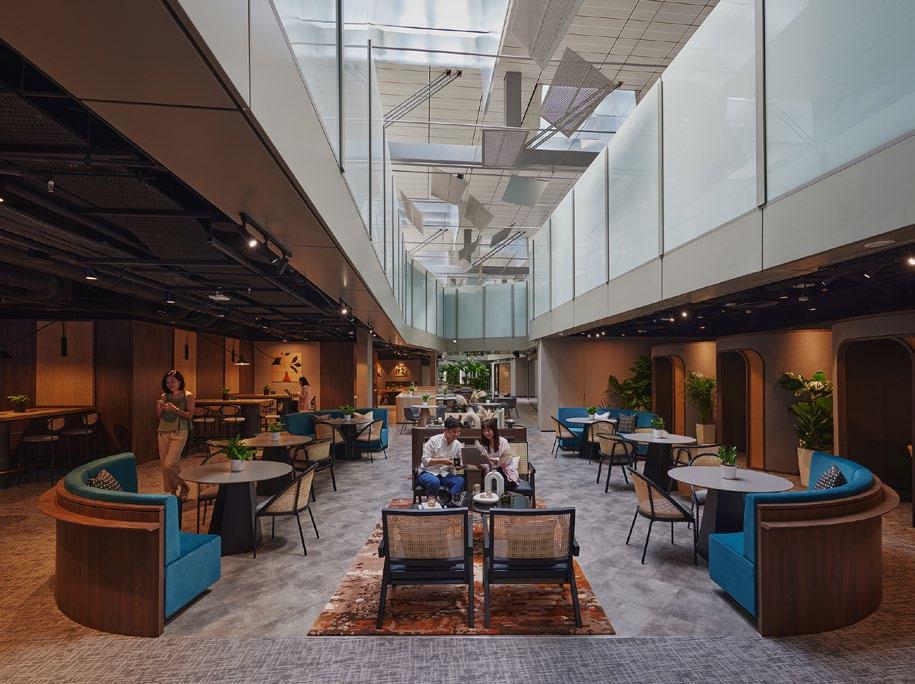
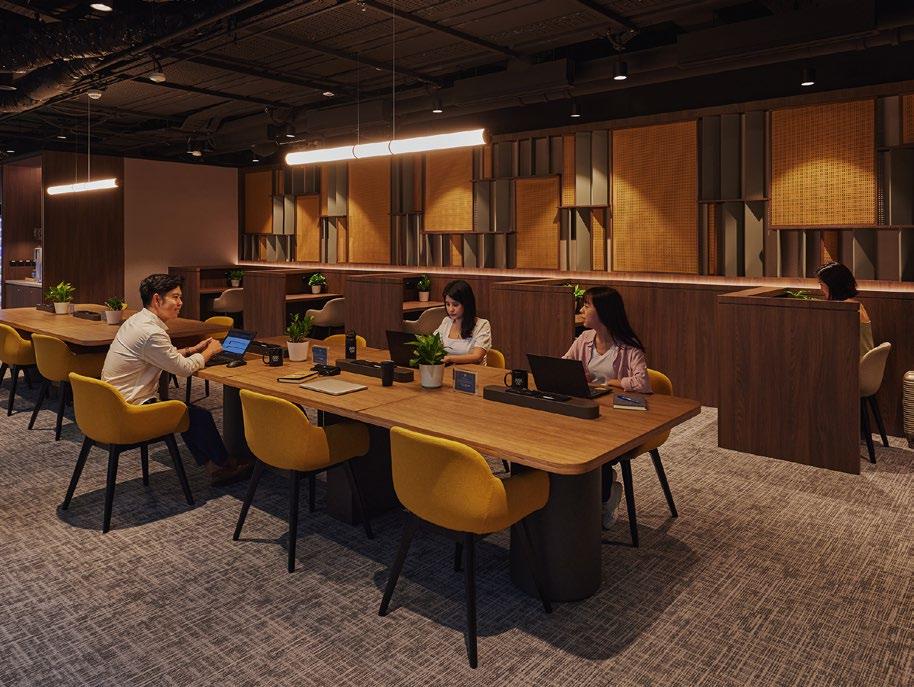
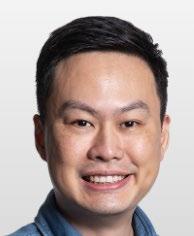
“As business travel resumes in full force and digital nomads increasingly seek out conducive workspaces on the go, JustCo saw an opportunity to launch our first venture in an airport. There is no better place than Changi Airport, renowned for its world-class facilities,” Kong said.
The JustCo Terminal 3 co-working space is heavily influenced by the Changi Airport’s architecture.
The co-working space has a nature-inspired look to create a relaxing vibe, and is adorned with ample wood, rattan, and greenery, among other elements.
“The incorporation of rattan furniture, alongside wooden accents, complements the nature-inspired theme of the centre, creating a comfortable and relaxing atmosphere infused with a distinct Asian touch,” Kong said.
“It also subtly reminds users that they’re nestled in sunny Singapore, evoking a strong sense of place,” he added.
Further showcasing the nature-inspired theme of the centre, JustCo also put tree-like planters with modular mobile seating dotting the pathway to fill the ample space whilst echoing the airport’s arrival hall.
“JustCo’s in-house design team also optimised space usage by curating pockets of open event space that allow flexible adaptation based on the needs of our users,” Kong said.

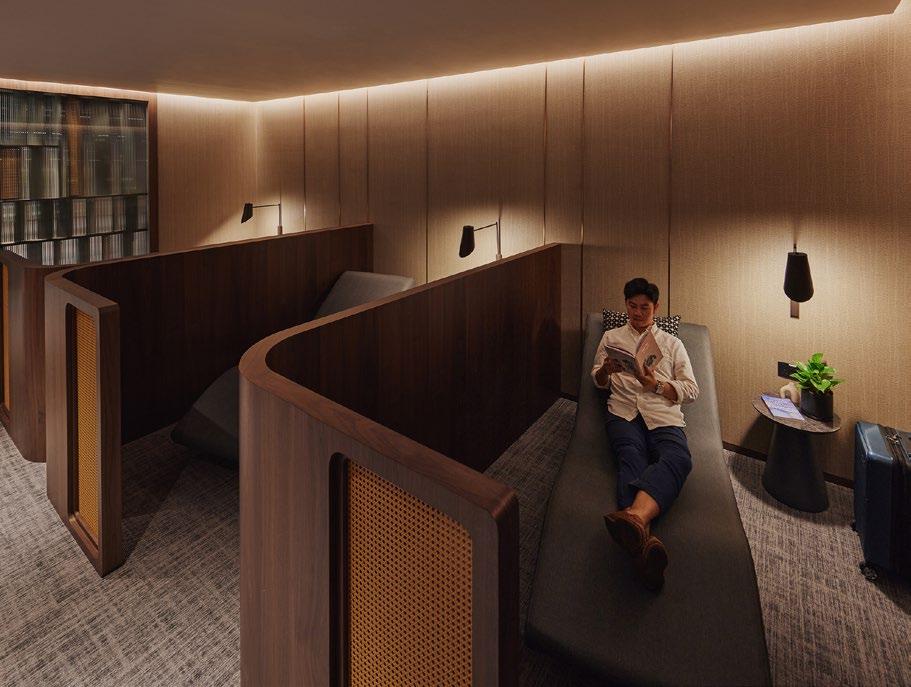
14 SINGAPORE BUSINESS REVIEW | Q2 2024
Kong Wan Long
1 Tree-like planters fill the centre, mirroring the design of Changi airport’s arrival hall.
4 JustCo's nap pods allows travellers to get rest between flights or work.
the
desk
2 For travellers who want privacy,
centre offers hot
cocoons.
3
over 50 hotdesking
1 3 2 4
3 The Terminal
Centre has
workstations.

People are at the centre of what we do at the Lee Kong Chian School of Medicine (LKCMedicine).
Within the walls of the LKCMedicine, our faculty and staff are the lifeblood, and for them, the institution has, in the past year, made many efforts to invest in their wellbeing and development. On many occasions, we took the opportunity to recognise and award their dedication and commitment to the LKCMedicine DNA of excellence.
To signal our commitment to creating a workplace culture that prioritises physical, mental, and emotional wellbeing, the LKCMedicine Cares initiative was set up - in the midst of the COVID-19 pandemic.
It focuses on wellbeing beyond physical health and includes activities on social wellbeing and mental health to better support the needs of the LKCMedicine staff and faculty, especially during the COVID period when there was reduced in-person social interaction.
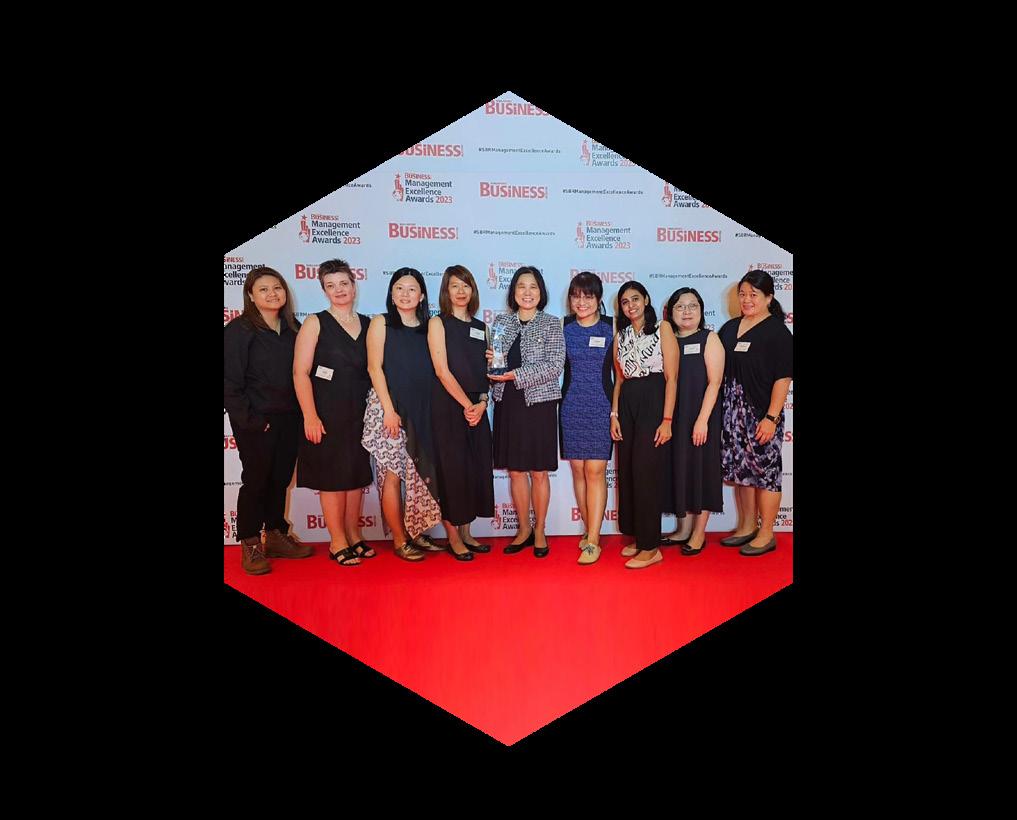
The programme has since taken off. Staff could participate in a wide spectrum of events and activities, including mindfulness workshops, psychological first aid, fitness classes, health screening, coffee chats, and other social events. Plans for a network of peer helpers for colleagues who may need support are in the pipeline.
As a testament to its success, the LKCMedicine Cares team received the Singapore Business Review (SBR) Management Excellence Awards 2023 for the Health & Wellness Initiative of the Year (Education category).
SINGAPORE BUSINESS REVIEW | Q2 2024 15
SPACEWATCH: ASPIRE
Aspire's new headquarters is a nod to Singapore's iconic MRT stations
It also incorporates greenery to reflect Singapore's identity as the Garden City.
In the Central Business District, fintech startup Aspire has unveiled its new headquarters, a workspace that pays homage to the city-state's Mass Rapid Transit (MRT) stations. Named after famous stops like Orchard, Marina Bay, East Coast, Chinatown, and Little India, the themed meeting rooms are a testament to Aspire's appreciation for Singaporean culture and its ambition to stand out in the competitive fintech landscape.
Aspire was founded with the vision to harmonise the fast-paced nature of fintech with serene, conducive work environments. Reflecting Singapore’s identity as the Garden City, it has incorporated greenery throughout the interiors of its 8,200-square-foot property.
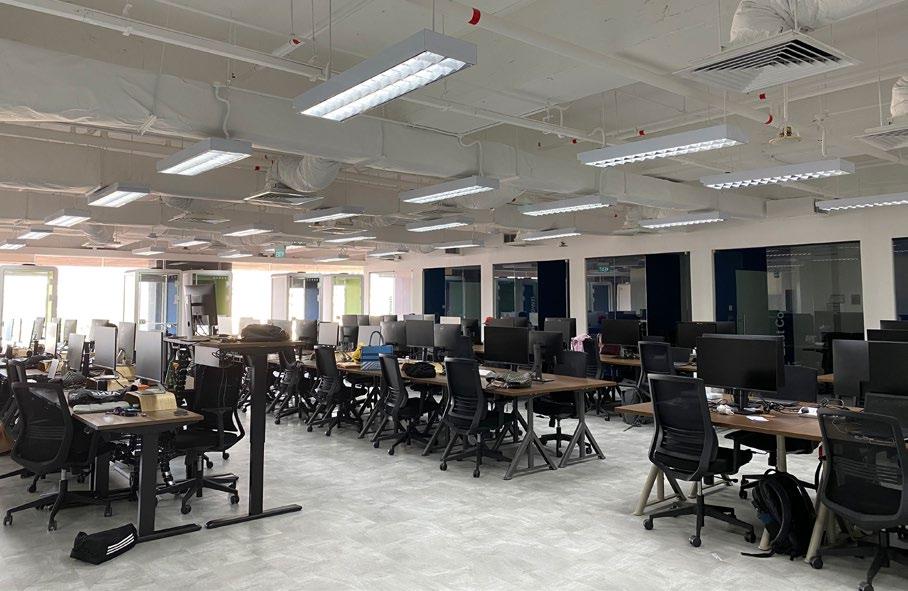
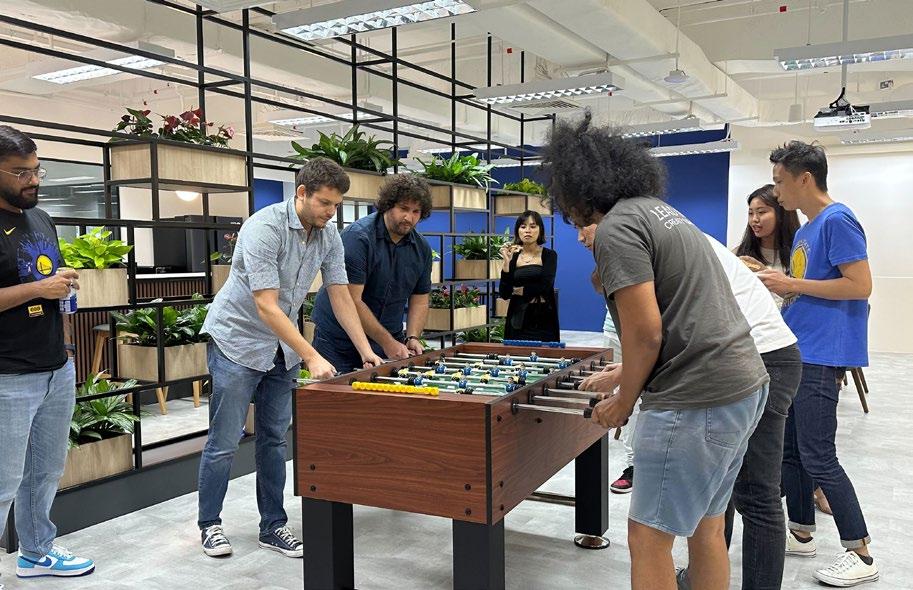
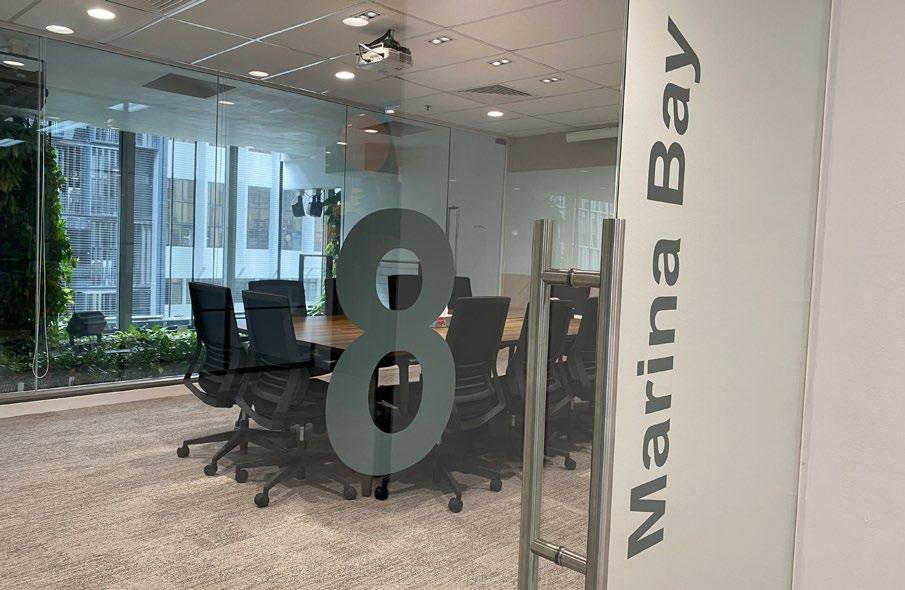

Standing as the largest office in Aspire’s portfolio, the 8,200-square-foot floor area also features a diversified collection of spaces including a webinar room, an events space, and informal meeting areas.
“Our new headquarters is equipped with a variety of spaces designed to foster creativity, collaboration, and better relationships not just amongst our employees, but also with external industry players,” CEO and co-founder Andrea Baronchelli shared with Singapore Business Review.
“Our hot desking system arrangement also means that we have no fixed seating which fosters serendipitous interaction and reinforces our flat culture - even [I, the CEO, don’t] have a fixed seat,” Baronchelli said.
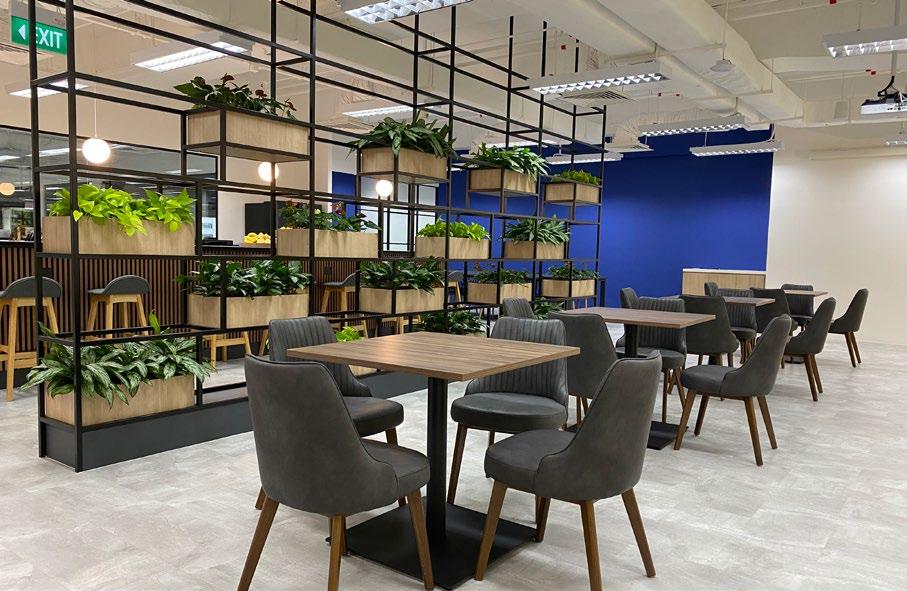
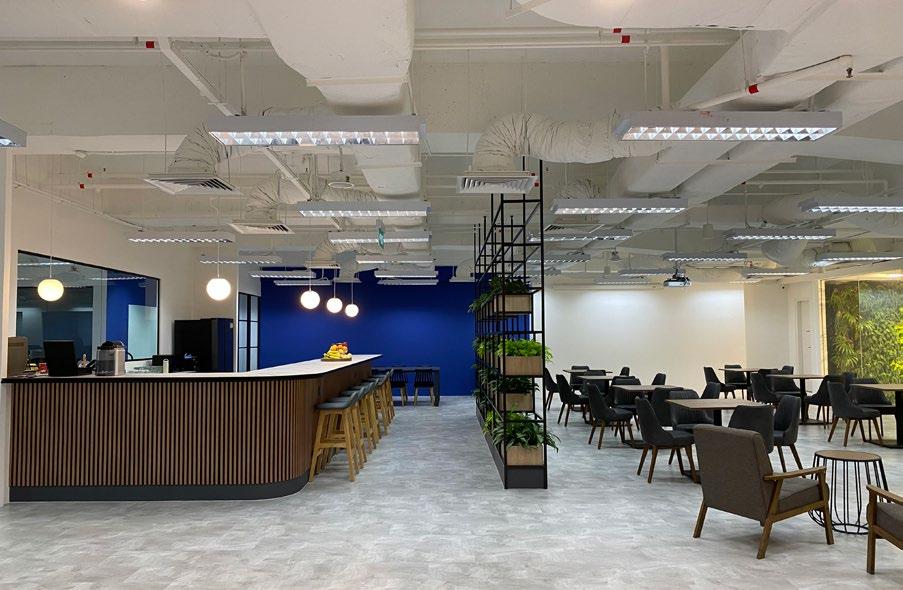
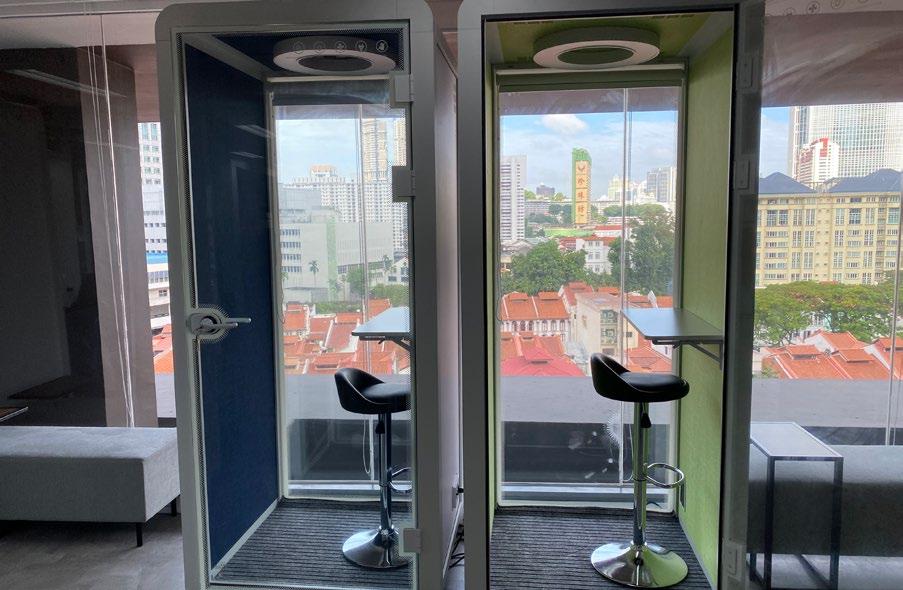
1
4
5
6
16 SINGAPORE BUSINESS REVIEW | Q2 2024
Andrea Baronchelli
An open space office allowing for better communication and connection
A spacious work cafe that can also be converted into an events space
wall
with
off a calm and refreshing ambience
2 A
panel
plants giving
Meeting rooms
Singapore MRT stations
named after
game space featuring billiards, table tennis,
a foosball table
3 Aspire’s
and
Phone pods for privacy and silence 1 3 5 2 4 6
Tcube: Driving Singapore's tourism industry forward
As the tourism industry evolves, businesses face a need for innovative solutions to meet consumer demands. Explore how Tcube empowers businesses to navigate transformation.

The digital transformation landscape is replete with buzzwords like AI (artificial intelligence), IoT (internet of things), CRM (customer relationship management), RPA (robotic process automation), ML (machine learning), AR (augmented reality), and VR (virtual reality). Whilst these can offer opportunities, they also pose challenges for business leaders, especially those in tourism and hospitality.
Questions on investments, operational changes, staff training, and expected outcomes loom amongst these organisations, with concerns on the success of transformation haunting endeavours.
According to a survey by PulsePoint Group, 84% of digital transformations fail, contributing to hesitancy amongst businesses to disrupt what already works for them. Enter Tcube of the Singapore Tourism Board (STB), designed as a one-stop tech resource tailored specifically for tourism-related businesses.
Through Tcube, the STB can offer its wealth of expertise and resources in innovation and technology to support tourism stakeholders in their digital transformation journey, where Tcube can provide a range of initiatives to address their challenges at different stages to make it accessible for business leaders to get started.
For instance, the Tourism Transformation Index (TXI) empowers companies to perform self-diagnostic tests to identify gaps and map out their transformation plans. By utilising TXI, businesses gain insights into their digital readiness and receive recommendations to navigate their transformation journey.
Evolving needs and evolving challenges
Consumer demands have shifted significantly, with a growing preference for convenience and personalised experiences. A survey by Oracle Hospitality and Skift revealed that eight in 10 travellers prefer hotels offering
self-service technology, highlighting the expectation for businesses to leverage technology to meet customer needs.
One such business that has successfully leveraged Tcube is PARKROYAL COLLECTION Pickering. With Tcube, they managed to maximise their potential with 10 to 15% of its 127 software supported by STB. The company’s General Manager, Kung Teong Wah, shared insights into their transformative journey: "Tcube helps us by looking at the cutting-edge startup technologies the hotel can adopt. It allows us to conduct proof of concept (POC) hospitality solutions together
"STB’s Tcube helps us by looking at the cutting-edge startup technologies the hotel can adopt"
- Kung Teong Wah, General Manager, PARKROYAL COLLECTION Pickering
with STB, for us to improve guest experience, improve productivity, and adopt tech.”
PARKROYAL COLLECTION Pickering also benefitted from Data Analytics Shift (DASH) under Tcube, which aims to equip industry partners with enhanced data capabilities. Through DASH, businesses develop skills in data analytics and gain access to data sources, including hotel data and visitor profile statistics from the Singapore Tourism Analytics Network.
In DASH 2.0, the programme's second iteration, Tcube partnered with companies offering third-party data sets like Near and ForwardKeys. As a result, PARKROYAL COLLECTION Pickering was able to leverage 3.5 million data points from Tcube to gain deeper insights, enabling it to anticipate demand and tailor its offerings to maximise revenue. STB also supported the business’ digital transformation through funding, partnerships, and education.
Under the Business Improvement Funds,
an exclusive grant offered to support technological innovation and business model redesign in the tourism sector, the company managed to offset around 30% to 50% of its digitalisation costs. With support from STB, tourism and hospitality businesses can also have access to grants under the Training Industry Professionals in Tourism, growing the capabilities of PARKROYAL COLLECTION Pickering’s employees.
“STB came in as an accelerator to support us in this transformation, where they accelerated skills through SkillsFuture and accelerated workforce performances through Workforce Singapore (WSG),” said Kung.
Creating an ecosystem of support
Tcube's standout benefit is that it allows businesses to join an ecosystem that not only helps and supports tourism and hospitality businesses but also encourages startups or scaleups to be innovative through the Singapore Tourism Accelerator.
The programme offers a distinctive opportunity for tourism companies to adopt new and innovative solutions that may otherwise be challenging to source and implement independently. With a focus on curation and customisation, the Singapore Tourism Accelerator facilitates close collaboration between STB, partners, and businesses, ensuring that the solutions piloted are relevant and meet the sector's needs.
As is the case with PARKROYAL COLLECTION Pickering, through strategic partnerships with STB, they have embraced cutting-edge solutions such as MAPXUS, enriching guest experiences with mobile indoor mapping technology.
Reflecting on their transformation journey, Kung emphasised the importance of personalised high-touch hospitality with high-tech solutions. “We shouldn’t be using the excuse of avoiding technology simply because we are in the hospitality industry – where personal touch and physical work are key."
Tcube illustrates the potential for the future of tourism, highlighting that transformation is not daunting with a dependable partner.
Ready to transform your business?
Discover more at https://www.stb.gov. sg/content/stb/en/trade-events-andresources/Tcube.html
SINGAPORE BUSINESS REVIEW | Q2 2024 17
CO-PUBLISHED CORPORATE PROFILE
PARKROYAL COLLECTION Pickering leverages Tcube to meet customer needs
ANALYSIS: TAXATION
Three strategies to mitigate BEPS 2.0's tax impact for MNEs
Should the directive be implemented, selected MNEs will be subject to a global minimum tax of 15%.
Multinational enterprises (MNEs) with revenues exceeding US$1.1b (€750m) are confronted with challenges due to the implementation of the Base Erosion and Profit Shifting (BEPS) 2.0 framework, particularly the introduction of a 15% global minimum tax rate. This rate is aimed at preventing tax base erosion and profit shifting by ensuring MNEs pay a minimum amount of tax on their earnings, regardless of where they choose to locate their profits.
In anticipation of further global tax reforms, Singapore plans to adopt the BEPS 2.0, or the second phase of rules for business financial years starting on or after 1 January 2025, according to the Ministry of Finance. This next phase is anticipated to influence at least 1,800 MNEs operating in the country.
To navigate the challenges of the new tax directive and mitigate its impact, KPMG experts Harvey Koenig and Yong Jiahao propose three strategies.
QRTC Scheme
One way for Singapore to offset the effects of the tax directive is to introduce a Qualified Refundable Tax Credits (QRTC) scheme.
According to Koenig, the QRTC can be used to incentivise research and development (R&D) and sustainability activities.
“Other countries have already started to introduce [the QRTC] into their own regimes. With many countries looking to introduce the QRTC, it may be imperative for Singapore to introduce it sooner rather than later to maintain its competitiveness,” Koenig said.
The concept of the QRTC can also be extended in the form of production tax credits, said the expert.
“In the US, this production tax credit had been introduced to support the production of renewable energy, and even for energy products, such as solar panels. This can be an effective

Any tightening of the qualifying conditions could hamper potential growth of the Singapore asset and wealth management industry
replacement for tax incentives that Singapore has been offering to companies in the manufacturing sector,” said Koenig.
Renewal of various fund tax incentives
Yong, for his part, suggested that the government consider renewing various fund tax incentives “without an increase in the economic conditions that are tied to them.”
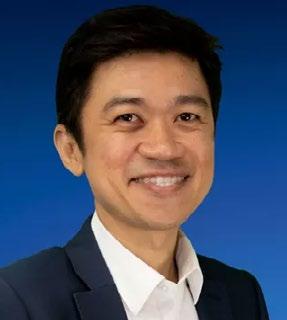
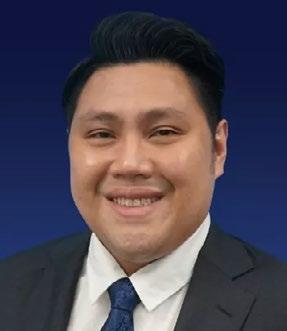
“In a rapidly evolving fund landscape where there is competition from various financial centres in the region, any tightening of the qualifying conditions in terms of the fund incentive could hamper potential growth of the Singapore asset and wealth management industry,” Yong said.
Enhance current tax rules
Another initiative the government can look at to boost the country’s business environment is enhancing its current tax rules.
“We currently have an exemption in the income tax on gains derived in respect of disposal of ordinary shares; however, there’s a condition in that the seller must own at least 20%
shareholding,” Yong shared.
“We would like to propose the government to consider reducing this 20% shareholding threshold to only 5% which would then put Singapore in line with the participation exemption rules in various other countries. Hopefully, this can potentially then lead to an increase in investment holding activities in Singapore, even in the post BEPS era," Yong added.
Notwithstanding the introduction of the global minimum tax of 15%, Koenig said Singapore remains an attractive investment location.
“Its 17% corporate tax rate is still lower than many other countries in the world. Singapore also has many other things going for it, like its strategic geographic location, its English-speaking workforce and strong IP protection rule,” he said.
He reiterated that whilst Singapore has a lot of things to boast about, it needs to ensure that its regime continues to be attractive.
“It needs to rebalance its incentives, which may include offering cash incentives, loans, and continuing to invest in R&D to attract knowledge industries,” he said.
18 SINGAPORE BUSINESS REVIEW | Q2 2024
ECONOMY
Minister for Finance Lawrence Wong announced the details of BEPS 2.0 during the SIngapore Budget 2024
Yong Jiahao
Harvey Koenig

National security is put front and center with new Significant Investments Review bill
Legal experts believe cybersecurity and AI entities are likely to be affected by the measure.
Singapore has enacted the Significant Investments Review Bill to tighten scrutiny on major investments and changes in control of entities critical to national security. Legal experts suggest that this will impact how companies strategise fundraising and manage leadership changes, adding layers of complexity to the appointment of key personnel and the exit strategies of large shareholders. The law could reshape the landscape for businesses in sectors like critical infrastructure, sensitive technologies, and essential services, as they must now navigate stricter regulatory hurdles before making significant corporate decisions.
The Significant Investments Review Bill requires “designated entities” or companies identified as crucial to Singapore’s national security to perform enhanced due diligence on potential investors, particularly for those acquiring a stake of 12% or more, said Bird&Bird counsel Jolie Giouw in an interview with Singapore Business Review.
“[They may need to] adjust their fundraising strategies if certain investors are unable to obtain the requisite approvals to hold interests in such designated entities,” Giouw said.
“[This] may have far-reaching implications when the investor is part of a large group or conglomerate,” Giouw said.
“For individuals, in addition to family members, two individuals are also associates of each other if they are employees of the same employer, which means that individual investors may potentially have to undertake such checks on all their colleagues employed by the same company,” the law expert from Bird&Bird explained.
Giouw said investors of “designated entities” will need to notify or seek approval from the government of a possible investment if it reaches the specified shareholding thresholds. This figure is calculated on an aggregated basis between the investor and its associates.
The enhanced due diligence provided for by the bill will also affect the appointment of key personnel like board of directors, board chairperson, and CEO, in the designated entity. “[The measure] will lengthen the process of leadership change and renewal, and may require companies to ensure sufficient buffer for handover when senior management resigns in order to ensure the approval process can be completed in good time,” Giouw said.
The legal expert added that exiting a company that is a designated entity will be more difficult, especially for certain large shareholders, given that an approval must be sought before cessation of such shareholding interest.
Likewise, designated entities will not be able to be voluntarily wound up or dissolved without approval.
“There is no turnaround time prescribed for the review of such applications unlike in other jurisdictions such as the United Kingdom. This could potentially create a significant amount of uncertainty and delay in transactions,” Giouw said.
Designated entities
As of this writing, the government has not identified the designated entities, but according to Yang Eu Jin, partner

Various factors will be considered, including whether the entity is a key provider of security-related functions, particularly where there are limited or no alternatives
at RHTLaw Asia, the list could include entities involved in critical infrastructure or those developing or using sensitive technologies or government-linked corporations such as Singapore Airlines and Keppel.
Other sectors such as cybersecurity and artificial intelligence (AI) could also become sectors of concern to the government given the advancement of technology and the increased risk of cyber-attacks, Yang said.
“In deciding whether an entity should be a Designated Entity, various factors will be considered, including whether the entity is a key provider of security-related functions, particularly where there are limited or no alternatives,” the law expert added.
Giouw said entities providing goods and services that are critical to Singapore’s sovereignty and security, including continued delivery of essential services that are not currently covered by existing regulations may also be included in the list of designated entities. Financial institutions and utilities providers follow sectoral legislations.

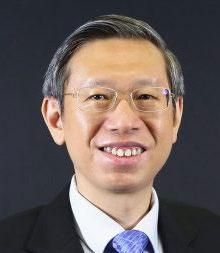
“In light of the recent pandemic, these could include large scale critical private sector healthcare providers, suppliers to emergency services or critical suppliers within the food supply chain in Singapore. Examples provided by the government are key providers of security-related functions where there are few or no alternatives,” Giouw said.
Not an interference
Whilst the government plans to impose restrictions on designated entities, like requiring prior approval for significant ownership or control, it asserts no intention to intervene in routine commercial decisions or operations.
Giouw added that the “call-in” power of the government is also limited in Singapore, when compared with provisions set in other jurisdictions.
“In Singapore, the minister may only review ownership or control transactions involving entities that are not designated entities if the entity has acted against national security interests, not merely pose potential threats, and such transactions occurred within two years prior to the action against national security interest,” Giouw said.
20 SINGAPORE BUSINESS REVIEW | Q2 2024 LEGAL BRIEFING
Entities involved in critical infrastructure such as Singapore Airlines may be affected
Jolie Giouw
Yang Eu Jin
ECONOMY | by Noreen Jazul




MARKETING BRIEFING
Retailers are urged to view returns management as loyalty drivers
15% of customers abort a transaction if the return policy is subpar.
Returns management is now emerging from the shadows to claim its rightful place as a core element of any retailer’s customer strategy, as trends show that it is one of the most effective means of retaining customer loyalty and satisfaction.
However, some retailers still choose to shelve this concern, resulting in a disorganised or dysfunctional system.
“The industry needs to shift its mindset from viewing the return experience as a revenue drain to seeing it instead as a loyalty driver,” Michelle Evans, global lead for Retail and Digital Consumer at Euromonitor International, shared in an interview with Singapore Business Review.
How to handle returns
Returns can be prompted by a variety of reasons but one thing’s for sure: a returned item came from an unhappy customer. To counter this, retailers must deploy strategies that would work best for their brand.
For example, Evans said that for some brands, offering their customers generous compensation has proven to be an effective in retaining the consumers' patronage.
“Innovative retailers can create returns policies that offer more generous terms on higher margin goods. For example, US-based retailer Target offers a more lenient return policy on its 45 store brands,” Evans told Singapore Business Review.
“Another option is to offer a more favourable returns policy as part of a loyalty membership programme to reward those who regularly shop with the brand,” she added.
Greg Buzek, president and lead analyst of global market research and analyst firm IHL Group, suggested that encouraging customers to return items in-store is also a good strategy as customers may be prompted to buy additional items.
Euromonitor’s Voice of the Consumer: Digital Survey showed that 43% of digital consumers point to mail as the preferred channel for online purchase returns, with preferences varying by generation. For example, Baby Boomers prefer to return by mail, whilst Gen Zs prefer to return in-store.
“Though on the decline, half of digital consumers desire free returns, citing it as the most preferred delivery feature only after free delivery (63%). 15% say they will abort a transaction if the return policy is subpar. In addition, consumers value prompt refunds,” Evans said.
Third-party services
In mitigating the overwhelming stress brought about by returns, Buzek also suggested exploring innovative systems and “leveraging a trusted third-party service that can help design and execute the reverse logistics process.”
Commenting on this, Evans said: “Other retailers, especially in Europe, participate in an open locker network to make delivery and returns more convenient and cost-effective.
To create and implement a successful returns management system, retailers should be able to balance the benefits to themselves and the customer.
Evans cited samples from some renowned global retail-

ers, “TJ Maxx, Zara and H&M are charging a nominal fee of US$2-US$12 for returns to offset the expense." Besides compensation, brands also revamp their timeframes. Evans added, "Some retailers have [also] shortened the return window to discourage return fraud, and incentivise customers to opt for an exchange or store credit.”
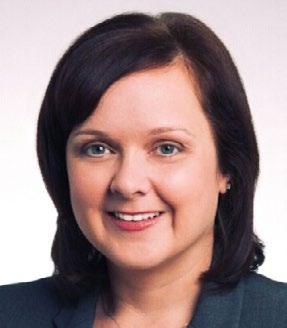


“By offering seamless, free-of-charge returns and prioritising swift refund processing, e-commerce companies can enhance customer loyalty and differentiate themselves in a competitive market,” she said.
Optimizing omnichannel solutions
To cater to the ever-evolving digital sphere, Buzek highlighted the importance and strategic use of data and analytics to determine the optimal price, channel, and timing for reselling or liquidating the returned items.
Buzek affirmed that the use of AI-powered features in retailers' digital platforms such as “true-fit sizing technology, virtual try-ons, and chatbots can help customers make better purchasing decisions and reduce returns.”
In Asia, Thailand-based fashion brand POMELO embraces technology in developing a seamless supply chain management system through its Tap.Try.Buy feature.
“In POMELO we have an omni-channel approach that we call Tap.Try.Buy. We allow customers to select online in their application item that they want to try on, select the store that they would like to try and get it delivered to the store [which] the customer can try within 24 hours,” explained Lai Tze Siung, chief logistics officer at POMELO Fashion.
With the Tap.Try.Buy feature, customers can try on their desired item at preferred stores where they can either choose to buy it or leave it at that store. This enables POMELO to complete a whole purchasing cycle within 24 hours.
22 SINGAPORE BUSINESS REVIEW | Q2 2024
Processing returns in-store may prompt customers to buy more items
Michelle Evans
Greg Buzek
Lai Tze Siung
RETAIL | by Diana Dominguez



SINGAPORE BUSINESS REVIEW | Q2 2024 23
CEO INTERVIEW CEO Justin Quek steers OrangeTee to real estate centered around customers
A step toward this commitment is the launch of the consumer-centric event ‘Property Festival’ in 3Q24.
When Justin Quek assumed the role of CEO at OrangeTee, one of his primary objectives was to make the once agent-centric business into a more “consumer-centric” one.
“A lot of agencies have focused very much on the agents for many years, but as you can see the consumers are being more empowered today. We would like to join in that ball game as well because if you don’t empower the consumer, the consumer has many alternatives,” Quek shared in an interview with Singapore Business Review
One of the ways Quek plans to deepen the agency’s focus on consumers is through a “Property Festival.”
Whilst Quek cannot divulge the details of the festival just yet, a whole lot of planning is put into staging this breakthrough event in the third quarter of the year.
What the festival promises attendees is that it will be a consumer-centric event reeling in real estate enterprise leaders for a learning engagement all about property and related topics.
“A lot of players in the industry like to do seminars where they’ll have a big ballroom full of people learning how to invest in property. I think education is important and we will still continue to do that but that has become, I would say, a secondary piece today,” Quek said.
The festival will also be a gathering of OrangeTee’s strategic partners including mortgage and financial partners and property listing platforms, he said, adding that it will be an avenue for their agents to reach out to new prospects as well.
3 Ps
Partnerships, alongside improving presence and productivity, are also one of OrangeTee’s main focuses this year, said Quek. “We’ve realised that OrangeTee actually has, even at our shareholder level, very interesting and formidable partners just right at our doorstep. So that’s something we intend to also play on,” he said. Partnerships are a way for the company to expand its income verticals, he added.
“A lot of businesses focus solely on selling local properties and just looking at ‘buy, sell and rent.’ We plan to actually look at expanding our overseas portfolio with a strong Singapore dollar in our favour. Singaporean buyers today are a lot more open-minded about investing overseas. So we want to make sure that we’re able to also cater to that preference,” Quek said.
To forge new partnerships and improve OrangeTee’s presence, the company will also undergo a brand refresh which will include a new logo for the brand to be launched in February. “After over 20 years of being in the business, we’re spending quite a bit of effort to come into the industry, again, and come back with a vengeance and a big brand refresh this year,” the CEO shared.
Revamp
OrangeTee will not just go through a refresh on the outside, said Quek, adding that there will also be a revamp in the company internally. “We realised also previously with the existing agency that a lot of the agent leaders were going about doing
If you don't empower the consumer, the consumer has many alternatives
their own thing, which means you have one company, but not a collective because everybody's going about doing their own business. One way for us to really make an impact on the business this year is really to form a proper collective,” he said, expounding on his vision for the company.
The CEO said OrangeTee now has an agency management committee to engage key leaders of the business, as well as the company’s younger leaders. “We are likely the agency with probably one of the highest median ages today, because we do have some of the most senior agents with us, we are also intending to change that,” Quek said, emphasising that younger agents are also relevant to younger customers of today.
“If you read the most recent reports, most buyers in the market today or last year, in fact, were all under 50. We have to make sure that we also have that relevance in terms of our workforce, our human capital, in the way we brand the company and the way we do things in the company as well, to ensure that we represent ourselves well in catering to the emerging market segment.” he said.
Productivity
Quek believes all the changes he plans to introduce will eventually lead to better productivity of OrangeTee’s 2,833 agents.
“We want to drive productivity per capita or the amount of money per agent makes in this business. You can either do this by more quantity, or more quality. We intend to do both,” he told Singapore Business Review
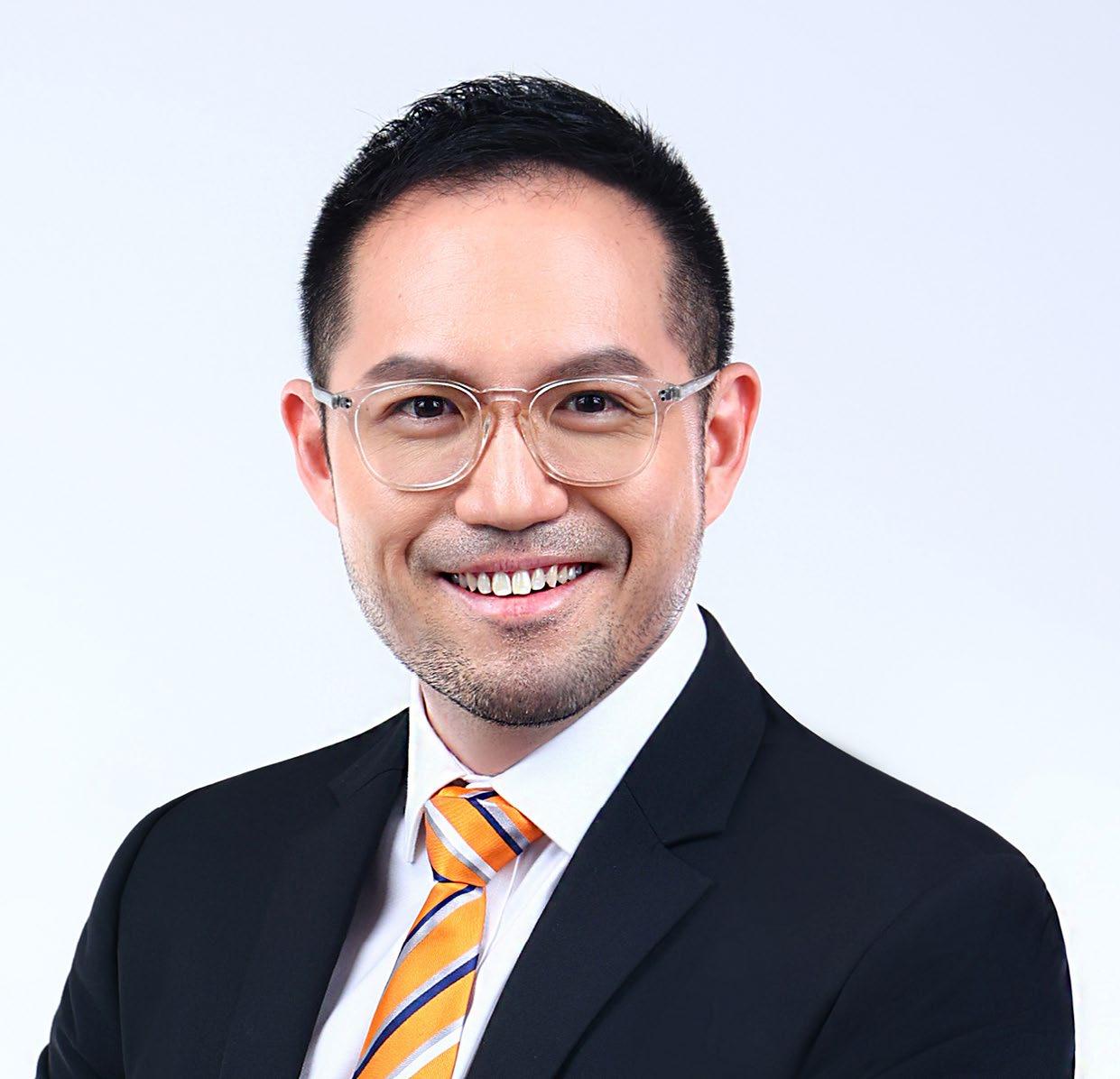
Justin Quek, OrangeTee CEO
24 SINGAPORE BUSINESS REVIEW | Q2 2024
COMMERCIAL PROPERTY | by Noreen Jazul
Why Tim Hortons vies for top spot in Singapore's 'third place' Western coffee scene
Capturing this market is better than competing directly with kopitiams and grab-and-go concepts.
For Tim Hortons, dominating ‘third place’ in Singapore’s Western coffee market scene is its main strategy to compete against local coffee brands and grab-and-go models with cheaper options
“Third places,” as described by sociologist Ray Oldenburg, are locations that facilitate social interaction, usually a public place people frequent. This often refers to places where people spend time aside from their homes (first place) or work (second place). Coffee shops and cafes with relaxed atmospheres are often called third-place locations.
Tim Hortons Singapore CEO Vaibhav Punj said that capturing this market is better than competing directly with kopitiams, new age cafes and coffee roasters, and a recent spike of grab-and-go coffee concepts who just entered the market.
“The size of the piece is quite big as well. We think we can build a very successful business in Singapore,” Punj said.
“Singapore is an interesting market. There are three very clear markets, the Central Business District (CBD), the heartland malls, and the tourist-specific malls like Sentosa and Orchard. We are looking at all these clusters and we intend to open 10 to 15 restaurants going forward,” Punj said.
He added that having a restaurant footprint is important for Tim Hortons because around 70% of their revenue comes from in-store sales, compared to takeaway and delivery which accounts for around 25%-30%.
“We will continue to look at locations, which are the right size for us. We are not planning to open really massive restaurants at this point in time, because I think that’s something which is not viable anymore. People are not utilising all that space,” Punj said.
Tim Hortons has, so far, opened in VivoCity. They also plan to open branches in NEX, Suntec City, One Raffles Place, and Jurong Point. Punj said Tim Hortons’ entry into Singapore will serve as a “stepping stone” for the brand to get into neighbouring countries like Indonesia and Malaysia which are also bigger markets.
"Given that [Singapore] is a regional hub, we are trying to create an HQ in Singapore to be able to manage the markets which are around Singapore,” he said.
Healthier products, unique offerings
Singapore, where diabetes is a serious health concern and interest in healthy diets is growing, Tim Hortons is strategically positioning itself to stand out in the crowded coffee market by tweaking its menu items to ensure it fits Singapore's Nutri-Grade guidelines.
The Ministry of Health (MOH) announced that beginning 30 December 2023, freshly prepared beverages must be graded based on their sugar and saturated fat content.
“The whole idea is to give options to people to choose whether they want something less sweet, or more sweet,” Punj shared with Singapore Business Review.

Tim Hortons had also made an effort to cater to the preferred flavor profiles of Singaporean consumers by lowering the sweetness levels of their products.
“In general, the sweetness levels [of our products in Singapore] are lower than some of what our other Asian markets and even Western markets can take,” Punj said.
Tim Hortons’ commitment to cater to health-conscious Singaporeans extends beyond just reducing sugar levels or offering nutri-grade products, according to the CEO.
The Canadian coffeehouse and restaurant chain is also working with its suppliers to create products that have ingredients that are free of artificial flavours and preservatives.
We are not planning to open really massive restaurants at this point in time, because I think that's something which is not viable anymore
“[We want to have] more clean label products coming into the restaurants. It’s a hard thing to do, but this is something which we are working with our suppliers extremely closely,” Punj told the publication.
Recognising Singapore’s strong dedication to environmental sustainability, Tim Hortons is broadening its focus beyond just offering healthier options. Punj said Tim Hortons uses sustainable packaging materials and even uses sustainable palm oil in their kitchen.
“In every single aspect of the restaurant, there is a sustainability piece to that,” Punj said.
SINGAPORE BUSINESS REVIEW | Q2 2024 25 CEO INTERVIEW
FOOD & BEVERAGE
Vaibhav Punj, Tim Hortons Singapore CEO
INDUSTRY INSIGHT: SELF-STORAGE
Strategic locations and value-added services drive growth in self-storage sector
In Singapore, StorHub has introduced online booking for storage spaces of various sizes.

Singapore's self-storage industry, with a yield of about 6.6%, is attracting more investors and companies due to its profitability. As the market becomes increasingly saturated, experts emphasise the importance of providing value-added services and amenities within their facilities.
These value-added services can include packing supplies for purchase, complimentary usage of trolleys, and the option to utilise third-party moving services, said Peter Guevarra, Director of Research Consultancy for Asia Pacific at global real estate firm JLL.
On types of amenities that selfstorage players can offer, Guevarra suggested meeting rooms, dedicated workspaces, pantry areas, and communal breakout spaces to packing stations and even bookable photography and livestreaming studios.
Industry player StorHub has introduced an online portal as a way to differentiate itself from other self storage businesses in Singapore.
“A lot of people have gotten more used to buying things online. So what helps us stand out above our competition in Singapore is that we’ve introduced, just recently, our online portal where you can book
These selfstorage facilities are strategically placed near residential areas and businesses, with easy customer access and are close to public transportation options
storage online,” Luigi La Tona, Group Director of Operations of StorHub, told Singapore Business Review.
Flexibility
Apart from offering an online booking option, StorHub also captures customers by offering 24/7 access and flexibility from storage terms to the sizes of their spaces.
La Tona said some of their customers want to rent storage spaces in central locations like Toa Payoh and Kallang, but cannot necessarily afford the price for the particular size they want as these places tend to have a higher price point.

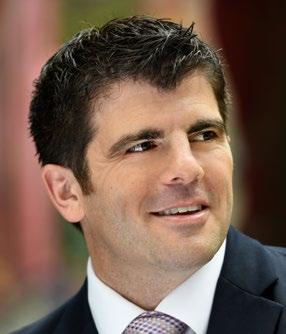
But since StorHub’s storage units are up to 3.5 metres high, La Tona said the company can offer smaller units in central locations which still fit the needs of their customers.
“You can take advantage of the high vertical spaces; you can stack your boxes. You can get into our most central properties for great value if you just organise the storage a bit more,” La Tona said.
La Tona shared that StorHub also has spaces designed for specific customers like, for example, wine collectors. It has a wine facility under the brand, Winebanc.
At present, it operates three Winebanc facilities located in Delta
House, Toa Payoh, and Kallang.
There are over 500 wine cellars and lockers across all three Winebanc facilities in Singapore. Over 95% of the Winebanc units are filled.
StorHub's Winebanc
Apart from wine storage, there’s StorHub Lifestyle which offers a premium and secure self-storage space equipped with a digital locking system designed with passionate small business owners, collectors and avid hobbyists in mind.
“It has greater lighting and a better feel. It’s got a communal lounge in there and we also have a smart entry system as well. StorHub Lifestyle offers a podcast room where people can do live streaming. That’s what Lifestyle was designed for, for those people who focus on building their collections and growing their small businesses,” La Tona said.
Guevarra underscored that offering different unit types, including non-air-conditioned units and air-conditioned units for specialised needs like wine storage, is important to have as a player in the self-storage industry in Singapore.
Units must likewise be available in various sizes and offered at different monthly rates to accommodate different storage needs and budgets, he said.
In StorHub, a 60-square-foot space will cost around $320 (US $236) per month. The smallest space StorHub rents out is four square feet.
Knowing your customer
When entering the self-storage industry, Guevarra said entrants or investors also need to evaluate potential locations.
“The majority of the selfstorage facilities in Singapore are concentrated in the Central Planning Region. These selfstorage facilities are strategically placed near residential areas and businesses, with easy customer access and are close to public transportation options,” he added.
26 SINGAPORE BUSINESS REVIEW | Q2 2024
StorHub offers smaller units in central locations at a more affordable price point (Photo from StorHub)
COMMERCIAL PROPERTY
Peter Guevarra
Luigi La Tona

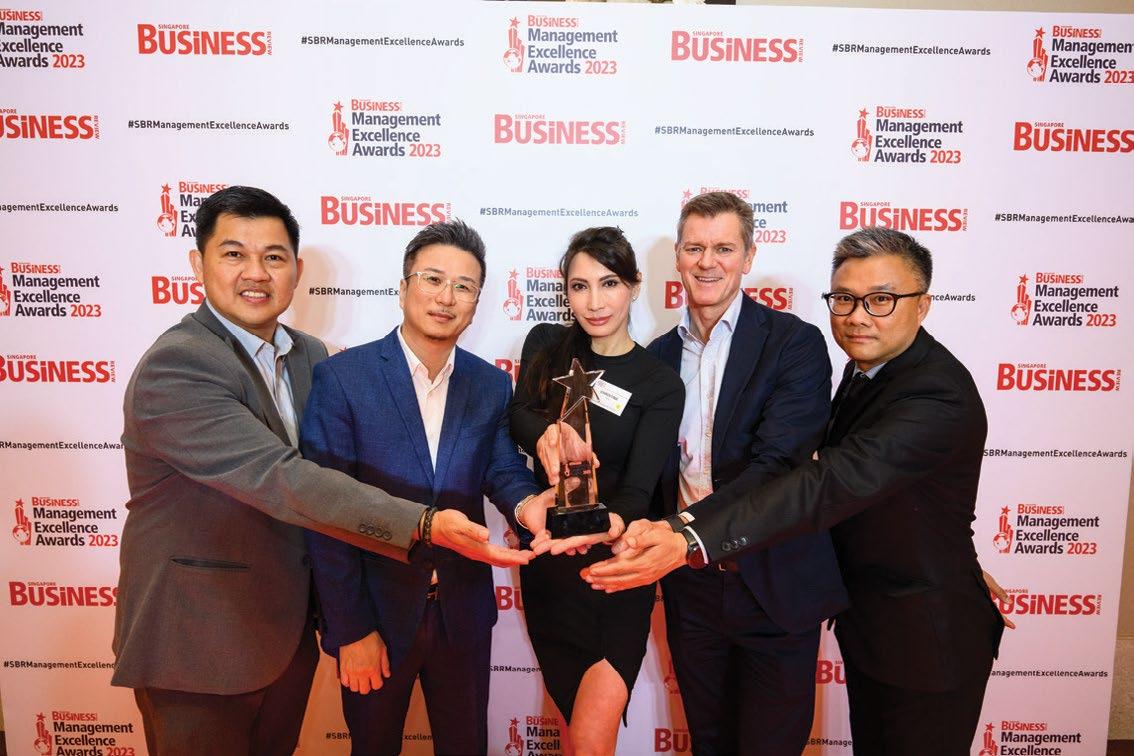

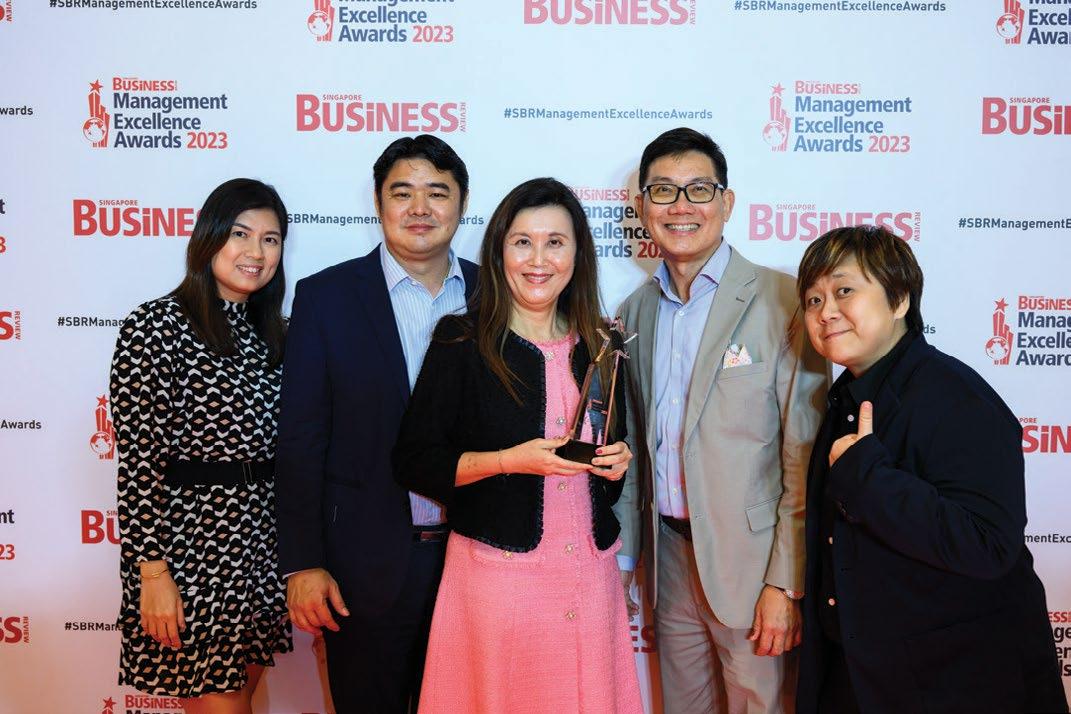



Venture capitalists sharpen focus on targeting startups’ profit paths
Deal activity in Asia Pacific fell 26.3% YoY in 2023, reflecting VC firms' caution.
Merely having a unique product is insufficient for securing funding from cautious venture capital (VC) firms, who now prioritise investments in startups with a clear return profile.
“What is your growth path to profitability?” is now the question that VC firms pose, said Stephen Bates, partner and head of Deal Advisory at KPMG in Singapore.
The decline in VC deals in 2023 mirrors the caution exhibited by investors. Data from GlobalData showed that last year, VC deals in Asia-Pacific fell 26.3%.
In 4Q23, the Asia-Pacific region also experienced a slump, with investment falling to US$18.8b, which according to KPMG is the lowest level since 1Q17.
“VCs that have invested in the past are a little bit more cautious around the companies that they are investing into. They are acutely conscious of making sure that the performance of these companies is tracking towards their plans in a relatively difficult economic environment which we're still facing,” Bates said.
“They don't want to have a fund that doesn't return to the original investors. They're very cautious around making sure that within the fund investments that they've made, that there is a return profile that supports the original investment from those LPs (limited partners),” Bates added.
Aurojyoti Bose, lead analyst at GlobalData, shared a similar observation, saying that investors are look at whether a startup is able to generate profitability or not. “They’re definitely going to look for return on investments,” Bose added.
Surge in deal opportunities
Whilst 2023 was a “concerning year” for the VC market, Bates is “cautiously optimistic” about 2024, especially in the second half of 2024 when he expects a surge in deal opportunities, noting that years after a “bad year” are always “exceptionally good”, especially as we are starting to see a
They don't want to have a fund that doesn't return to the original investors

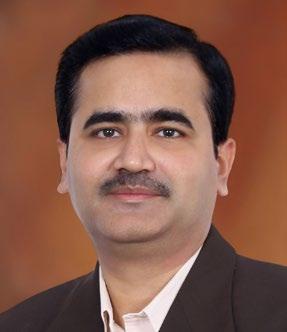
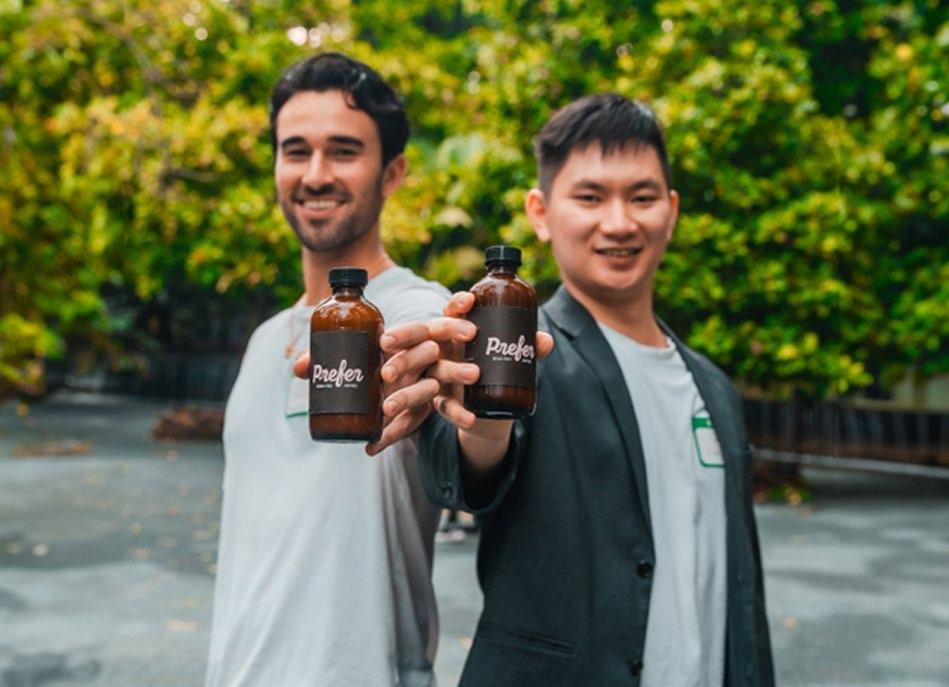
stabilisation of interest rates and inflation. “There's a lot of investors across VCs and or private equity that have a lot of dry powder invested investable money, and they're really looking for that next generation of investments,” Bates said.
“I am quite bullish on the VC community. I think there have been areas in which the VCs have invested into their portfolio companies. They're working very hard to turn them into profitable companies as early as possible, because, in their next stage, there's a lot more focus on profitability and that's ultimately causing a longer timeframe in which VCs are holding on to these companies,” he added.
Series B and C funding
Data from Enterprise Singapore supports Bates’ statement. According to the agency, early-stage deals accounted for about 95% of the deal volume and 53% of the deal value in Singapore in 9M23.
In 2024, Bates is seeing a “plethora of opportunities” for VCs in Series B rounds in Singapore given the country’s innovation environment. Startups starting their Series B must ensure that they have audited financial, robust forecasts, as well as good corporate governance to attract VCs and investors alike.
“The investor community has become far more professionalised in the approach to investing in Series B and beyond,” Bates said. Startups building towards their Series B must ensure that they have audited financial, robust forecasts, as well as good corporate governance to attract VCs and investors alike.
He added that startups in the Series B level of funding must ensure that capital they are raising will be sufficient enough not just for two years, but for at least three.
“That's really to give financial stability to the company and ensure that they have a pathway to profitability through that period,” he said.
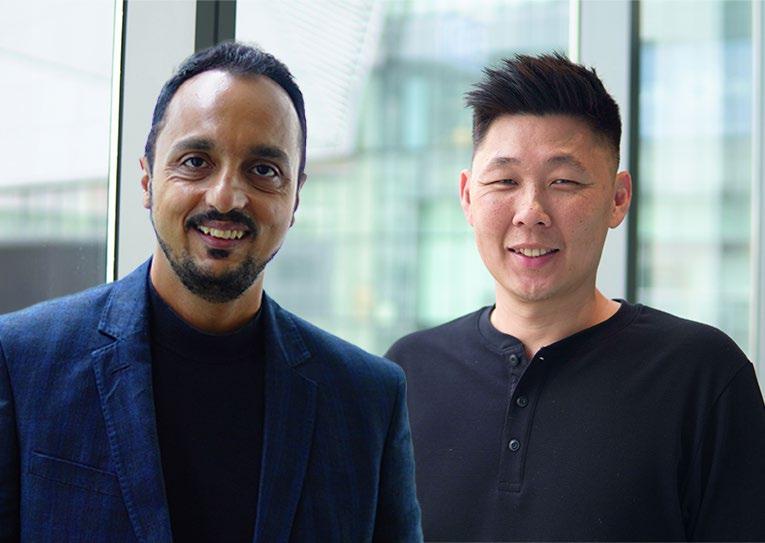
28 SINGAPORE BUSINESS REVIEW | Q2 2024 FINANCIAL INSIGHT: VENTURE CAPITAL
SUPPLIER
PREFER)
AUDAX
DEAL #1: STARTUPS FOR FOOD AGRICULTURE WILL BE A ROBUST AREA FOR INVESTMENT, SUCH AS BEAN-FREE COFFEE
PREFER (PHOTO FROM
DEAL #2: FINTECHS ARE A NO-GO GIVEN THE SATURATED MARKET, EXCEPT FOR THOSE FOCUSED ON ADDRESSING CLAIMS OR FACILITATING ONBOARDING LIKE
MARKETS & INVESTING | by Noreen Jazul
Aurojyoti Bose
Stephen Bates

YOUR WORKSPACE EXPERIENCE APP
CapitaStar@Work is CapitaLand’s Workspace Experience App that aims to deliver an elevated and integrated user experience to CapitaLand’s Workspace Tenants and Properties.




Discover A Suite Of Features. All In One App.
Contactless Access
Enrol and gain access through facial recognition, dynamic QR code or mobile credentials
Space Booking
Browse and book meeting room and event spaces for your business needs

Visitor Invitation
Grant visitors QR code access to turnstiles conveniently
Community Events
Stay updated and sign up for the latest events and happenings in your property
Digital Solutions
Integrate your office systems with building systems seamlessly through readily available APIs







@Work
Sustainability and biomedical startups draw investors and founder focus
A nine-month study in 2023 showed green tech investments totalling $268.5m (US$201m).

As the deadline for achieving net zero approaches, investors and entrepreneurs in Singapore are intensifying their focus on innovations addressing environmental challenges, as evidenced by the increase in green tech investments in 2023 — a trend expected to persist into 2024.
“The sustainability sector likely saw the most number of startups being created in 2023. It was also the sector that had fewer challenges fundraising as it was aligned with several major global trends,” HsienHui Tong, executive director for investment at SGInnovate, told the Singapore Business Review
“In the coming year, we expect to see continued interest in the sustainability space,” Tong added.
The heightened emphasis on sustainability is reflected in this year's Hottest Startups list, which prominently features a slew of enterprises dedicated to addressing ecological concerns. Leading the charge in the annual list are Muuse, Incy Tech, Infinity Cube, and Prefer, each contributing innovative solutions to environmental issues.
EnterpriseSG reported that green tech deals have “consequently more than doubled since 2022.” In September 2023, volumes of green
This surge reflects a growing societal urgency and investor interest in addressing pressing climate challenges through technological solutions

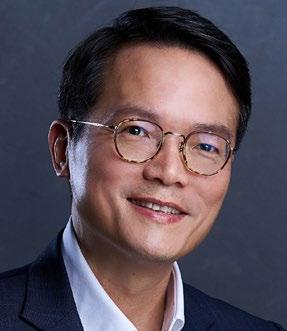
tech investments rose to 20 and had a total value of $268.5m (US$201m).
“We see traction for green tech enterprises with hardware capabilities in renewable energy, waste management, and battery services attracting investments,” EnterpriseSG in its “Singapore Venture Funding Landscape 2023: A Nine-Month Study” report.
The trend has also been observed in Asia-Pacific. “There has also been growing emphasis on sustainability and environmental concerns leading to the emergence of startups pioneering initiatives such as green technology, renewable energy, waste management, sustainable agriculture and new biodegradable materials,” Dr. PohHui Chia, associate director at Vickers Venture Partners, told the magazine.
Climate tech witnessed a significant upswing in investment, recording $10.15b (US$7.6b) in funding in 3Q23, is a testament to the demand for startups targeting sustainability challenges in the region.
“This surge reflects a growing societal urgency and investor interest in addressing pressing climate challenges through technological solutions. The record-high funding underscores the importance placed on sustainability and environmental
resilience in contemporary investment strategies,” Chia said.
Chia reiterated that inventors are increasingly paying attention to startups that demonstrate a tangible social or environmental impact alongside robust financial performance.
“This signals a broader recognition within the investment community of the importance of sustainability and societal value creation. As such, startups with innovative solutions addressing pressing social or environmental challenges are likely to attract increased attention and support from investors,” Chia said.
“Sustainability and green technology is an area where entrepreneurs can develop innovative products and services focused on renewable energy, energy efficiency, waste management, sustainable agriculture, and circular economy practices. By incorporating sustainability and social responsibility into their business models, entrepreneurs can appeal to conscientious consumers and investors alike,” he added.
Emphasis on healthcare
Apart from climate sectors, Wesley Tay, principal at East Ventures said he is also seeing significant opportunities in the healthcare sectors.
“We are embarking on more initiatives in these areas,” Tan shared.
Representing the healthcare sector in this year’s Hottest Startups is Mito Health, founded by Kenneth Lou.
In 9M23, the value of healthcare investments in Singapore reached $221.75m (US$166m), whilst healthcare investment hit $390m (US$292m). The figures, however, are lower than their respective 2022 record.
“Startups in sectors such as healthcare and agritech continue to face challenges in fundraising, and a good number of them were struck off in 2023,” Hsien-Hui shared.
The expert, however, remains positive about the outlook of the
COVER STORY 30 SINGAPORE BUSINESS REVIEW | Q2 2024
The sustainability sector likely saw the most number of startups being created in 2023
MARKETS & INVESTING | by Noreen Jazul
Hsien-Hui Tong
PohHui Chia
healthcare sector, particularly the biomedical space.
“[We expect] renewed interest in biomedical startups as more promising technologies get spun out of our universities and research institutes,” Tong said.
“We believe that groundbreaking developments in quantum technology will lead to greater investor interest in startups in this sector,” he added.
Chia shared a similar sentiment saying that healthcare and biotech are set for considerable growth in Asia-Pacific, projecting investors to surge in areas such as telehealth, personalised medicine, and AIpowered diagnostics.
“The ongoing emphasis on accessible and efficient healthcare solutions, coupled with advancements in technology, creates fertile ground for startups aiming to revolutionise the healthcare industry and improve patient outcomes,” Chia said.
Fintech remains a staple
The emergence of new investment opportunities in other sectors does not diminish the appeal of fintech startups in Singapore, although data from Tracxn showed that the number of fintech companies founded in Singapore last year fell 68.16% YoY to 71.
“Fintech will remain a staple for investors,” commented Hsien-Hui. The SGInnovate expert, however, warned that “most investors are subtly instructing their founders to sacrifice market growth for profitability.”
“Startups are going to have to navigate a new normal where the days of easy money to acquire new customers at the expense of fiscal
prudence may well be past,” he said.
“At the same time, this represents a big opportunity for startups that are targeting the B2B market in specialised areas such as custodian banking, where the outsourcing of certain high cost/low value services such as client interfacing may be handled by startups adopting sophisticated AI systems. Identifying such niches within the fintech space can be highly lucrative for startups, as there are fewer competitors. Such solutions may also be cheaper to build and run compared with a fintech hoping to offer a full suite of banking services to consumers,” he added.
Amongst the financial services startups that have achieved success in specialised areas of the industry are Libeara and Audax, both of which are also featured on this year's Hottest Startups list.
Data from KPMG showed that in 2H23, fintech funding in Singapore more than halved, declining 68% year-over-year (YoY). For the whole of 2023, Singapore fintechs raised $1.47b (US$1.1b) in funding from 85 rounds, dropping 67.01% YoY.
The funding decline in Singapore’s fintech sector, however, is in line with the funding drop which happened globally, said Neha Singh, chairperson and managing director of research platform Tracxn.
In 2024, however, Singh said many investors are expecting an improvement in the fintech space. With expected better performance, Singh believes subsegments like payments, particularly crossborder payments will gain more interest this year.

Days of excess are over, investors warn founders
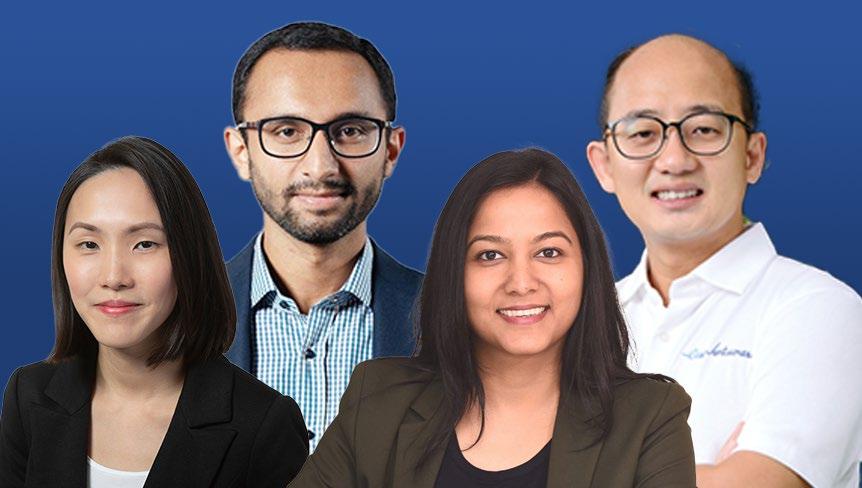
At a time of decreased capital deployment and lower valuations, experts stressed the importance of capital efficiency for startup funding success.
“The days of excess are over. The bar is certainly higher now for founders,” Brinc’s head of Portfolio Management based in Singapore, Milan Thakkar, said.
Thakkar, however, said many investors still have dry powder and are looking for exceptional founders to back.
“You need to prove that you know how to appropriately allocate the capital invested. This is why we specifically look for resourceful founders that have accomplished impressive things despite facing financial and resourcing constraints,” Thakkar told Singapore Business Review
Neha Singh, chairperson and managing director of research platform Tracxn, shared a similar sentiment saying that the narrative of venture capitalists' interest have now centred around capital efficiency.
Apart from having a path to profitability, Singh said investors look at three things: how big the market is, how the team works, and how the project is executed.
“Some look at teams more than market, some of the other ones will say they look at markets more than team; but essentially they’re always looking at new waves which will create the next set of large companies,” Singh said.
“For instance, there was an internet wave, there was a SaaS wave. Now, obviously, there’s an AI [wave], which they feel that on the back of this, there will be a lot of large companies which will get created.”
For East Ventures, the investment strategy has always been based on 2Ps: People and Potential market.
“We look for strong founders and companies that help to solve large problem statements in a large addressable market. Meanwhile, for the growth-stage companies, we also focus on their traction and ability to scale,” Wesley Tay, principal at East Ventures, said.
“We invest in good companies in both the early and growth stages. Focus on your core strength and provide the solutions that can be the painkiller to the pain points of society,” Tay said he had told founders.
Vickers Ventures implements a similar approach, investing in startups that have seen “early product-market fit and are in the process of scaling.”
“For healthcare or biotech investments, we invest when lead programs are finishing pre-clinical studies or have initial human data. We mostly lead in Series A investment rounds,” PohHui Chia, associate director at Vickers Venture Partners, shared with Singapore Business Review.
COVER STORY SINGAPORE BUSINESS REVIEW | Q2 2024 31
global funding activity (VC, PE and M&A) in fintech 2020–2023*
Total
Source: Pulse of Fintech H2'23, Global Analysis of funding in Fintech, KPMG International (data provided by PitchBook), *as of 31 December 2023.
Asian banks plan to launch digital currency and digital banks in Q1 2022
The 2024 Hottest Startups list reflects the growing focus of investors and entrepreneurs on sustainability, with various sectors well represented and the AI domain not surprisingly taking up four slots in this year’s lineup. Apart from AI startups belonging to different sectors, financial services also took two places in the Top 20.
Transparently.AI
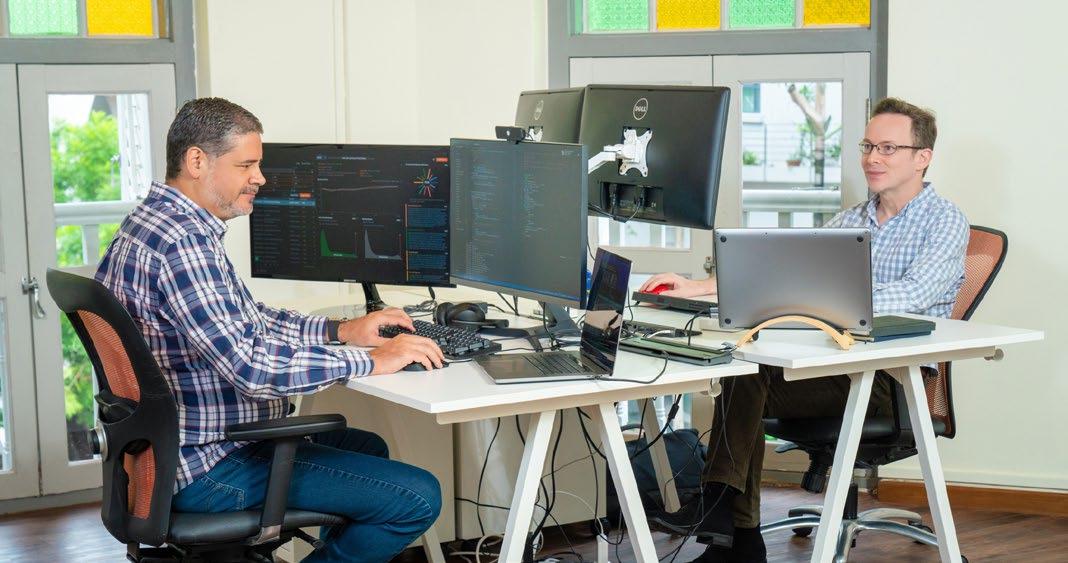
Founders: Hamish Macalister and Mauro Sauco
Funding: US$3.6m
Founding Year: 2021 (Feb)
Transparently.AI has created an AI system that detects accounting manipulation and fraud.It determines the likelihood of fraudulent activity or serious manipulation in a company's financial records, evaluates the risk of total corporate failure, estimates financial losses to stakeholders, tracks the evolution of such misconduct over time, and provides detailed analytics on the forms of manipulation or fraud, including specific areas of concern within the accounts and recommended investigative strategies. They secured investment from Franklin Templeton as part of their acceptance into the asset manager’s FinTech Incubator program.
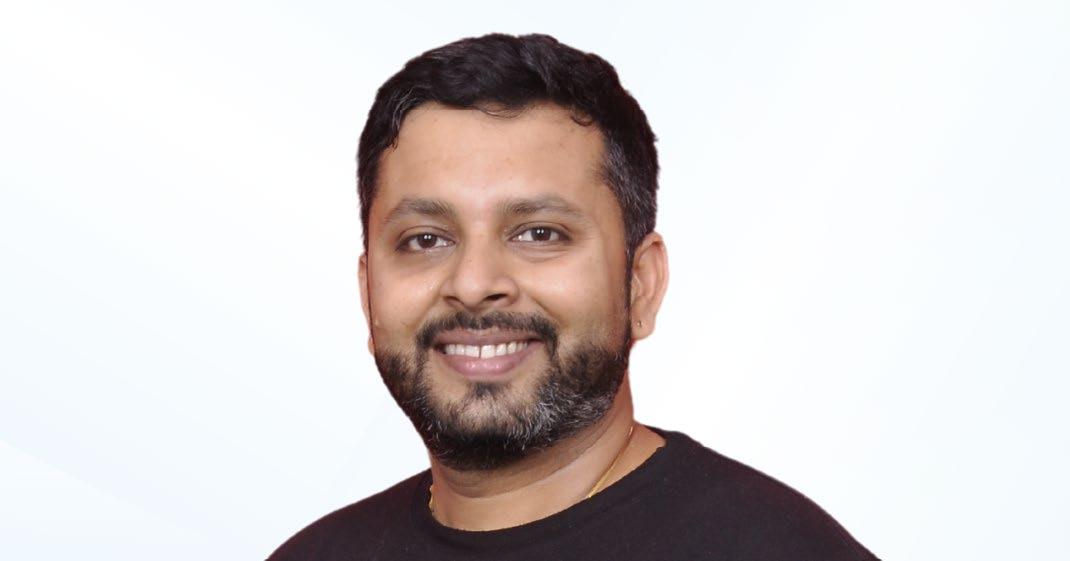
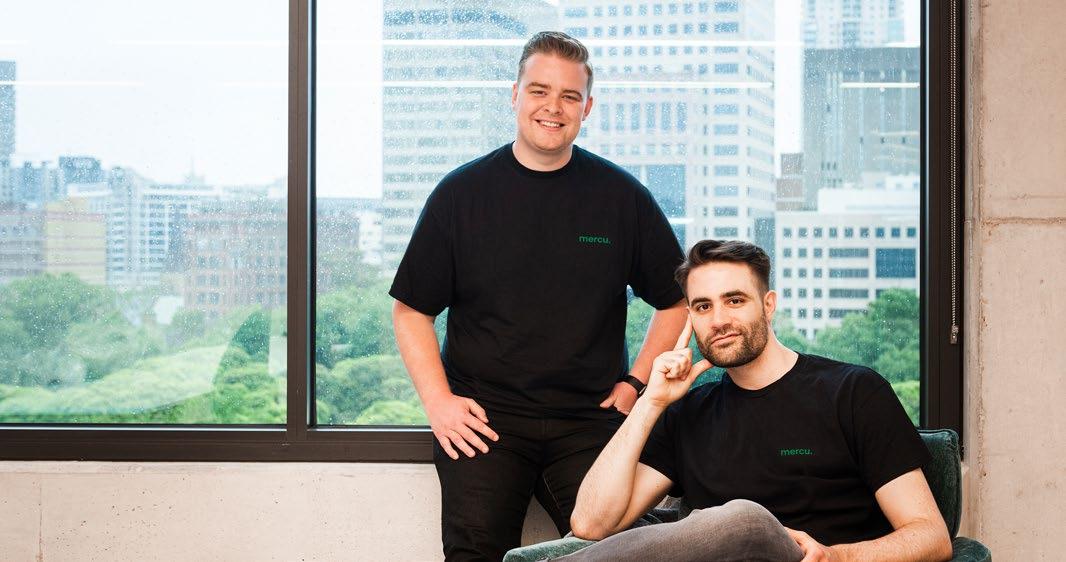
Founder/s: Jascha Zittel & Elliott Gibb
Total Funding: US$2.3M
Founding Year: 2021 (Mar)
Mercu is a groundbreaking platform designed to transform the hiring, training, and engagement of frontline workers in the restaurant, retail, and other deskless industries. Addressing the high turnover rates that cost businesses approximately US$8,000 per shift worker replacement, Mercu leverages widely-used chat apps like WhatsApp and Line to facilitate seamless communication and engagement between employers and employees. Clients like Guzman y Gomez experienced a reduction in candidate processing time from 45 to less than 15 minutes. Their investors include Sequoia Capital India, TEN13, 500 Global, Flying Fox Ventures, Archangel Ventures, and XA Network. Mercu
Zoth Writer Zen
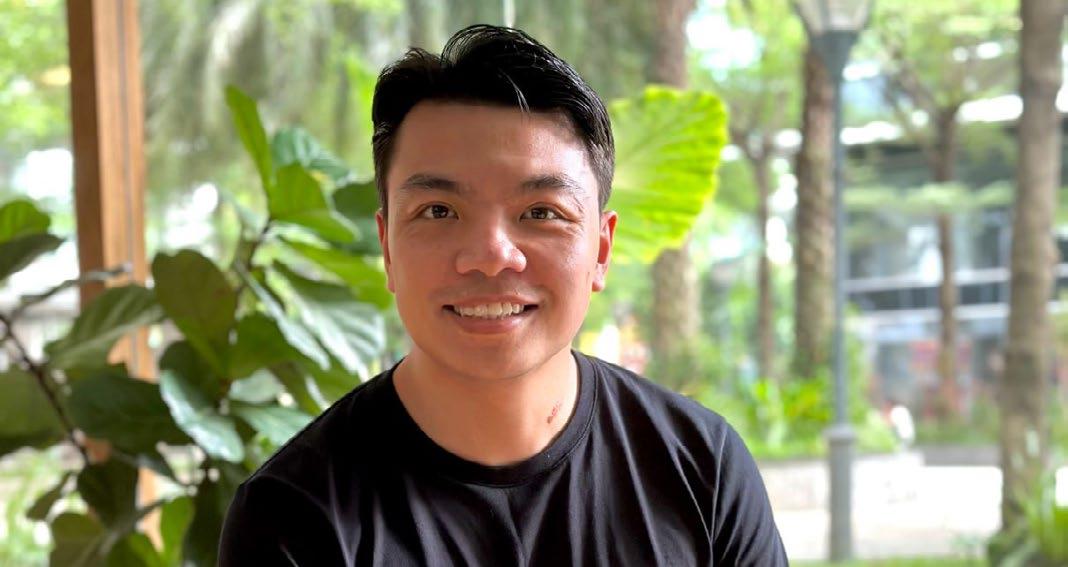
Founder/s: Pritam Dutta and Koushik Bhargav
Total Funding: US$2.5M
Founding Year: 2022 (Oct)
Zoth is breaking global barriers, facilitating free capital flow worldwide. This initiative fosters more open, transparent, and efficient access to finance. By connecting assets and liquidity across Traditional Finance and Onchain Finance, with blockchain technology at its core, Zoth promotes greater financial inclusion. Their investors include SOSV Orbit Startup, Blockchain Founders Fund, Orbit Startups, Momentum6, Borderless Capital, Mindfulness Capital, Yap Capital, Singularity DAO, Altzan Capital and GravityX.
Founder/s: Nguyen Manh Linh (English name: Daniel)
Total Funding: US$1.3m+
Founding Year: 2021 (Apr)
WriterZen is the pioneer content SEO toolset for content lifecycle. It is meticulously crafted to accommodate users of all SEO proficiency levels. According to a case study featured on their website, WriterZen facilitated an impressive 5x surge in traffic, a remarkable 75% uptick in signups, and a substantial 30% rise in conversions for a client. Notably, WriterZen spearheaded a remarkable 300% enhancement in SEO outcomes for clients while significantly reducing the time frame from 15 to 8 months. Noteworthy investors such as Wavemaker Partners have recognized the potential of WriterZen, contributing to its success in the seed funding round.
COVER STORY 32 SINGAPORE BUSINESS REVIEW | Q2 2024
Silicon Box

Founder/s: Dr. Byung Joon (BJ) Han, Dr. Sehat Sutardja, Weili Dai
Total Funding: US$410M
Founding Year: 2021 (May)
Silicon Box is pioneering the future of semiconductor manufacturing with its groundbreaking sub-5-micron chiplet integration technology which significantly accelerates the design cycle of chiplets, slashing the cost of producing new devices by up to 90%. By employing the world's first standardised large-format production method for advanced packaging, Silicon Box enables the shortest interconnections and high performance integration at low cost. This approach not only boosts electrical performance by over 50% but also reduces power consumption by more than 40%. Their recent investment in Nord Italia will introduce Europe to a pioneering end-to-end chiplet-based semiconductor system integration and first of a kind packaging capacity.

Founder/s: Harry Conor Lucas and Sudharshan Raman
Total Funding: Undisclosed
Founding Year: 2021 (Nov)
Phasio, a Singapore-based SaaS company, provides a Customer Collaboration Workspace to regional industrial manufacturers that empowers them to develop and deliver more products to their clients. The platform helps industrial manufacturers to grow their web presence, automate and optimise internal processes like quoting, and ensure that their production process remains compliant with industry standards. With customers across Asia, Oceania, Europe and the United States and a rapidly growing user-base, Phasio raised a 2.5M USD Seed round from Airtree Ventures and 500 Global in 2023.
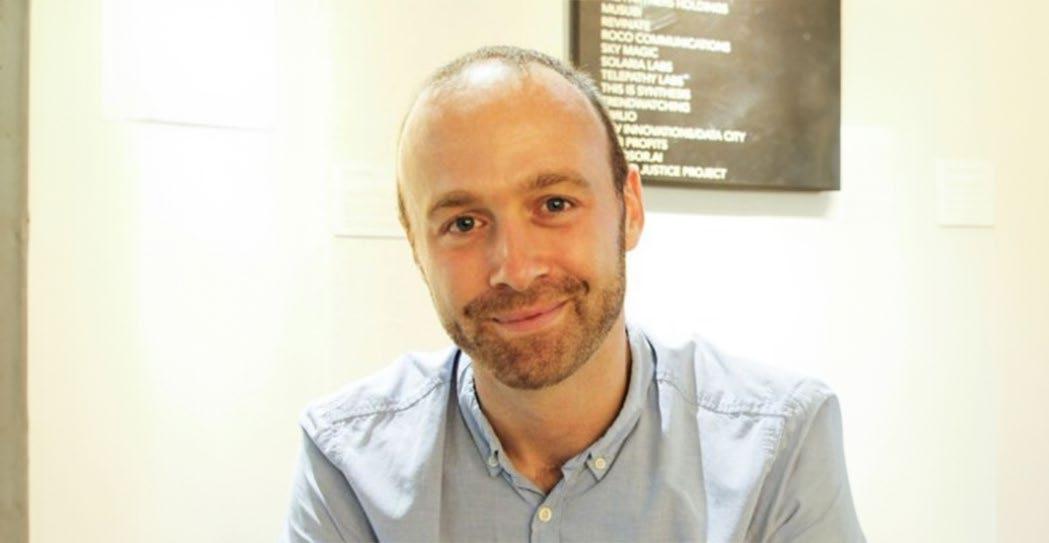
Founder/s: Jonathan Tostevin, Brittany Gamez
Total Funding: $US1m
Founding Year: 2021 (Oct)
Muuse, short for 'multiple use', is a Reuse as a Service (RaaS) platform that aims to eliminate single-use waste through trusted, data-driven reuse systems. So far, Muuse has diverted over 250,000 single-use items from landfill and contributed to significant reduction of carbon emissions by partnering with large-scale events and festivals, projects with corporates and universities, and cafe networks across Asia and North America. With its headquarters in Singapore’s ever-growing tech landscape, Muuse provides a flexible, traceable, software platform to allow MNCs and municipal authorities to build and scale their own reuse systems - making reuse the norm, not the alternative.

Founder/s: Daan van Rossum, Jonah Levey, Greg Marschall
Total Funding: $US1m+
Founding Year: 2022 (Sep)
With the goal of creating a happier future of work, FlexOS delivers research reports, expert interviews, and comprehensive software buying guides to empower peoplecentric leaders to take charge of their organisations amidst major disruptions like AI and remote work. One of their general partners, Do Ventures, regards FlexOS as a “high potential team with extensive industry knowledge and a great passion for creating the ideal employee experience in the new era of work.”
COVER STORY SINGAPORE BUSINESS REVIEW | Q2 2024 33
Muuse, Ltd.
Phasio FlexOS
Goodgang Labs
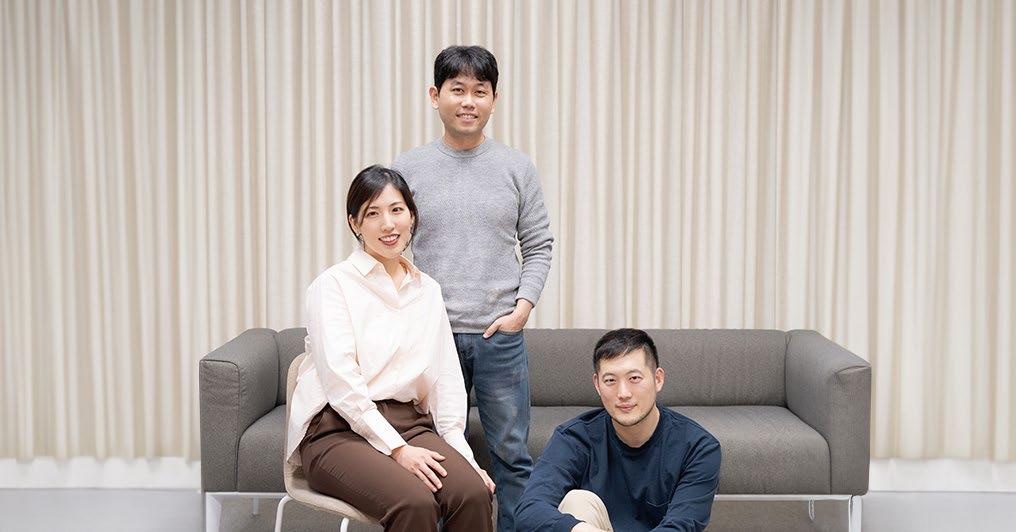
Founder/s: Dookyung Ahn (CEO), Jaecheol Kim (CTO), Seoyoung Kim (CCO, Chief Creative Officer)
Total Funding: US$3.6M+
Founding Year: 2022 (Jan)
GoodGang Labs’ avatar-based social platform blends human personalities with AI, creating a unique, engaging user experience. The platform is designed to forge human-AI personas by leveraging Real-Time Text to Speech and Motion Avatar technology. This groundbreaking approach leverages cutting-edge AI technology, making digital interactions more relatable and immersive. GoodGang Labs' platform stands out by enabling users to express themselves through 3D avatars that learn from their human counterparts, creating a seamless blend of human intuition and AI intelligence. Kakao Investment contributed to their funding last year, believing in their new ways of online self-expression.

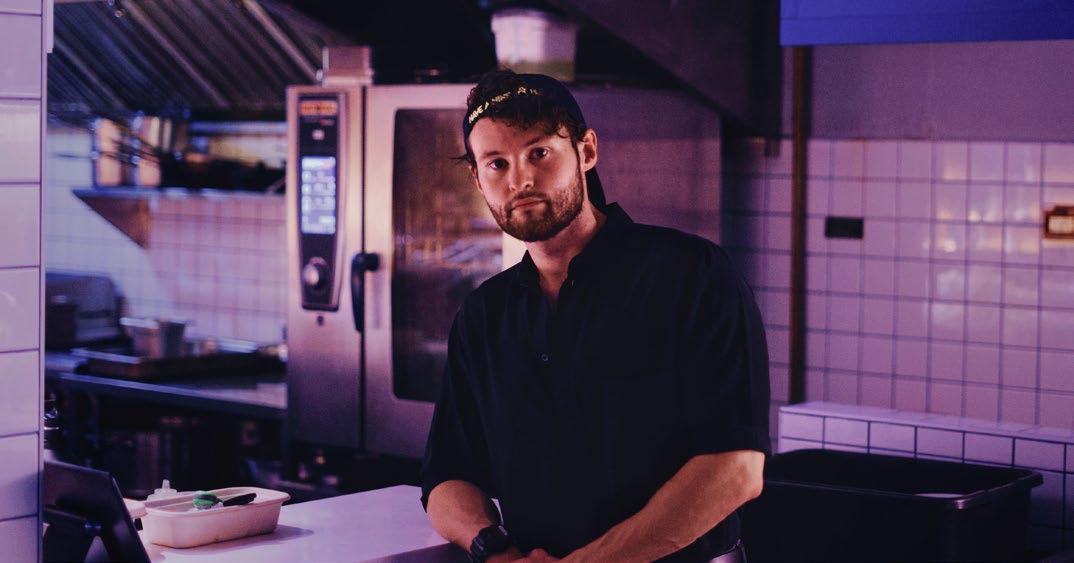
Founder/s: Christopher Withers
Total Funding: $8M
Founding Year: 2022 (Jan)
Singapore-based Klikit is a venture dedicated to empowering restaurants amidst the growing e-commerce industry for food. The venture offers first-of-its-kind 'all-in-one' technology for restaurants to promote efficiency when managing all kinds of orders, be it in-store, delivery or pickup. Backed by Global Founders Capital, Wavemaker Partners, Gentree and more, Klikit has helped restaurants process millions of transactions, amassing these across thousands of brands and businesses in APAC.
Civils.ai Incy Tech
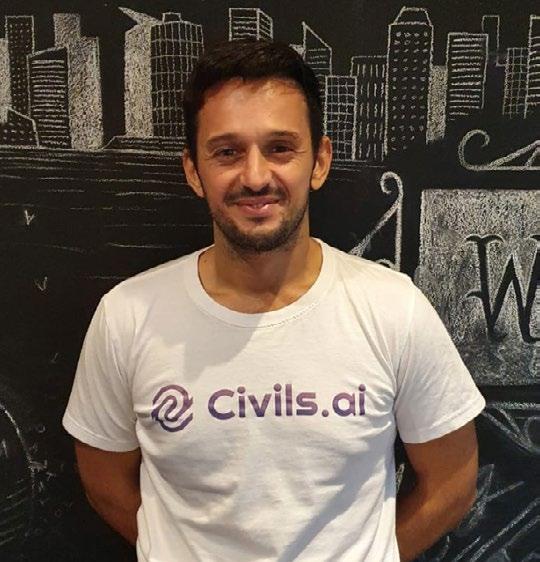
Founder/s: Stevan Lukic, Mirko Vairo
Total Funding: US$300k
Founding Year: 2022 (May)
Civils.ai is a web platform that is committed to providing seamless solutions for construction work. Civils.ai equips users, including project managers, engineers, architects, and geologists with the relevant tools to work efficiently and to boost productivity. The platform specialises in geotechnical engineering, structural engineering, tunnel engineering, temporary works, and construction data, and is currently backed by Antler and Iterative, two of the world’s leading software investors.

Founder/s: Sparsh and Shivansh Anand
Total Funding: Undisclosed
Founding Year: 2022 (May)
Incy tech's main product is the thermal floater. By harnessing the sun's thermal heat, it floats on water bodies to generate electricity economically, democratising renewable energy access. Its modular design allows easy scalability for various applications, making it cost-effective for remote areas and research bases. Incy tech’s main objective is to reduce nonrenewable energy dependency that will both benefit the environment and human health. These young entrepreneurs have been self-funding and bootstrapping their research and development efforts from personal resources. They are excited about the progress made so far and eagerly anticipate potential opportunities for growth and collaboration in the future.
COVER STORY 34 SINGAPORE BUSINESS REVIEW | Q2 2024
Klikit
Dozer
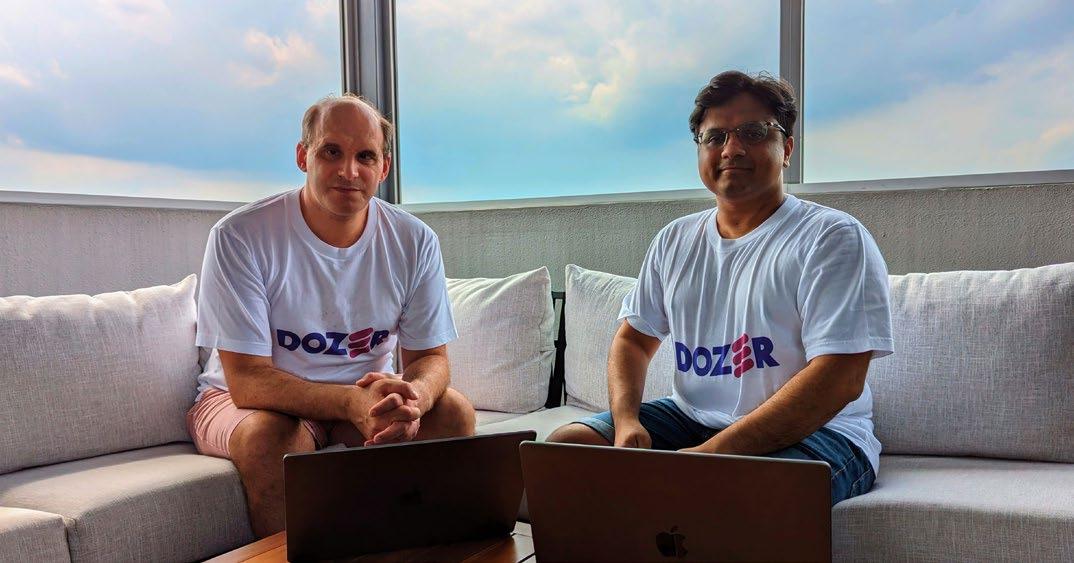
Founder/s: Vivek Gudapuri and Matteo Pelati
Total Funding: US$3M
Founding Year: 2022 (Jul)
The startup offers instant real-time data integration allowing engineers to build personalised customer-facing data and AI products. Dozer’s technology allows for unlocking the value of data by offloading various application databases and data silos to build low latency data APIs. Dozer bridges the gap between AI and data world by automatically constructing the semantics to be easily integrated into LLM applications. Dozer boasts superior performance compared to its competitors, providing a robust and efficient solution for businesses in need of rapid development cycles for their data applications. Their investors include Peak XV's Surge, Gradient Ventures, and January Capital.
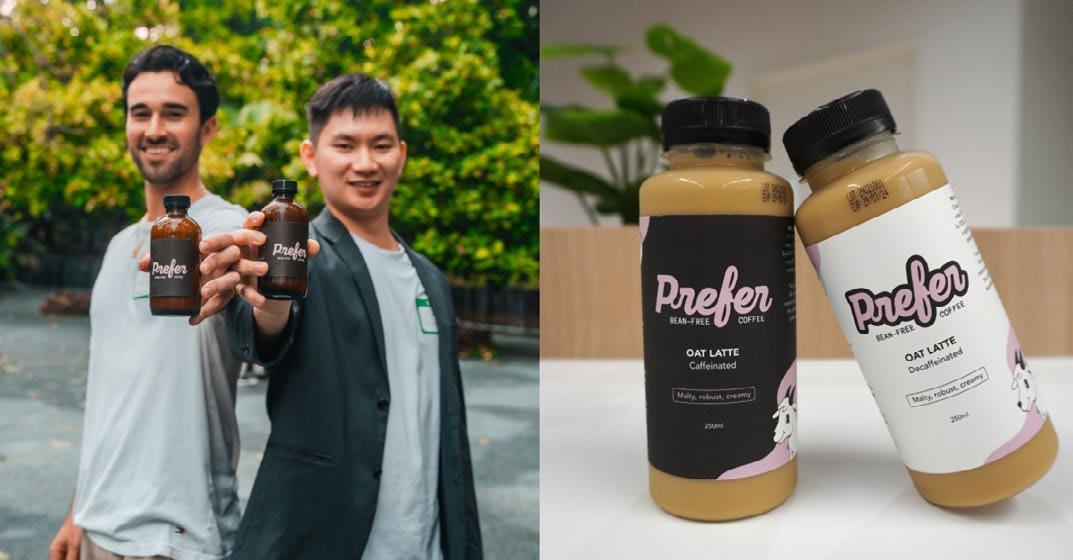
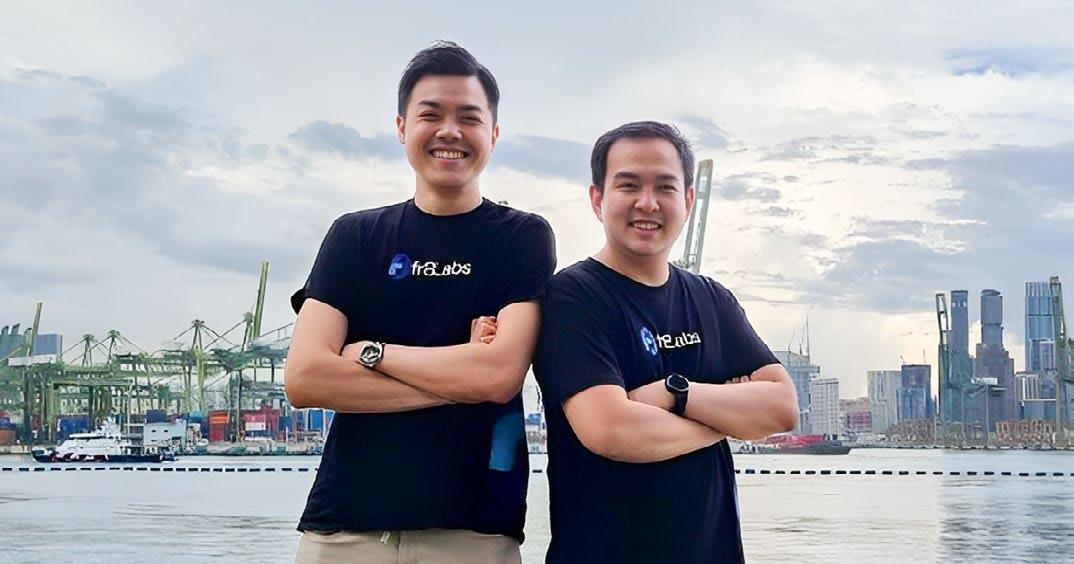
Founder/s: Glenn Lai, Felix Lu, Steve Patuwo
Total Funding: US$1.5M
Founding Year: 2022 (Jul)
Fr8Labs aims to simplify the complex logistics landscape by providing a next-generation AI-enabled platform that consolidates information in one system which manages and tracks shipments with access to both freight forwarders and customers, allowing streamlined processes, reduced costs and an overall enhanced shipment experience. Fr8Labs now seeks to scale up the digitalisation of Asia’s logistics industry. Fr8Labs investors include East Ventures, FEBE Ventures, Kaya Founders, Seedstars, and Venturra, among others. Fr8Labs Prefer

Founder/s: Jake Berber and Ding Jie Tan
Total Funding: US$2M
Founding Year: 2022 (Nov)
Prefer makes coffee without coffee beans to future-proof coffee from the threat of climate change. Their fermentation technology creates coffee flavours from byproducts of food production. They distribute coffee grounds, bottled lattes, and cold-brew concentrate B2B. Prefer's mission is to ensure coffee is delicious, accessible, and sustainable forever. Earlier this year, Prefer secured a $2M seed round from investors including Forge Ventures, 500 Global, Pickup Coffee, and more to grow in Asia. Investors like 500 Global see the potential, noting, "Prefer's innovative fermentation tech is paving the way to recreate our favourite flavours, starting with coffee."
Founder/s: Guillaume Luccisano
Total Funding: US$3.8m
Founding Year: Early 2023
Yuma, developed by Silicon Valley veterans, debuted alongside ChatGPT. They are dedicated to AI integration for Shopify merchants to enhance customer service. Yuma fully embraces AI disruption, foreseeing a transformative shift in customer service within 1-2 years. Their mission is to equip merchants with cutting-edge AI tools while supporting agents in delivering exceptional service. Leveraging the latest AI breakthroughs, Yuma automates customer service for large Shopify merchants with Auto-Pilot agents capable of resolving support tickets and taking actions in external services for true automation. Their investors include Y Combinator, Pi Campus and Motier.
COVER STORY SINGAPORE BUSINESS REVIEW | Q2 2024 35
Yuma AI
Libeara
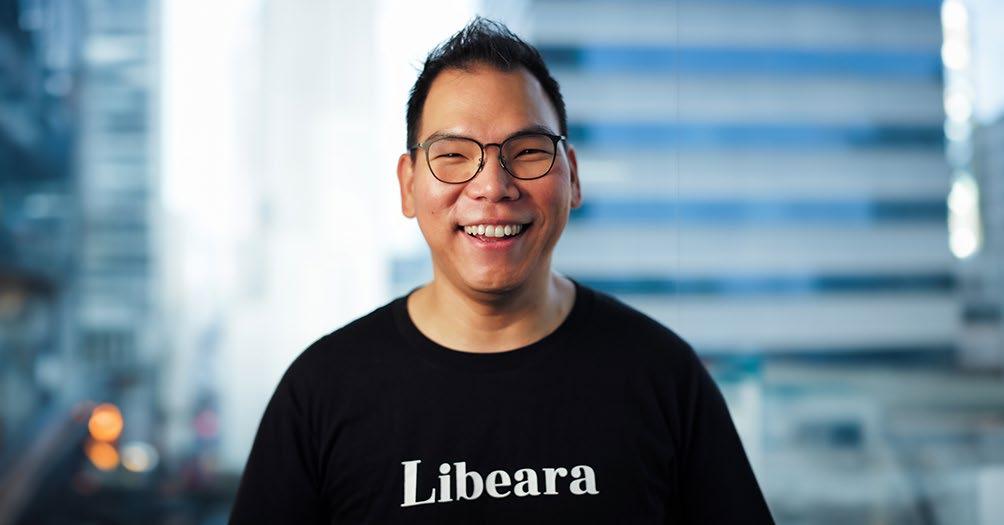
Founder/s: Aaron Gwak
Total Funding: US$10m
Founding Year: 2023 (Jan)
With the goal of establishing a new market culture backed by accessibility, transparency, and security, Libeara connects people to their government bonds through a platform built with bank-grade security and compliance controls for primary government bond issuance and secondary exchange. Backed by SC Ventures, Libeara’s tokenised platform is currently being used for the SGD Delta Fund that was recently given an AA rating by Moody, making it the first tokenised fund on a public blockchain to receive a Moody’s rating.
Mito Health
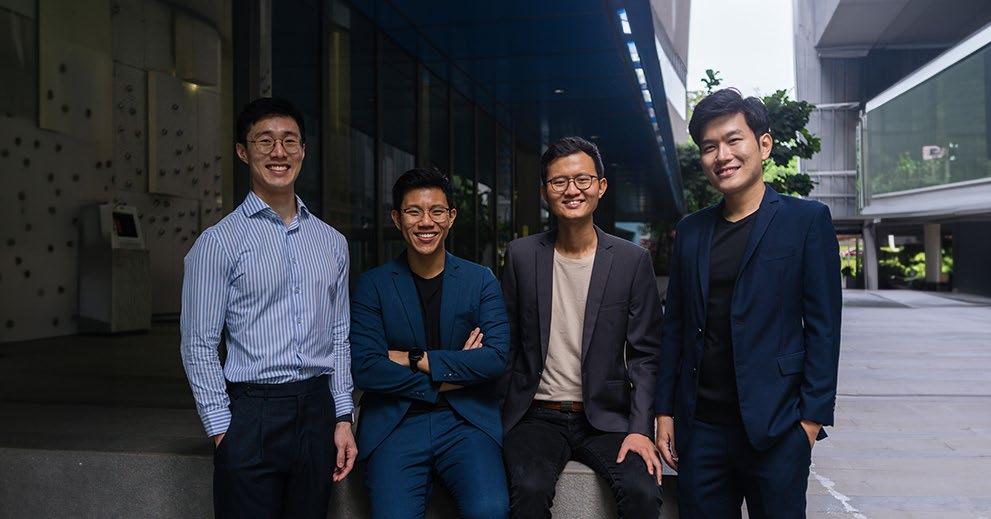
Founder/s: Kenneth Lou
Total Funding: USD1.5M (2M SGD)
Founding Year: 2023 (Jan)
Mito Health leads the way in digital preventive healthcare, aiming to shift the industry's focus from reactive to proactive health management. The digital longevity clinic offers a virtual platform that comprehensively assesses clients' and is aimed at extending healthspan and overall longevity. By integrating blood test results with lifestyle data, Mito Health generates customised recommendations for nutrition, exercise, and supplements, all accessible through a virtual health dashboard. With a flagship panel testing 67 biomarkers, Mito Health distinguishes itself by providing executive-level screening at a fraction of the cost. They have several angel investors with Forge Ventures as their main investor.
Audax
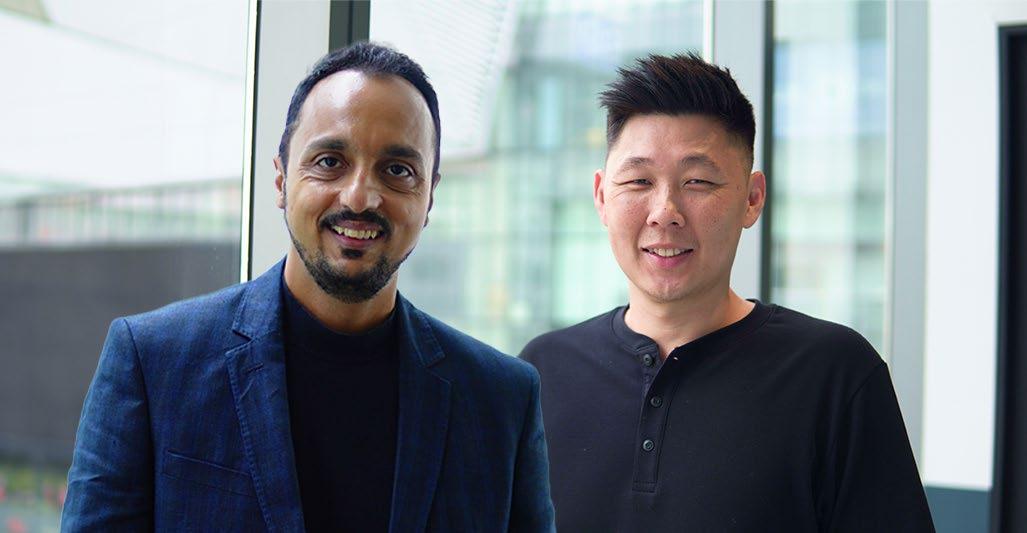
Founder/s: Kelvin Tan, Sachin Sharma
Total Funding: Undisclosed
Founding Year: 2023 (Aug)
Audax is a digital banking capabilities provider backed by SC Ventures, as they believe it can “help financial institutions to accelerate their digital banking capabilities.” Audax’s platform provides solutions to banks and financial institutions who wish to establish new scalable digital banking models and maximise revenue streams at lesser customer acquisition costs. With its Banking-as-a-service(BaaS) model, clients such as Standard Chartered are able to tap new opportunities as demands for a seamless and modernised banking experience continue to rise.
Infinity Cube
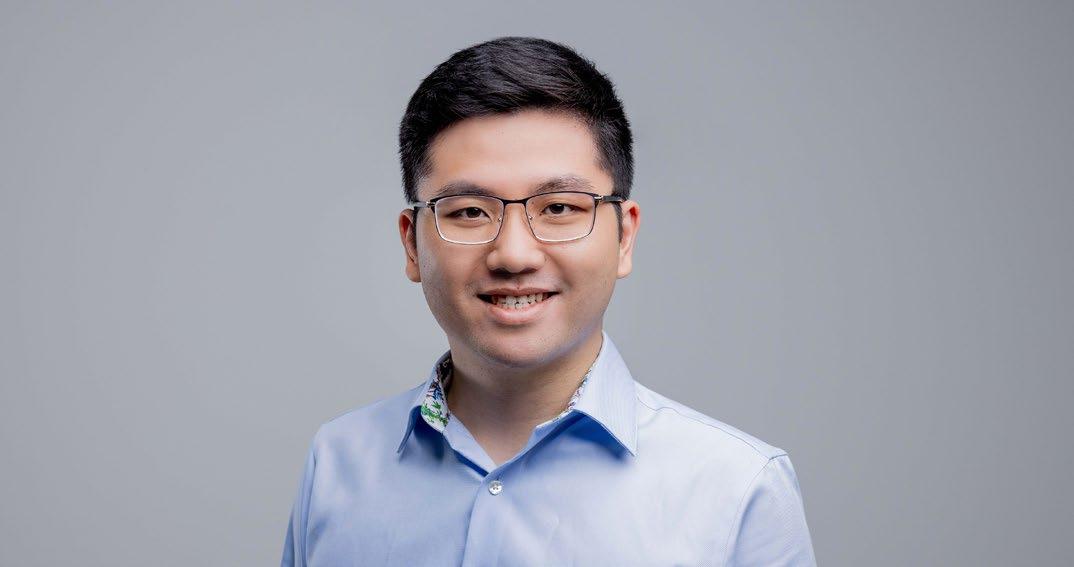
Founder/s: Oh Jun Rong
Total Funding: Undisclosed
Founding Year: 2023 (Oct)
Battery Energy Storage Systems (BESS) mark a groundbreaking advancement in energy storage, with Infinity Cube spearheading innovation as a specialist in construction applications. By seamlessly integrating renewable energy like wind and solar power, the Infinity Cube effectively balances energy production and consumption in construction operations. In doing so, it reduces carbon emissions by up to 80% and significantly reduces the sector's reliance on diesel generators. The Infinity Cube offers a sustainable and cost-effective solution, with cost reductions of up to 50% for businesses. This transformative technology powers construction sites and beyond, enabling progress without compromise.
COVER STORY 36 SINGAPORE BUSINESS REVIEW | Q2 2024
MBA PROGRAMME SURVEY
MBA providers scramble to counteract falling student interest
Business schools revamp their curricula with modules on digital transformations.
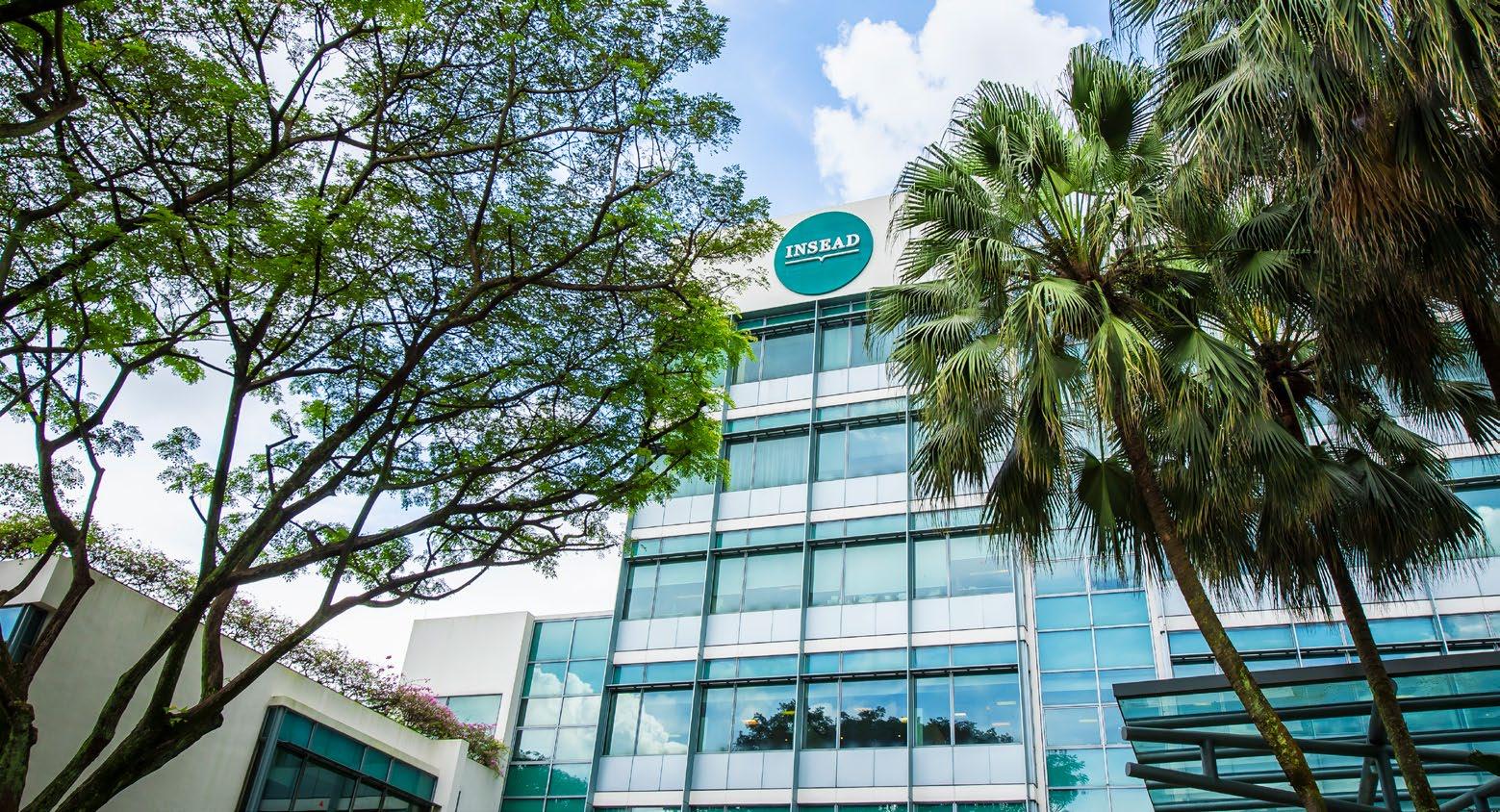
Even after lifting pandemic restrictions, degree providers for a Master of Business Administration (MBA) in Singapore have experienced a crunch in student enrollment in 2023. This year’s MBA survey revealed that 10 providers enrolled only a total of 3,208 students, down 8.3% from the previous year’s 3,501 enrollees under 11 providers.
Despite only having one programme, INSEAD recorded the highest enrollment of MBA students, totalling 843, 35% of whom are women. The average age of the class was 29, with around 5.8 years of work experience.
Next to INSEAD in terms of enrollment numbers was the National University of Singapore (NUS) with 401 students across its four programmes, both in part-time and full-time formats.
Amity Global Institute comes in third place with 389 students from its University of NorthamptonMBA programme, followed by PSB Academy with 358, James Cook University Singapore with 348, and NTU-Nanyang Business School with 280 enrolled students across its five MBA programmes.
Completing the list are Aventis Graduate School with 200, Kaplan Higher Education with 195, Singapore


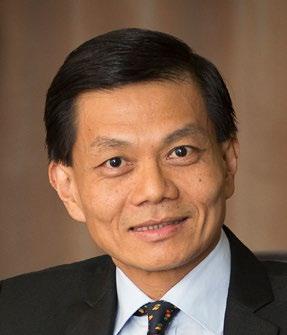
Management University (SMU) with 110, and S P Jain School of Global Management-Singapore, with 85 enrolled students.
Hybrid options
Post-pandemic, universities have merged the benefits of in-person and online MBA programs in response to rising demand by the student body.
“The pandemic reinforced our [belief] that a truly transformative MBA programme cannot be delivered effectively in an online format,” Professor Jochen Wirtz, vice dean of MBA Programmes at NUS Business School told Singapore Business Review
“However, online learning offers immense flexibility which would be foolish to ignore. We have started to offer a small number of online classes or blended classes to complement our largely face-to-face classes so that our students can benefit from the best of both worlds,” Wirtz said.
At Kaplan Higher Education, blended learning is offered to meet student needs for flexibility. “Whether students prefer in-person or online learning, Kaplan caters to various learning needs, highlighting our dedication to adaptability and student support,” said Susie Khoo, president of Kaplan Singapore.
Increase in admissions and programmes
Meanwhile, for other universities, the shift from the pandemic presented an opportunity to increase admissions and expand existing academic offerings.
The Singapore Management University increased the number of intakes per year to four, in both full-time and part-time programmes. It also revamped academic offerings with “modules on Leading Digital Transformation and Data Analytics, equipping students with a comprehensive understanding of technology trends and digital strategies, and the essential skills to navigate the evolving digital business landscape,” Dr. Ang Ser Keng, academic director for MBA at Singapore Management University (SMU), said.
Leading provider INSEAD revamped its curriculum to include new electives, integrated sustainability into all 14 core courses, and offered customisation with over 75 electives across nine academic areas.
Aside from industry shifts, PSB Academy has seen a notable demographic of students upgrading their business knowledge to run family businesses or start their own venture.
“We are seeing an increase in the number of students who want to up-skill and reskill to be more future work proof for the post-pandemic era,” said Dr. Charles Ong, dean and head of School of Health and Life Sciences at PSB Academy.
To address this, the university provides students with a comprehensive Knowledge, Skills, and Ability (KSA) framework that emphasises industry participation, peer learning, and digital research spaces, Ong added.
Global competitiveness
MBA programme providers are expanding globally through partnerships to enhance competitiveness and global connectivity.
SINGAPORE BUSINESS REVIEW | Q2 2024 37
INSEAD recorded the highest enrollment despite having only one MBA programme (Photo from INSEAD)
HR & EDUCATION | by Diana Dominguez
Ang Ser Keng
Susie Khoo
Jochen Wirtz
MBA PROGRAMMES SURVEY
38 SINGAPORE BUSINESS REVIEW | Q2 2024
MBA PROGRAMME PROVIDER/LOCAL PARTNER Total Number of Students HEAD OF SINGAPORE OFFICE/DEAN 2023 2022 INSEAD MBA INSEAD 843* 843 Prof. Francisco Veloso NUS Executive MBA – Chinese (part time) National University of Singapore 122 100 Andrew K. Rose NUS Executive MBA – English (part time) National University of Singapore 53 50 Andrew K. Rose UCLA-NUS Executive MBA (part time) National University of Singapore 24 40 Andrew K. Rose NUS MBA (full time & part time National University of Singapore 202 240 Andrew K. Rose University of Northampton - MBA Amity Global Institute 389 234 Prof. (Dr.) Leon Choong Master of Business Administration - University of Newcastle PSB Academy 190 103 Dr. Calvin Tan Master of Business Administration in Global BusinessCoventry University PSB Academy 160 187 Dr. Melissa Liow Executive Master of Business Administration - University of Newcastle PSB Academy 8 N/A Dr. Calvin Tan James Cook University MBA James Cook University Singapore 347 345 Prof. Stephen Boyle Nanyang MBA "Nanyang Technological University Nanyang Business School" 80 70 Prof. Boh Wai Fong Nanyang Fellows MBA "Nanyang Technological University Nanyang Business School" 40 30 Prof. Boh Wai Fong Nanyang Executive MBA (English) "Nanyang Technological University Nanyang Business School" 35 35 Prof. Boh Wai Fong Nanyang Professional MBA "Nanyang Technological University Nanyang Business School" 75 75 Prof. Boh Wai Fong Nanyang Executive MBA (Chinese) "Nanyang Technological University Nanyang Business School" 50 50 Prof. Boh Wai Fong Master of Business Administration (MBA) Aventis Graduate School 200 100 Prof. Malick Sy Murdoch University MBA Kaplan Higher Education 155 150 Dr. Sam Choon Yin Northumbria University MBA Kaplan Higher Education 40 40 Dr. Sam Choon Yin Singapore Management University MBA Singapore Management University 110 127 Bert DE REYCK S P Jain Master of Global Business S P Jain School of Global Management, Singapore 85 300 Dr. Balakrishna Grandhi TOTAL 2365 3119
**August 2024 intake ***January 2025 intake ****January 2023 Intake *****August 2022 Intake
Notes: *Students who graduated in July 2023 and December 2023
SINGAPORE BUSINESS REVIEW | Q2 2024 39 TOTAL NUMBER OF STUDENTS Minimum Cost (SG$) Duration Number of Intakes Per Year Full Time Part Time Full Time Part Time Full Time Part Time 843* N/A $144,211** $150,000*** " N/A 10 mos N/A 2 N/A 122 N/A $180,000 N/A 20 mos 1 N/A 53 N/A $125,000 N/A 15 mos 1 N/A 24 N/A $90,000 N/A 15 mos 1 105 97 $87,000 $87,000 17 mos 24-30 mos 1 264 125 $21,060.00 $21,060.00 1 year 2 years 6 190 N/A $32,046.00 N/A 16 mos N/A 3 90 70 $28,122.01 $28,122.00 12 mos 16 mos 3 8 N/A $44,036.00 N/A 12 mos N/A 1 335 12 $30,636.00 $38,880.01 12 mos 16 mos 3 80 N/A $65,000 N/A 12 mos N/A 1 30 10 $75,000 $75,000 12 24 1 N/A 35 N/A $110,000 N/A 15 mos 1 N/A 75 N/A $68,000 N/A 18 mos 1 N/A 50 N/A $141,800 N/A 24 mos 1 N/A 200 N/A $23,800 N/A 10 mos 4 30 125 $28,449 $23,064 12-24 mos 12-24 mos 3 N/A 40 N/A $22,770 15 mos 15 mos 4 45**** 65***** $76,300 $76,300 15 mos****** 18 mos******* 4******** 85 N/A $57,447 N/A 1 year N/A 2
SURVEY
flexibility to be completed within 10 mos)
flexibility to be completed within 15 mos)
August (both for FT & PT)
MBA PROGRAMMES
******with
*******with
********January,
MBA PROVIDERS SURVEY
40 SINGAPORE BUSINESS REVIEW | Q2 2024
MBA PROVIDER MBA PROGRAMME HEAD OF SINGAPORE OFFICE/ DEAN TOTAL NUMBER OF STUDENTS Full Time Part Time INSEAD INSEAD MBA Prof. Francisco Veloso 843* N/A GRAND TOTAL Amity Global Institute University of Northampton - MBA Prof. (Dr.) Leon Choong 264 125 GRAND TOTAL PSB Academy Master of Business Administration - University of Newcastle Dr. Calvin Tan 190 N/A Master of Business Administration in Global Business - Coventry University Dr. Melissa Liow 90 70 Executive Master of Business AdministrationUniversity of Newcastle Dr. Calvin Tan 8 N/A GRAND TOTAL James Cook University Singapore James Cook University MBA Prof. Stephen Boyle 335 12 GRAND TOTAL Nanyang Technological University Nanyang Business School Nanyang MBA Prof. Boh Wai Fong 80 N/A Nanyang Fellows MBA 30 10 Nanyang Executive MBA (English) N/A 35 Nanyang Professional MBA N/A 75 Nanyang Executive MBA (Chinese) N/A 50 GRAND TOTAL National University of Singapore The NUS MBA (including MBA-MPP & MBA-PhD) Andrew K. Rose 105 97 NUS Executive MBA – English N/A 53 NUS Executive MBA – Chinese N/A 122 UCLA-NUS Executive MBA N/A 24 GRAND TOTAL Aventis Graduate School Master of Business Administration (MBA) Prof. Malick Sy N/A 200 GRAND TOTAL Kaplan Higher Education Murdoch University MBA Dr. Sam Choon Yin 30 125 Northumbria University MBA N/A 40 GRAND TOTAL Singapore Management University* Singapore Management University MBA** Bert DE REYCK 45**** 65***** GRAND TOTAL S P Jain School of Global Management, Singapore S P Jain Master of Global Business Dr. Balakrishna Grandhi 85 N/A GRAND TOTAL TOTAL Notes: *Students who graduated in July 2023 and December 2023 **August 2024 intake ***January 2025 intake ****January 2023 Intake *****August 2022 Intake
SINGAPORE BUSINESS REVIEW | Q2 2024 41
TOTAL Minimum Cost (SG$) Duration Number of Intakes Per Year Full Time Part Time Full Time Part Time 843 $144,211** $150,000*** N/A 10 mos N/A 2 843 389 $21,060.00 $21,060.00 1 year 2 years 6 389 190 32,046 N/A 16 mos N/A 3 160 28,122.01 28,122.01 12 mos 16 mos 3 8 44,036.00 N/A 12 mos N/A 1 358 347 $30,636.00 $38,880.01 12 mos 16 mos 3 347 80 65,000 N/A 12 mos N/A 1 40 75,000 75,000 12 mos 24 mos 35 N/A 110,000 N/A 15 mos 75 N/A 68,000 N/A 18 mos 50 N/A 141,800 N/A 24 mos 280 202 $91,090 $91,275 17 mos 24-30 mos 1 53 N/A 15 mos 122 N/A 20 mos 24 N/A 15 mos 202 200 N/A $23,800 N/A 10 mos 4 200 155 28,449 23,064 12-24 mos 12-24 mos 3 40 N/A 22,770 15 mos 15 mos 4 195 110 $76,300 $76,300 15 mos****** 18 mos******* 4******** 110 85 US$42,100 or $56,781 N/A 1 year N/A 2 85 3208 ******with flexibility to be completed within 10 mos) *******with flexibility to be completed within 15 mos) ********January, August (both for FT & PT)
MBA PROVIDERS SURVEY
INDUSTRY INSIGHT: HEALTHCARE
Singapore’s health data bill mandates regulated information sharing
To ensure data disclosure and sharing, the Ministry of Health can impose up to $1m in fines for non-compliance.
Many private healthcare providers have yet to adopt the National Electronic Health Record (NEHR), even though it has been available as a central repository for patient records since 2011. As of October 2023, only a 15% participation rate has been recorded.
To encourage data sharing amongst healthcare providers, the government introduced the Healthcare Information Bill (HIB) that will make health data sharing mandatory.
“The Ministry of Health has identified that healthcare needs would become more complex as the population ages. This will entail more Singaporeans experiencing chronic conditions, having to visit various healthcare institutions and rely on multiple healthcare providers. The MOH expects that Singapore’s healthcare system will become more diverse, as it is continually evolving to meet the different demands of the population,” Lim Ren Jun, principal and co-lead of Healthcare & Life Sciences Industry Group at Baker McKenzie Wong & Leow, told Singapore Business Review.
Coordination
Zhen Guang Lam, senior associate
A central repository empowers patients with greater control over their own health data
at Clyde & Co Clasis Singapore, has a similar insight saying: “A central repository for patient health records holds immense potential to revolutionise healthcare delivery, as it not only enhances efficiency and coordination among healthcare professionals, but also empowers patients with greater control over their own health data.”
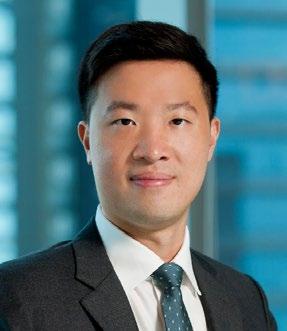

“The seamless exchange of information across the healthcare ecosystem can lead to more accurate diagnosis, timely interventions, and ultimately, better patient outcomes,” Lam told Singapore Business Review
Disclosing health data on the NEHR will eliminate repetitive patient declarations of their medical history to various healthcare professionals, saving time. Similarly, this frees up resources on the healthcare providers’ end as they would not need to require patients to provide such information, according to Lim.
“By having access to a common set of the patient’s health data, healthcare professionals will ultimately be able to make better decisions for the benefit of their patients,” Lam added.
Duties and responsibilities
The bill being introduced applies to all

licensed healthcare service providers, including digital health service providers offering telemedicine service, approved users who can access health information in the NEHR, and data intermediaries.
Those covered by the bill have the responsibility to share selected health information like patient demographics, medical diagnoses or allergies, and medications.
They are also required to comply with cybersecurity and data security requirements, including notifying the MOH within two hours should there be a data breach or compromised cybersecurity incident.
“Healthcare providers may have to carefully scrutinise and consider whether they are in compliance with the cybersecurity and data security requirements due to robust requirements that will be implemented under the HIB,” Baker McKenzie’s Lim said.
“Operationally, healthcare providers would need to implement processes to comply with this mandatory incident notification requirement,” he added.
Access
Authorised healthcare professionals have access to data in the NEHR. Non-authorised healthcare professional or non-licensed healthcare providers may also be granted access to the central repository as “approved users,” but they will only be granted access to “relevant information required for them to provide care for patients,” said Clyde & Co’s Lam.
Retail pharmacists fall under this category of a non-licensed healthcare provider. “Retail pharmacists may be granted limited access to medication and allergy records so that they can flag out any unsafe interactions between medications that the patient is already consuming, with the other medications which the patient may be intending to purchase,” Lam said.
42 SINGAPORE BUSINESS REVIEW | Q2 2024
Health Minister Ong Ye Kung launches rebranded Synapxe, the platform for NEHR, during the IHiS' 15th anniversary (Photo from Synapxe)
INFORMATION TECHNOLOGY
Lim Ren Jun Zhen Guang Lam


SBR Management Excellence Awards 2023 honours visionary leaders and teams
In the heart of Singapore's bustling business landscape, where challenges are met with unwavering determination and innovation is the lifeblood of progress, true heroes emerge – leaders who not only navigate the complexities but also inspire, nurture, and uplift those around them. The SBR Management Excellence Awards, in its ninth year, stood as a testament to the remarkable impact of these leaders and their organisations on the very fabric of their workforce.
More than a mere recognition of growth and success metrics, the awards programme aimed its spotlight on the soul of leadership. The essence of the SBR Management Excellence Awards lies not just in acknowledging triumphs but in celebrating the profound positive transformations that these leaders instil within their organisations, weaving a tapestry of motivation, inspiration, and accomplishment.
The esteemed judging panel, comprised of industry luminaries such as Wai Keat Cheang, Partner, Consulting at Ernst & Young Advisory Pte. Ltd.; Irving Low, Co-Head of Advisory at KPMG Singapore; Roger Loo, Executive Director, Management Consulting at BDO LLP; Greg Unsworth, Digital Business and Risk Services Leader at PwC Singapore;
SBR MANAGEMENT EXCELLENCE AWARDS 2023
Executive of the Year
• Brokerage - Carol Fong, CGS-CIMB Securities
• Business Services - Paul Chong, Certis
• Commercial Real Estate Trust - Kelvin Chow, Lendlease Global Commercial Trust Management Pte. Ltd.
• Data Center - Asher Ling, Princeton Digital Group
• Education - Dr. Janson Yap, National University of Singapore
• Electronic Manufacturing - Masafumi Ishiyama, Hoya Electronics Singapore Pte Ltd
• Financial Services - Simon Cooper, Standard Chartered Bank
• Food & Beverage - Patrick Kwok, Starbucks Coffee Singapore Pte Ltd
• Heavy Civil Construction - Shane Shi Hong Sheng, HSC Pipeline Engineering Pte Ltd
• Insurtech - Stephan Tan, bolttech
• Logistics - Krishnamani Kannan, Deliver.sg
• Non-Profit or Government Organizations - Donald Chan, CDP
• Real Estate - George Agethen, Ivanhoé Cambridge
• Technology - Wen Huang, SoftServe-Singapore Pte Ltd
• Telecommunications - Christian Patouraux, Kacific Broadband Satellites Ltd
• Transportation - Jeffrey Sim Vee Ming, SBS Transit
Innovator of the Year
• Consulting - Prophet
• Financial Technology - Xero
• Healthcare Technology - Guardant Health AMEA
• IT Services - Dr Lei Xiao, Alibaba Cloud
• Technology - Sol- X, Magellan X Pte. Ltd.
Team of the Year
• Business Services - Certis Aviation Security, Certis
• Computer Software - BHP Team, SoftwareOne Singapore Pte Ltd
• Consumer Products (Non-Durables) - Truegenics Pte Ltd
• Energy - Asia Pacific Team, Black & Veatch
and Henry Tan, Group CEO & Chief Innovation Officer at CLA Global TS Holdings Pte. Ltd. Their discerning eyes sought out not only strategic vision and talent development but also a commitment to keeping pace with evolving stakeholder expectations, fostering cross-ecosystem collaboration, and championing sustainability and social responsibility.
Greg Unsworth of PwC, emphasised the importance of strategic vision and talent development, recognising them as key indicators of management excellence. He underscored the necessity of leaders not only to steer their organisations toward success but to actively engage with the changing expectations of their stakeholders, showcasing an acute awareness of the evolving business landscape.
Henry Tan from CLA Global TS Holdings brought a humanitarian touch to the criteria, expressing that “entries that are into sustainability, innovation, and digital solutions would stand out. Additionally, those that could add value to healthcare, wellness, care for the elderly, and food shortage issues would create an impact.”
Congratulations to the winners!
• Heavy Civil Construction - Digital Team, HSC Pipeline Engineering Pte Ltd
• Hospitality & Leisure - Sales and Marketing Team, Pan Pacific Hotels Group
• IT Services - Energy Expert Team, Alibaba Cloud
• Property Management Consultancy - Savills Property Management Pte Ltd
• Real Estate - Project Management Team, Savills (Singapore) Pte Ltd
• Telecommunications - Innovations and Solutions Team, EdgePoint Infrastructure
Diversity & Inclusion Initiative of the Year
• Education - National University of Singapore
• FMCG - Pacific Refreshments Pte. Ltd.
• Technology - Tata Communications
Employee Engagement of the Year
• Computer Software - SoftwareOne Pte Ltd
• Electronic Manufacturing - Hoya Electronics Singapore Pte Ltd
• Financial Services - HSBC Life (Singapore) Pte. Ltd.
Health & Wellness Initiative of the Year
• Education - Lee Kong Chian School of Medicine (NTU)
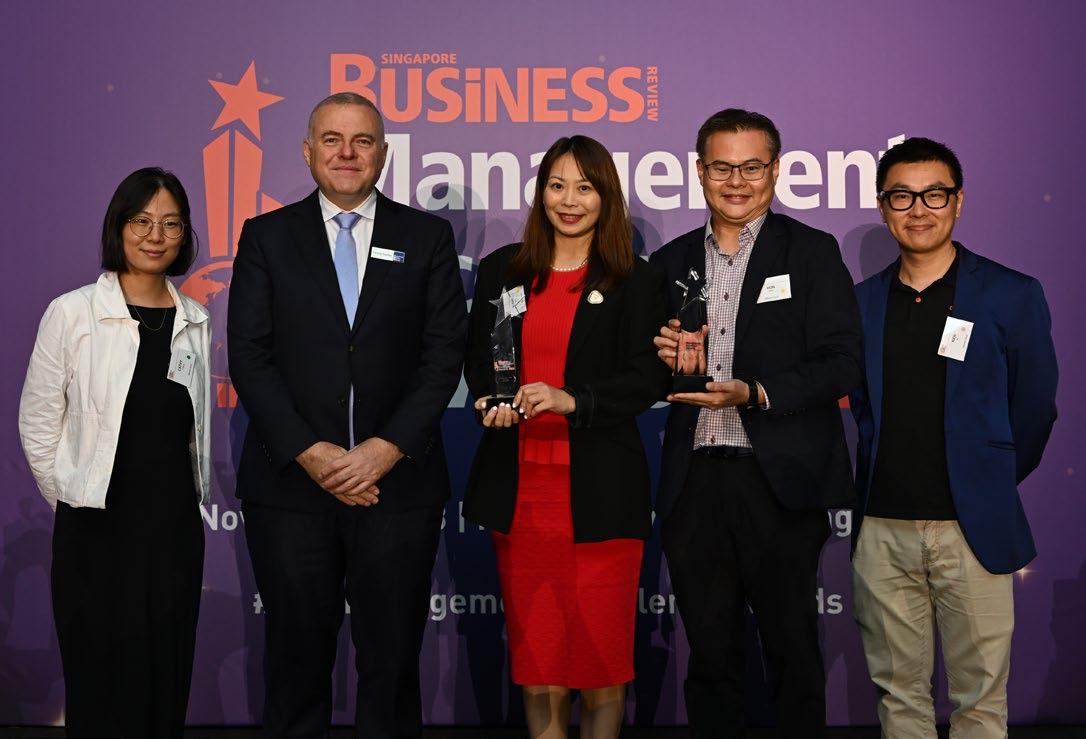
44 SINGAPORE BUSINESS REVIEW | Q2 2024
EVENT: SBR MANAGEMENT EXCELLENCE AWARDS
Alibaba Cloud


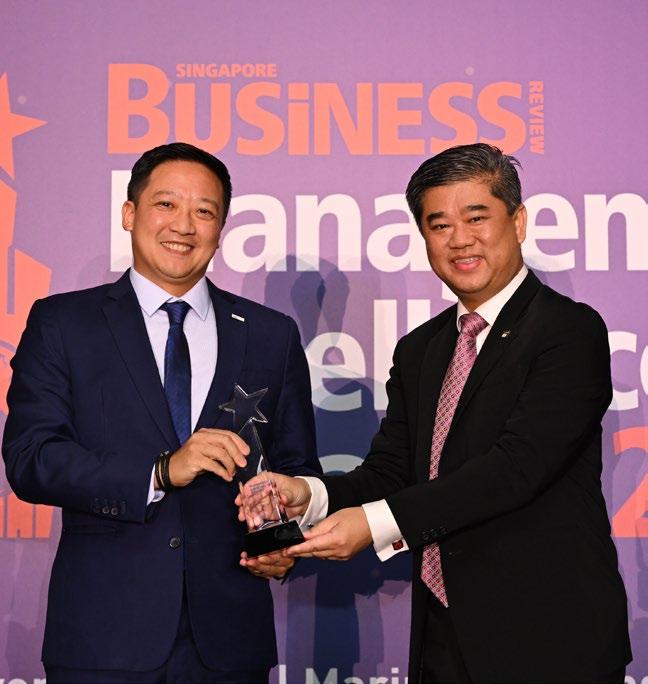
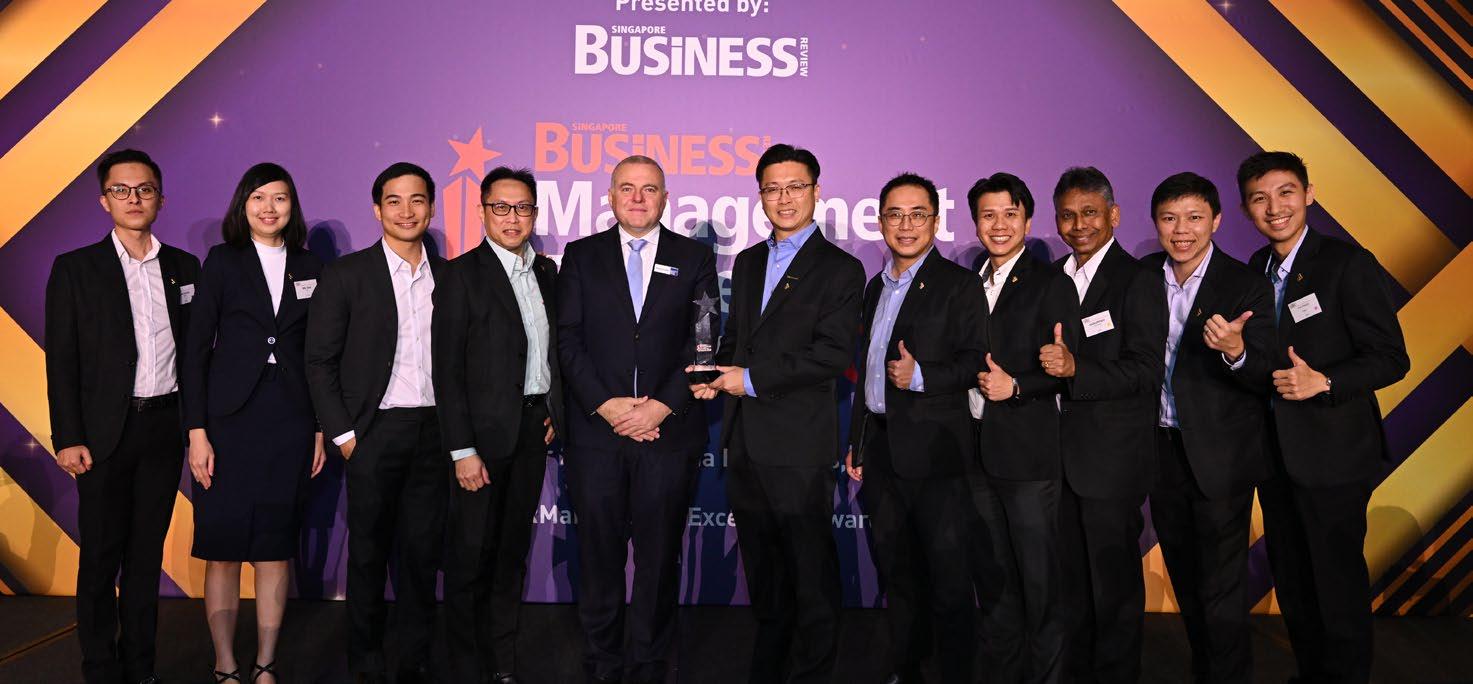
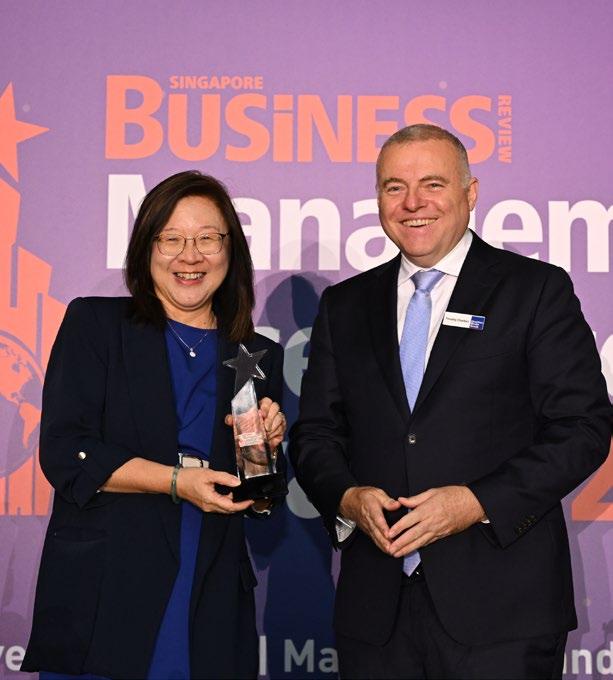
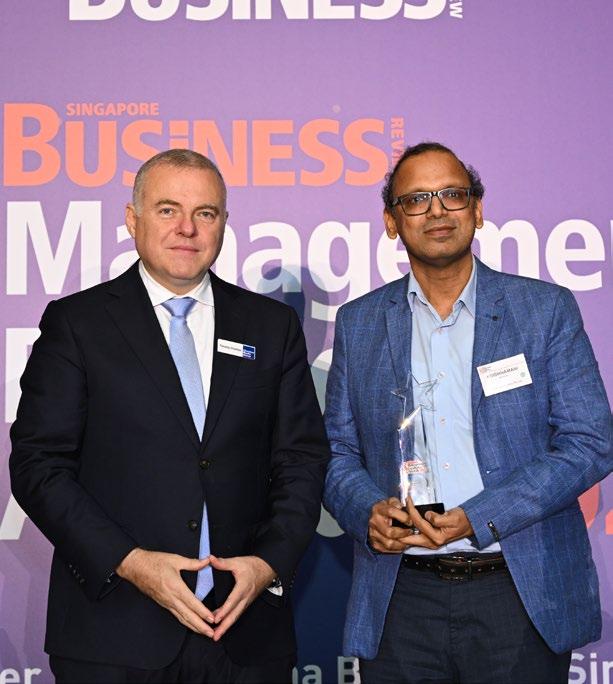
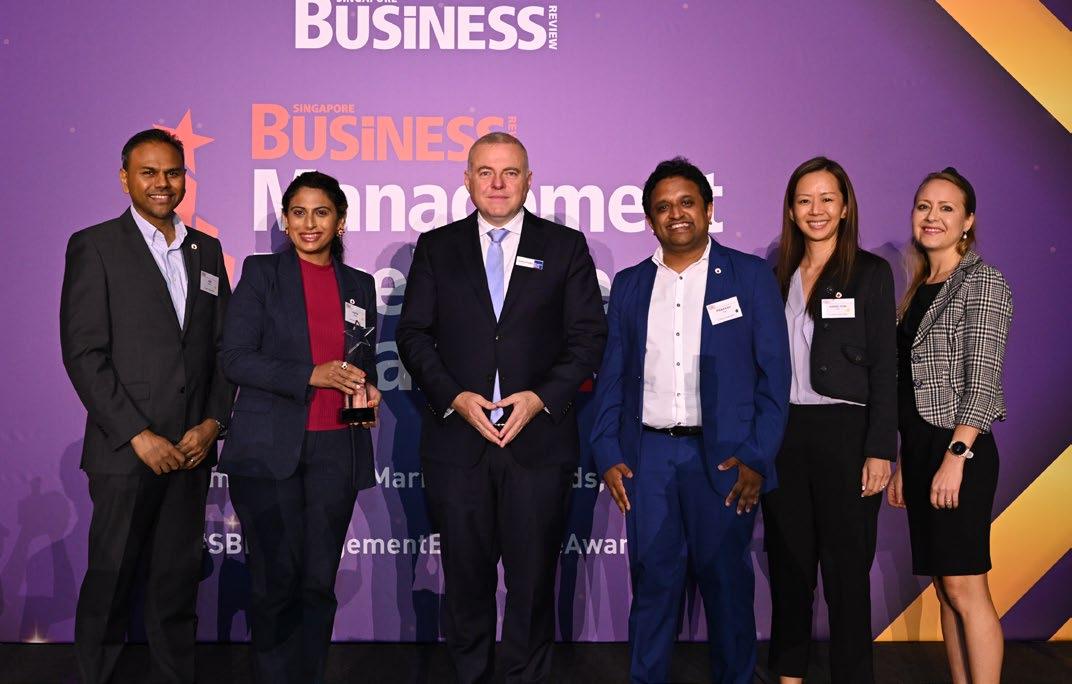
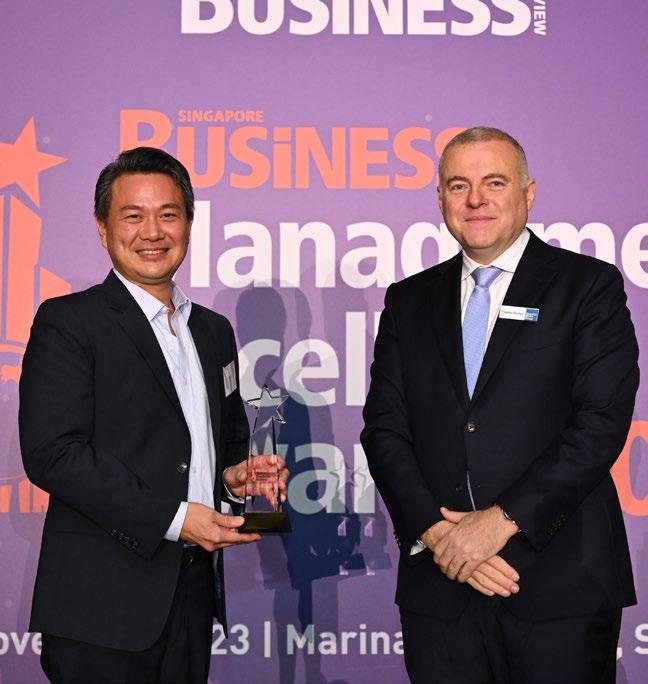
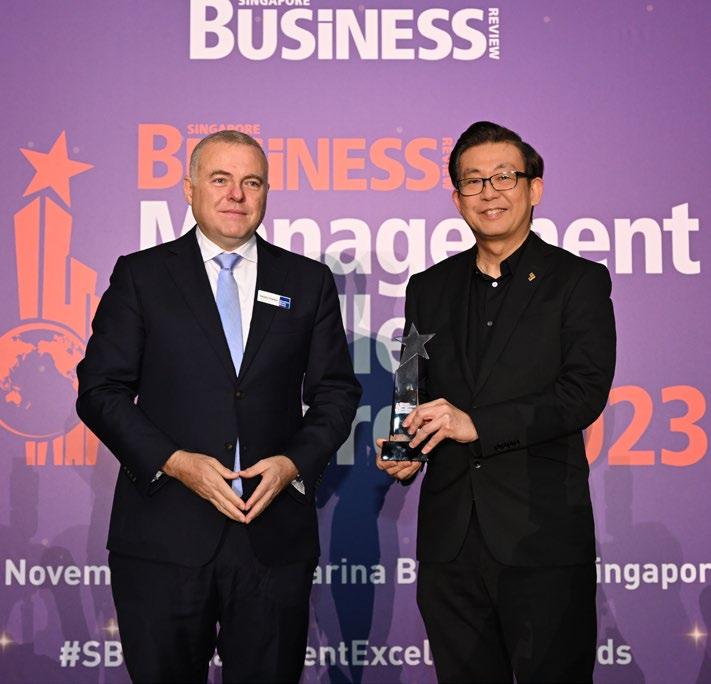
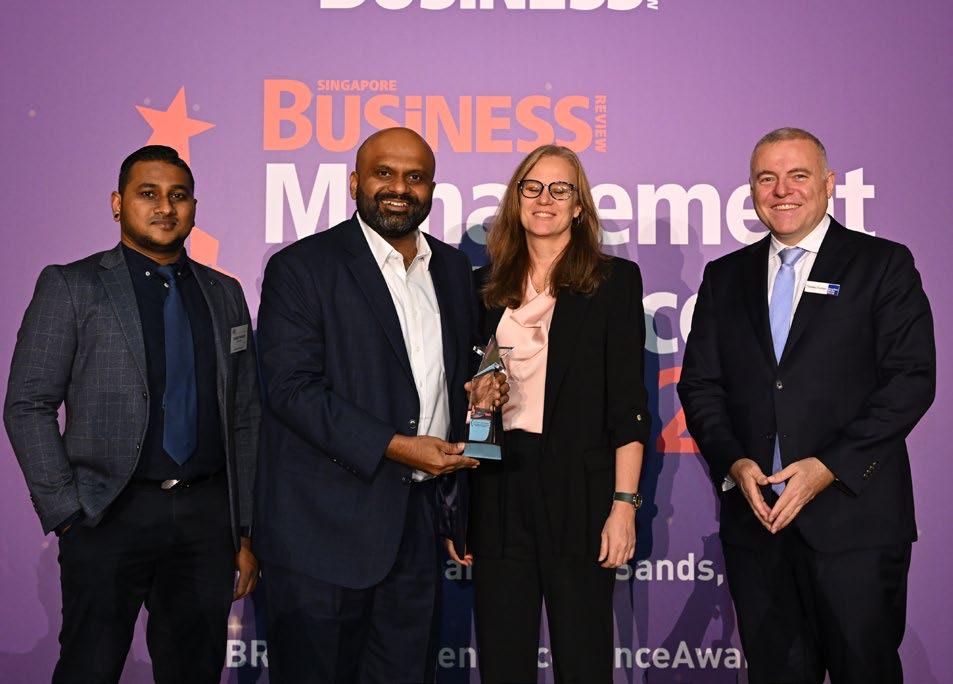
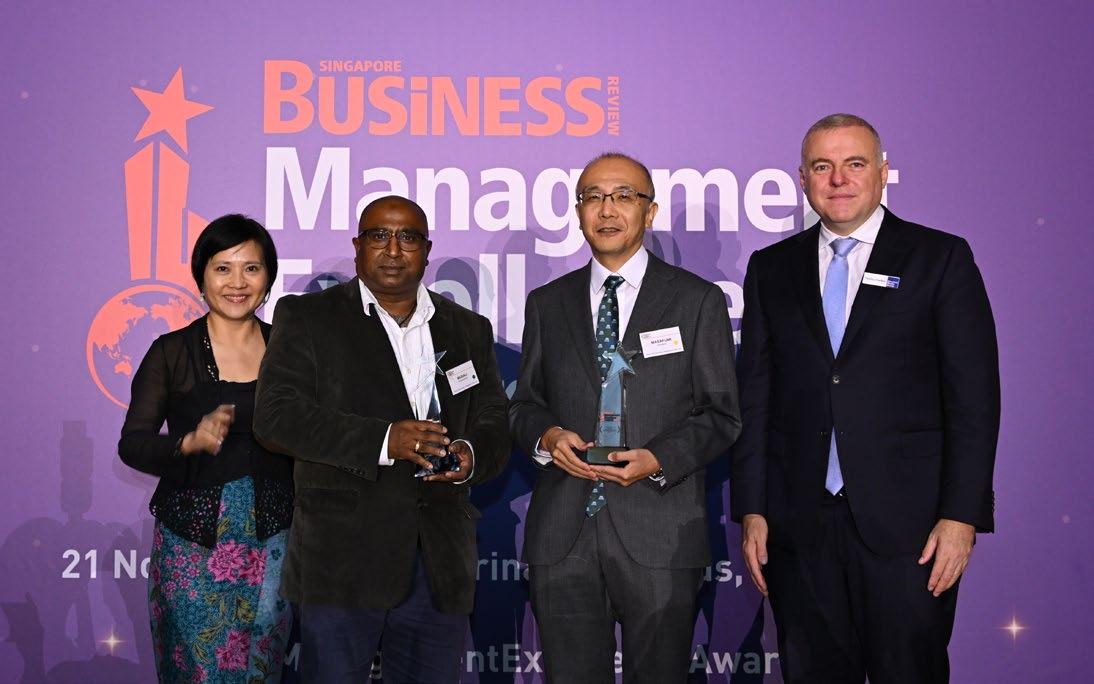
SINGAPORE BUSINESS REVIEW | Q2 2024 45 Management Excellence Awards 2023 Hoya Electronics Singapore Pte Ltd Guardant Health AMEA EdgePoint Infrastructure Deliver.sg Certis Certis CGS-CIMB Securities CDP bolttech Black & Veatch

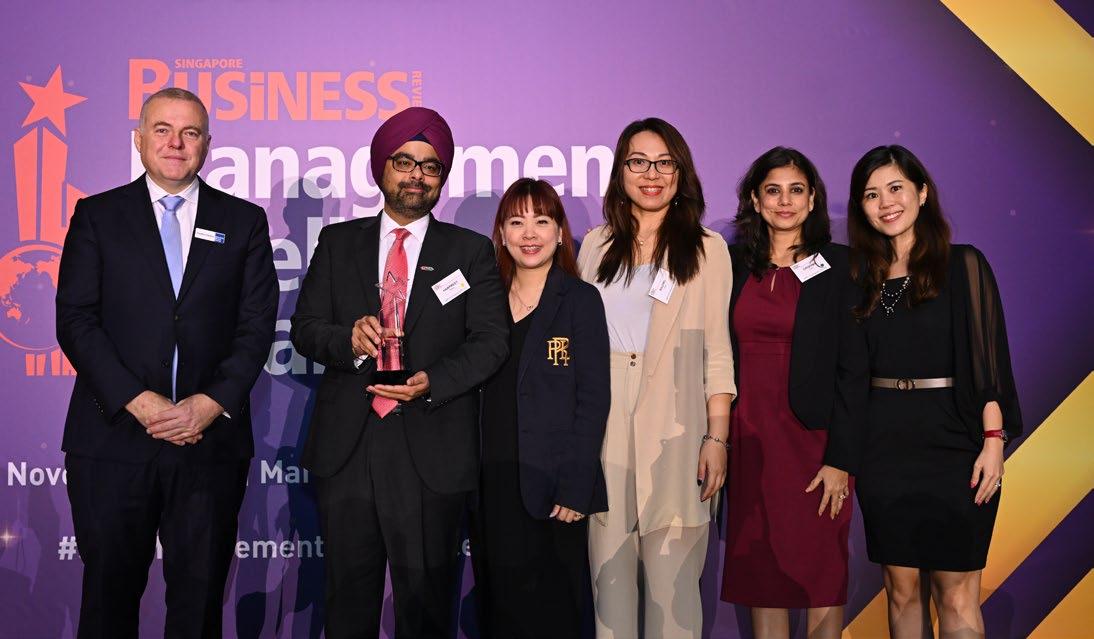
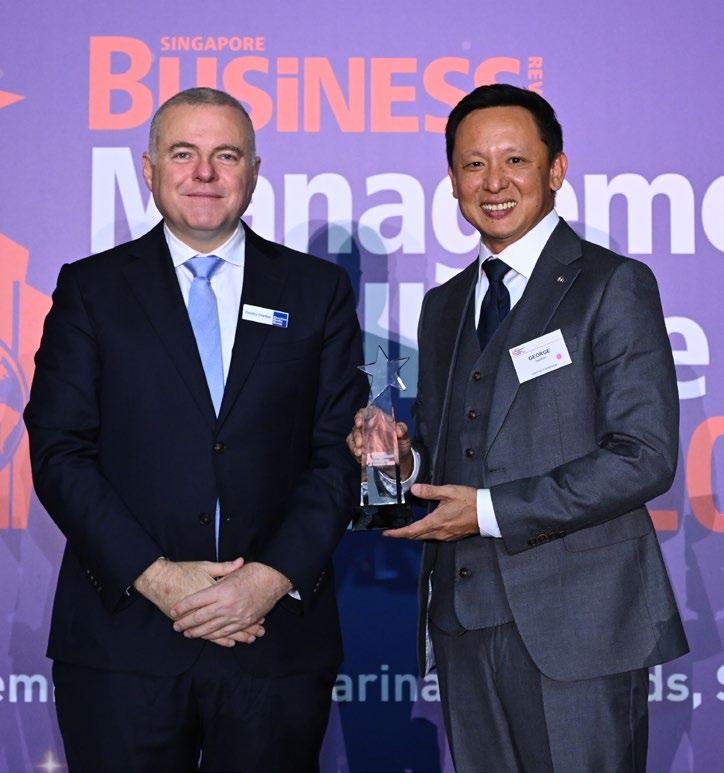
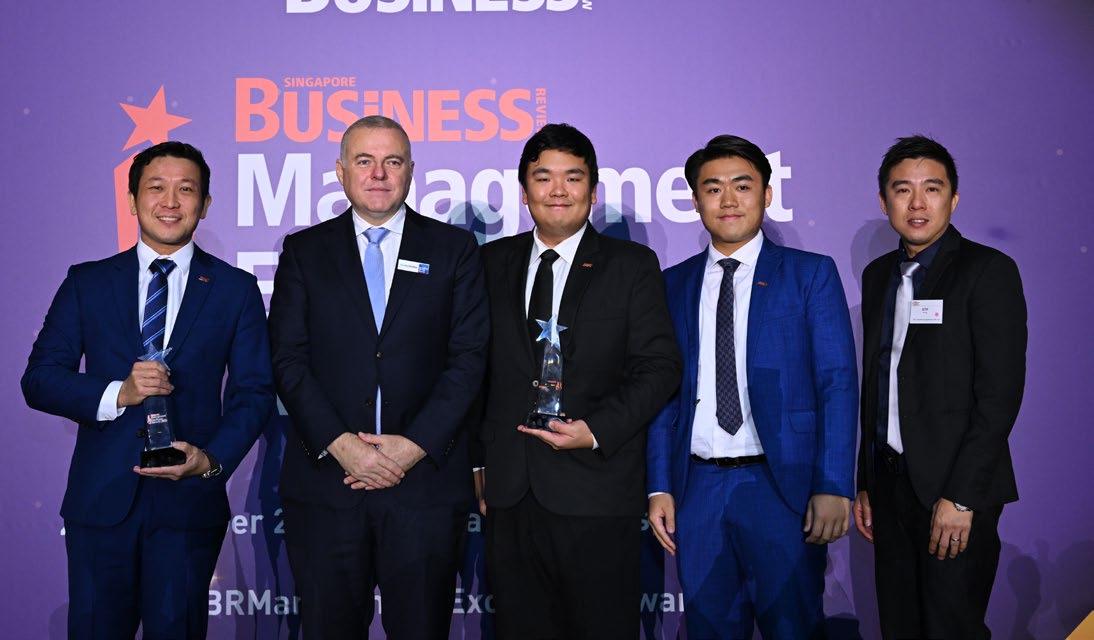
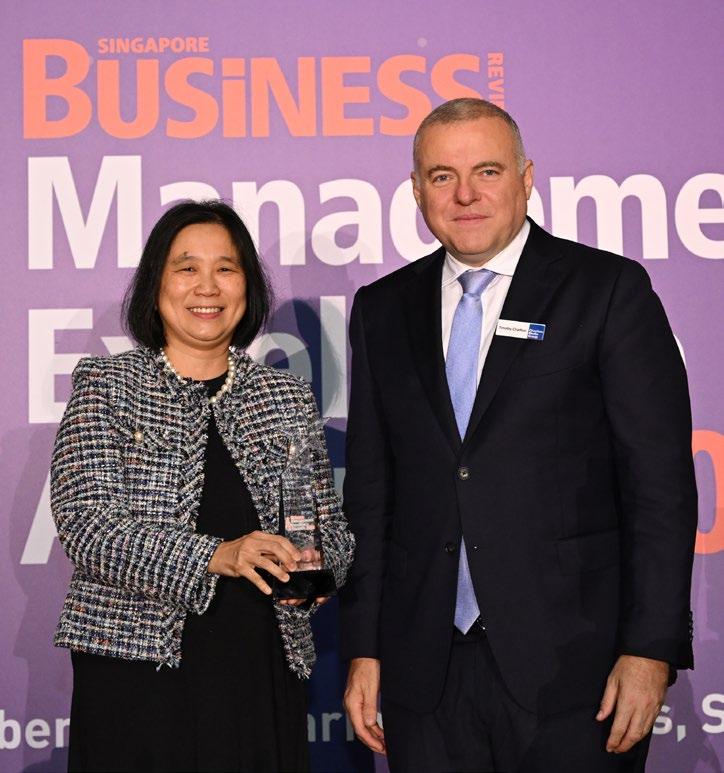
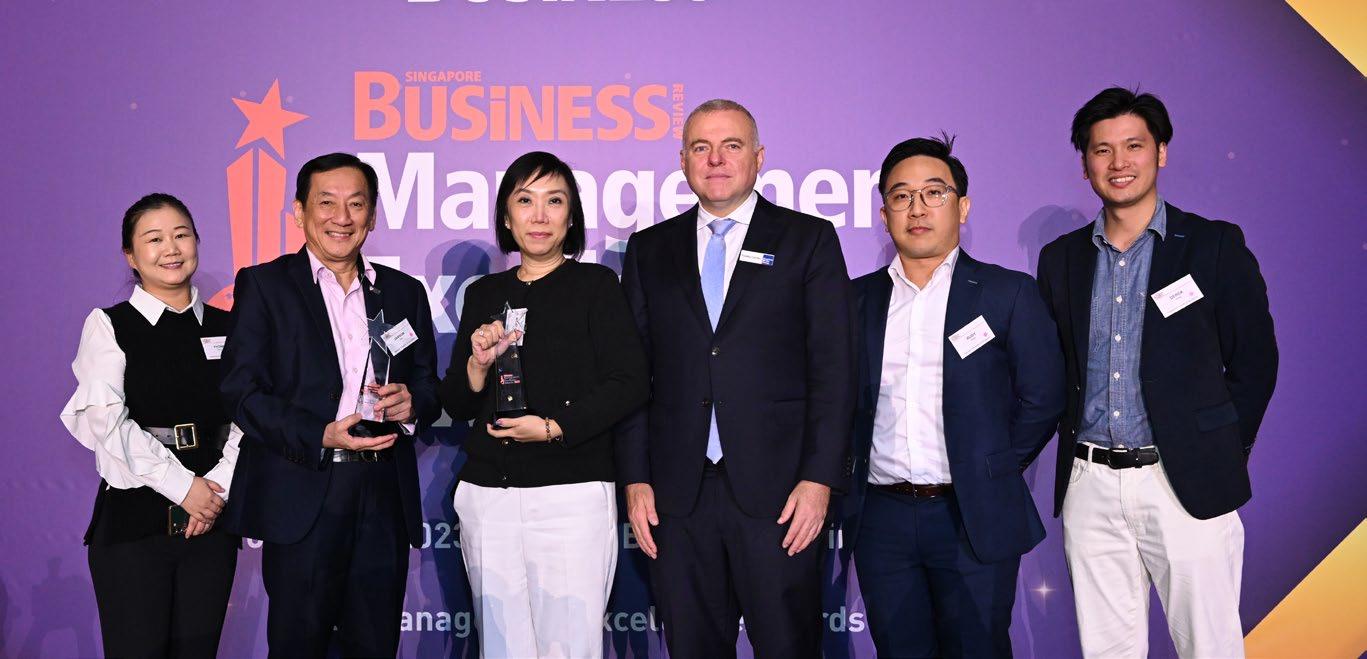
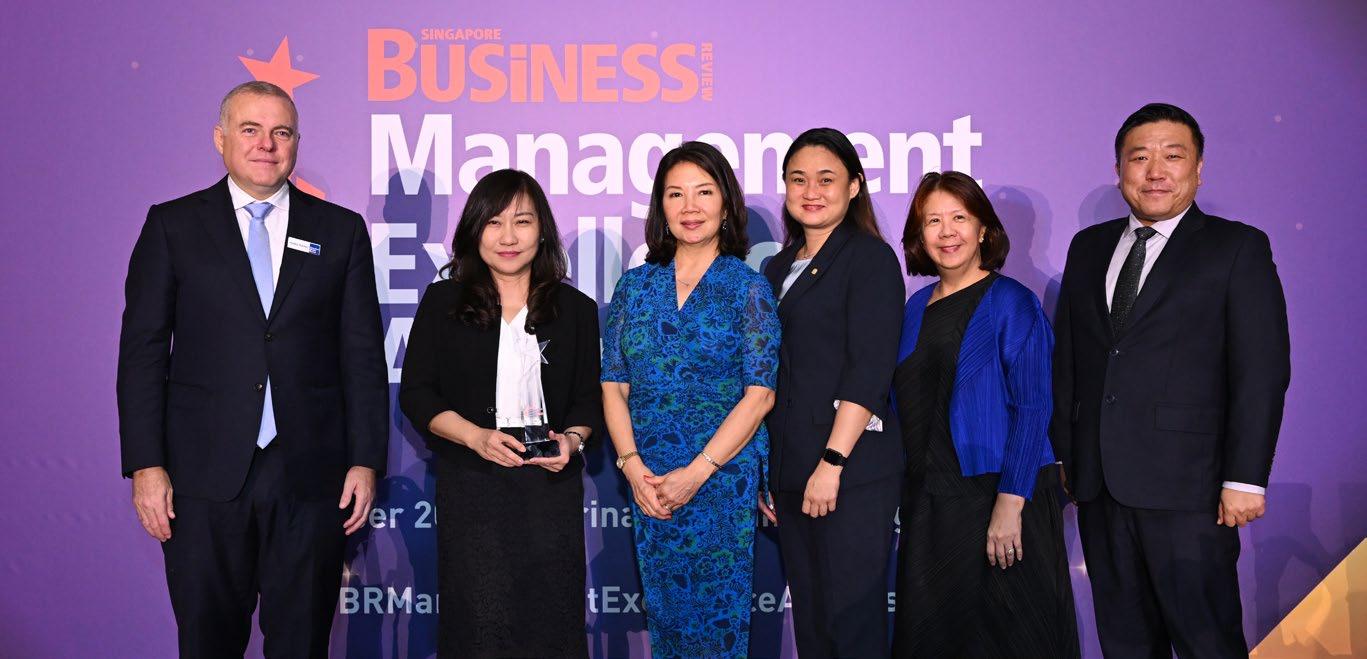
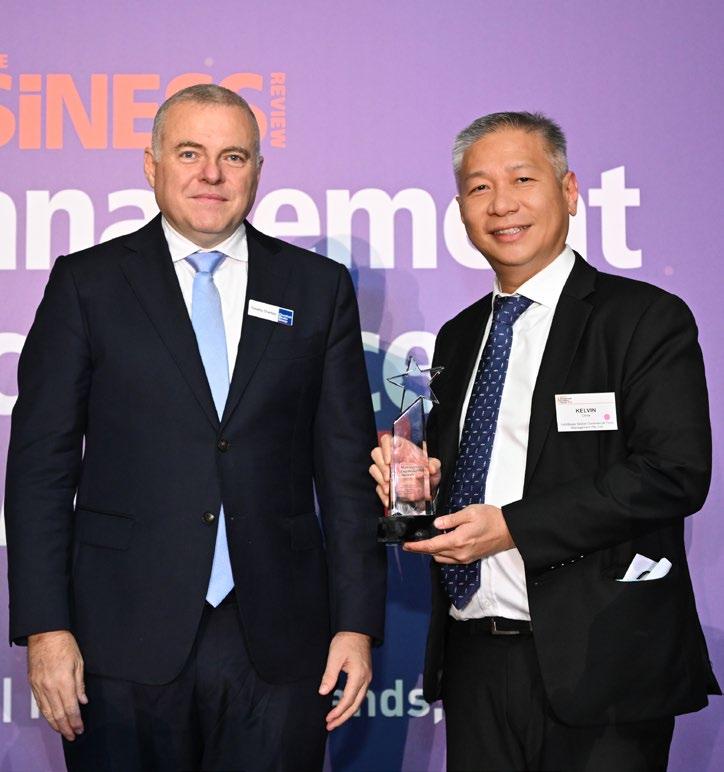
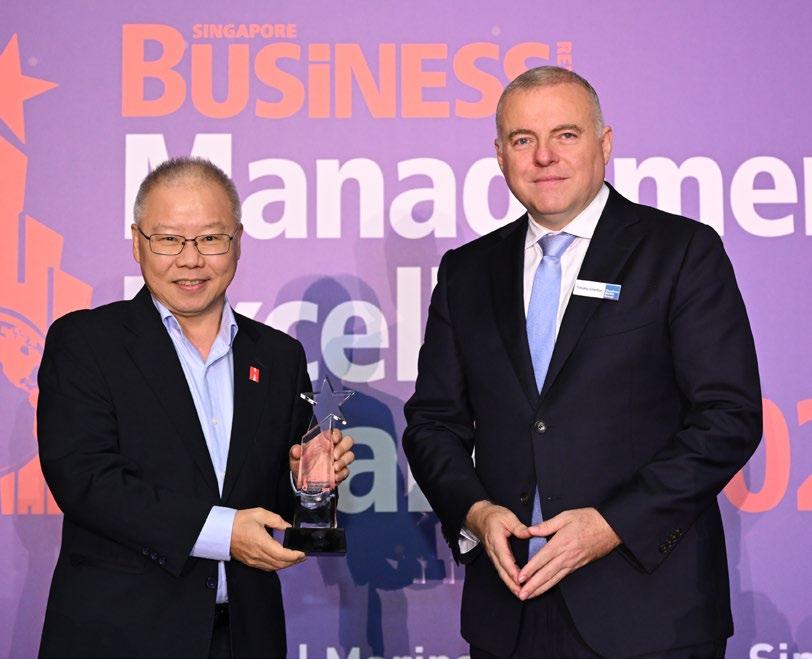
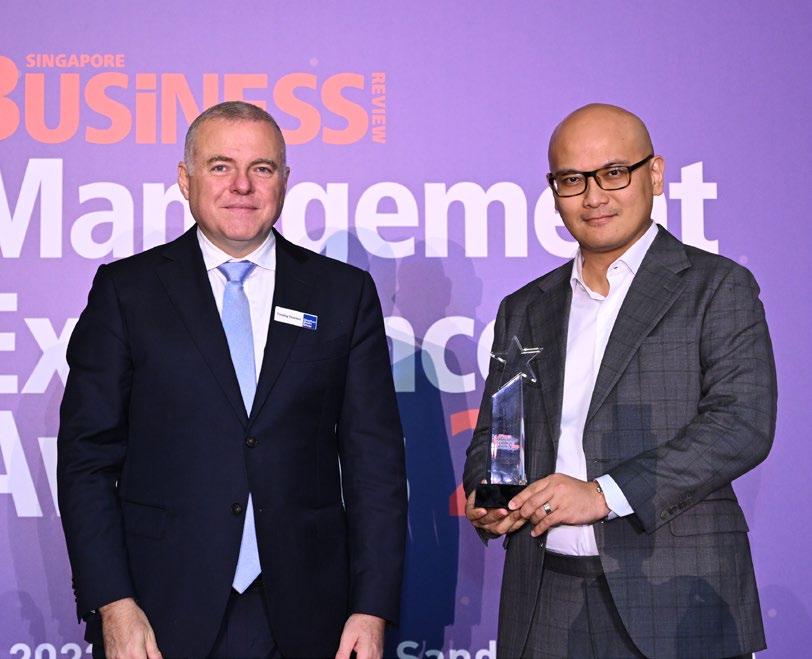
46 SINGAPORE BUSINESS REVIEW | Q2 2024
EVENT: SBR MANAGEMENT EXCELLENCE AWARDS
HSC Pipeline Engineering Pte Ltd
Digital Group
Lee Kong Chian School of Medicine (NTU)
Princeton
Pan Pacific Hotels Group
Pacific Refreshments Pte. Ltd.
National University of Singapore
Lendlease Global Commercial Trust Management Pte. Ltd.
Ivanhoé Cambridge
HSBC Life (Singapore) Pte. Ltd.
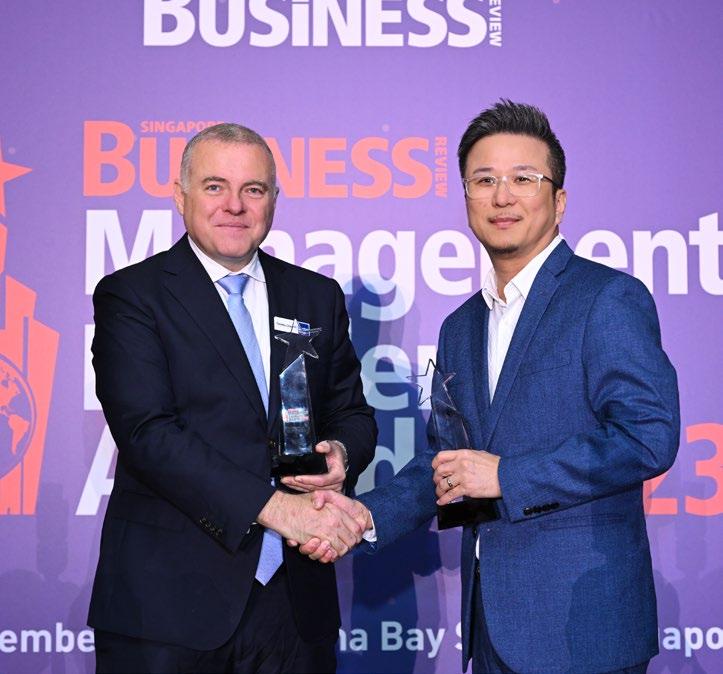
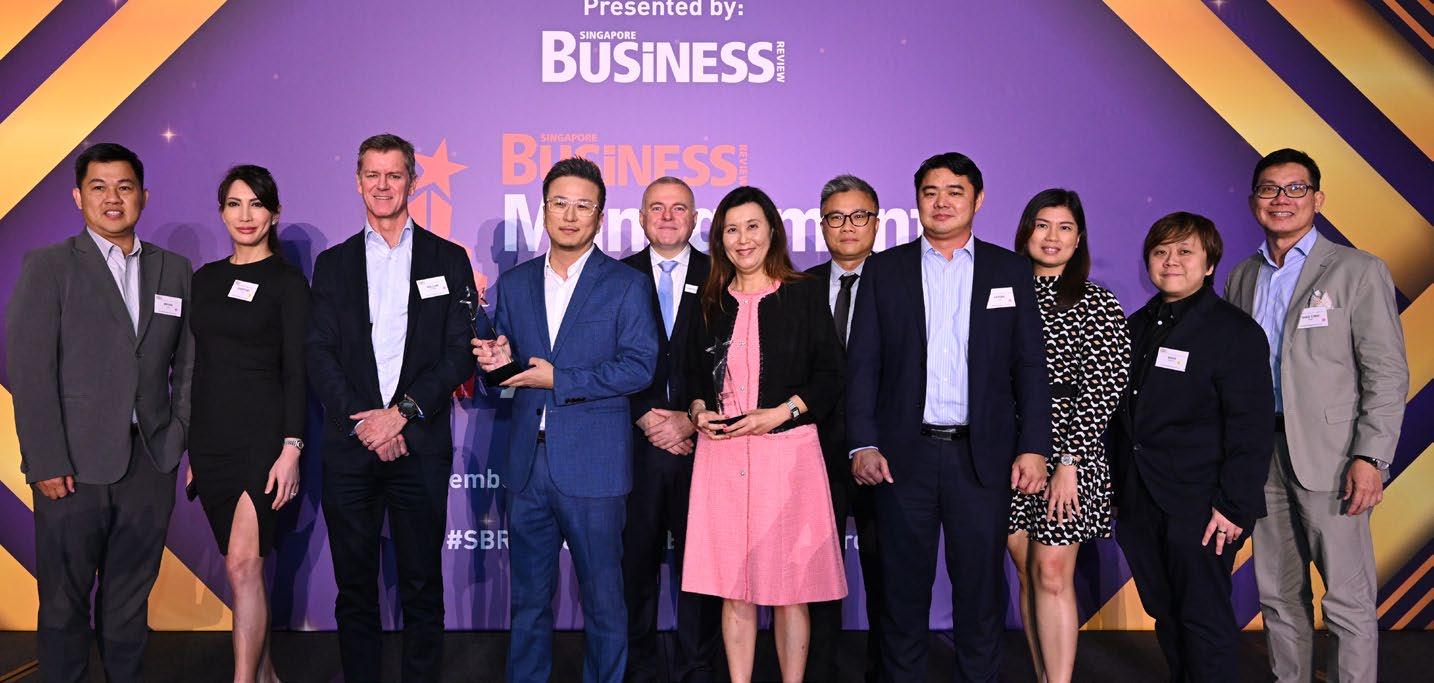
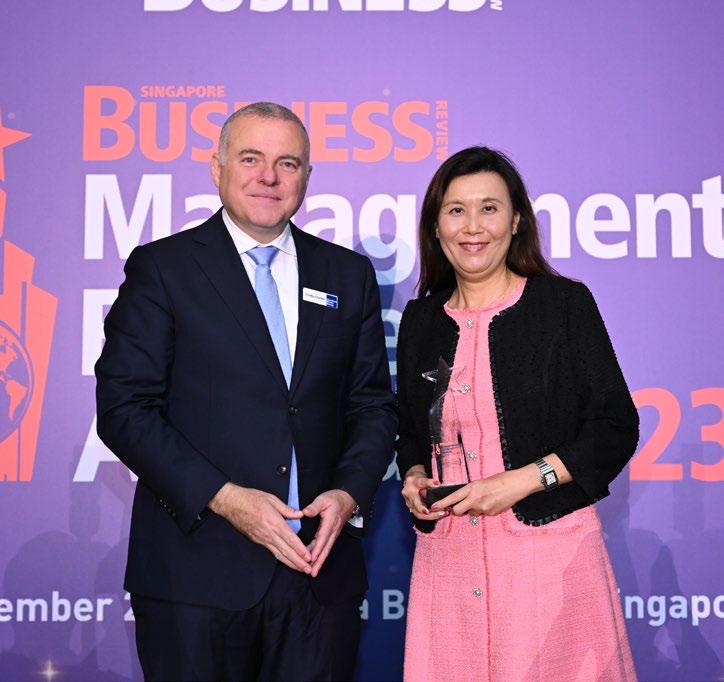
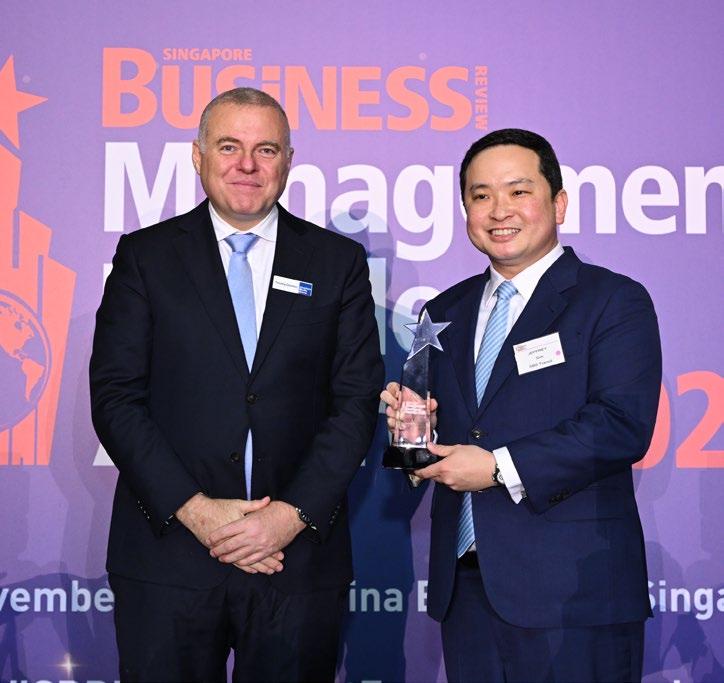

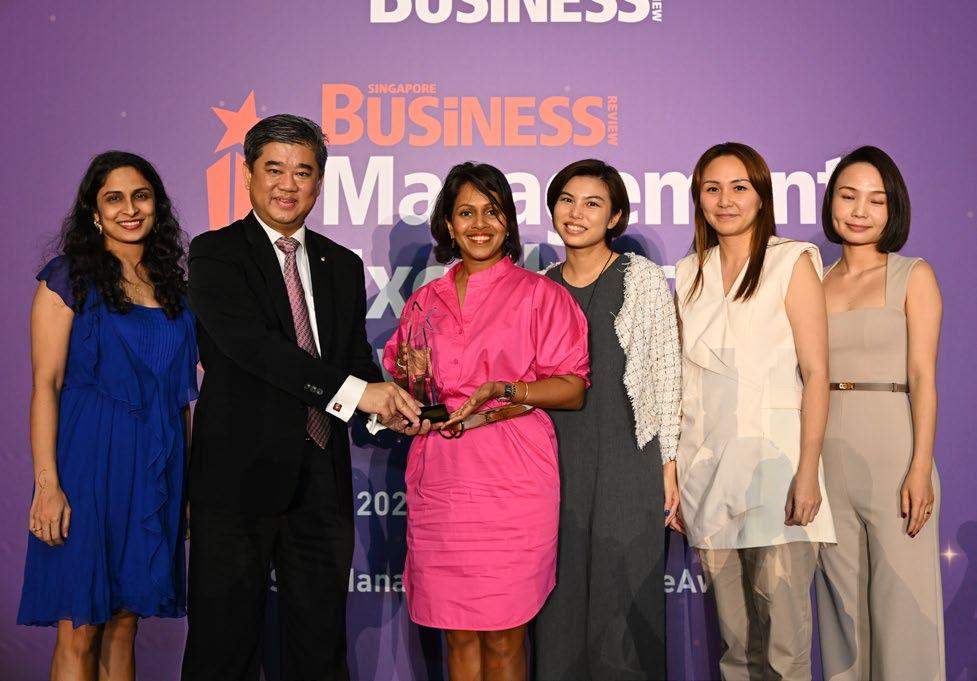

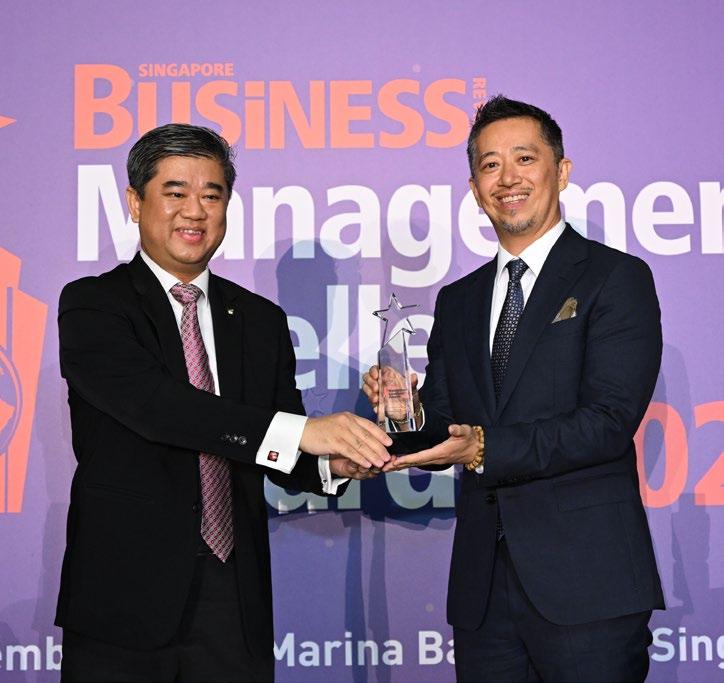

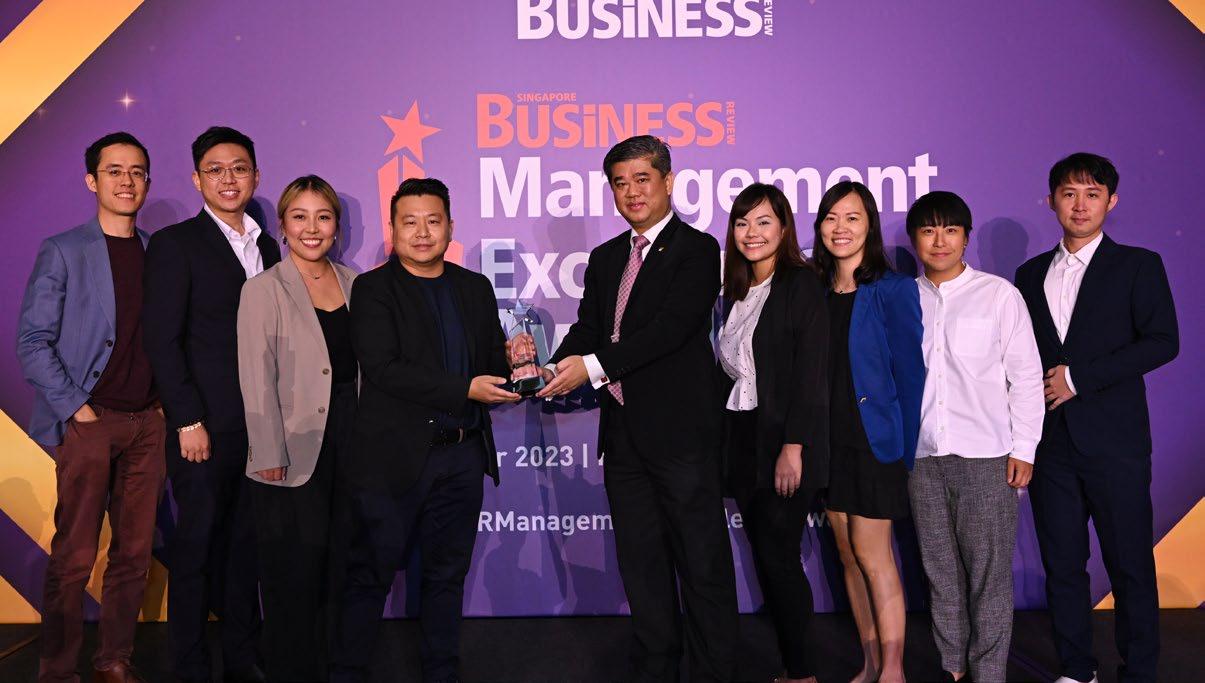
SINGAPORE BUSINESS REVIEW | Q2 2024 47 Management Excellence Awards 2023
SBS Transit
Truegenics Pte Ltd
Tata Communications
Starbucks Coffee Singapore Pte Ltd
SoftwareOne Pte Ltd
SoftServe-Singapore Pte Ltd
Savills (Singapore) Ple Ltd
Savills Property Management Pte Ltd
Savills (Singapore) Ple Ltd
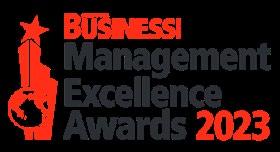
SoftwareOne: a pioneer in cloud and AI, but also an ESG leader
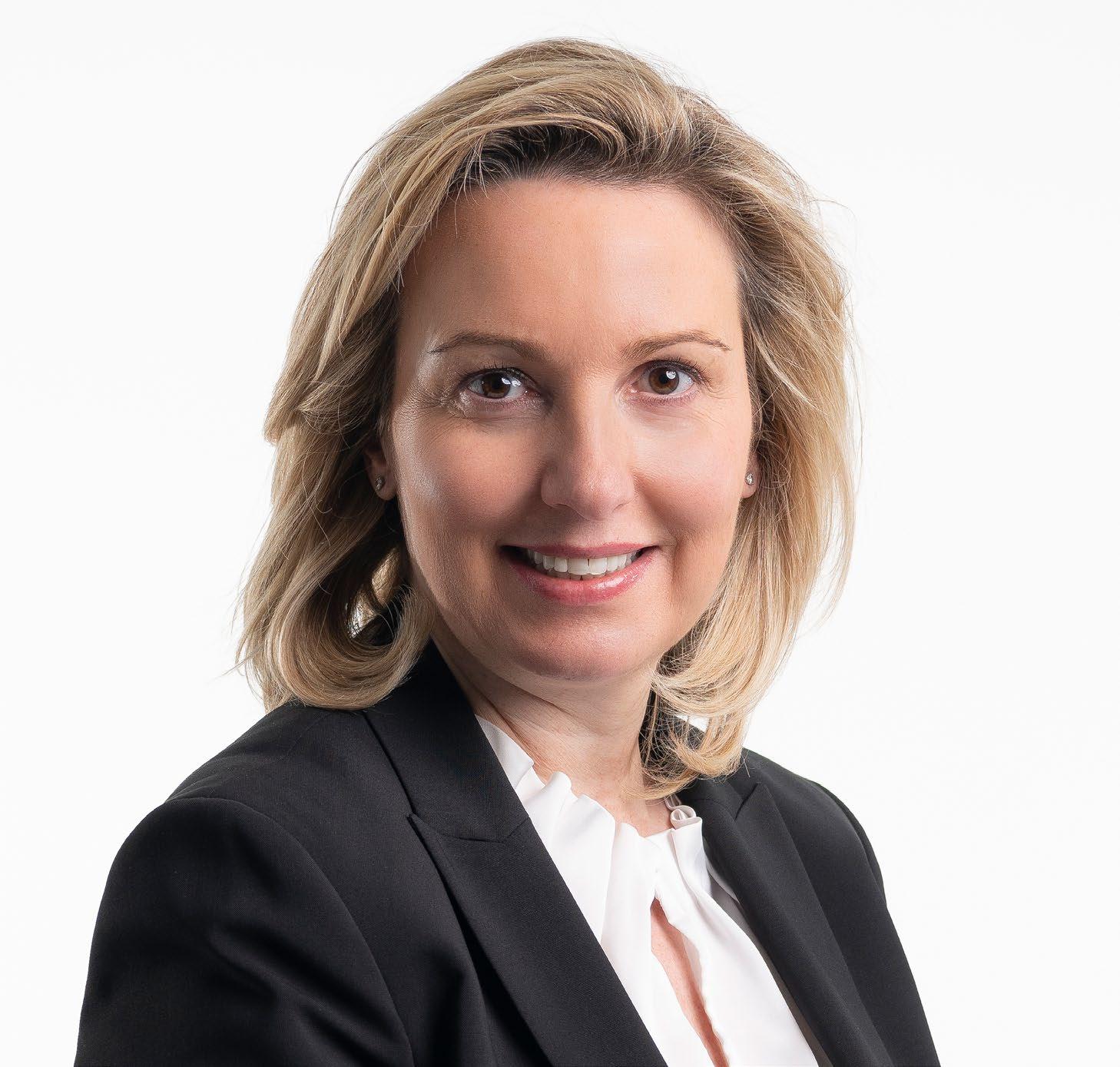
With more than 30 years of experience in helping clients maximise the value of technology, enabling more than 65,000 customers to embrace innovations such as cloud and AI, SoftwareOne also has a firm commitment to supporting its community. SBR talks to Julia Braun, Chief Human Resources Officer (CHRO), to learn more about the company’s ESG strategy, and what the subject means to her.
Ms Braun, as Chief Human Resources Officer (CHRO) of SoftwareOne, how does your commitment to enabling an international workforce pair with your commitment to environmental and social responsibility – personally speaking?
As a global company, SoftwareOne aspires to make continuous progress towards lessening our environmental impact and
positively supporting the people and communities around us. We aim to maintain a culture that is welcoming, safe and inclusive for our employees and stakeholders, which is an essential element of empowering creativity, and innovation and delivering the best possible client experience. My personal experience has taught me that giving back can have a tremendously positive impact on your overall personal and professional growth and overall well-being. Engaging in purpose-driven efforts of all kinds can boost self-esteem, increase happiness, and ultimately reduce stress. Even more so, it can provide a greater sense of fulfilment. When individuals can experience these positive effects on the lives of friends, family, coworkers, and local communities, it can be incredibly rewarding. As CHRO, I believe we must continue to empower each of our more than 9,000 employees at
SoftwareOne to contribute to creating a brighter future for all.
Why do you think the topic of social governance and sustainability is the determining topic for businesses today? Corporate social responsibility is a pressing topic for all organisations – and rightly so. The effects of climate change are apparent. Organisations and businesses worldwide are acknowledging this impact and taking comprehensive action to create a more sustainable future. Looking at the EU Taxonomy law, we see sustainability being brought to the forefront of investment decisions. Businesses of all sizes should continue to work towards meeting local and international goals, comply with progressive regulations, and design their business models with sustainability in mind.
What does this mean for the work you do at SoftwareOne?
As the global landscape grows increasingly complex, we must collectively and collaboratively work together to create a brighter and better future. For SoftwareOne, this means we recognise our responsibility to empower sustainable action. We see this as an imperative that’s not ours alone, but rather a shared commitment between our peers, partners, and clients alike. Our company culture is built around seven core values, and our ESG strategy not only holds these as part of its DNA but is embodied by two in particularPassion and Integrity.
I’ll give you an example. At our President’s Club event last year, I was proud to be part of a major effort to look after our environment, working with the DenizTemiz Derneği/ TURMEPA to clean the beaches around Istanbul. It was a humbling experience, to witness the collective passion of my colleagues to play a part in protecting our environment. I was shocked at the amount of refuse we collected, but in equal measure proud of the small part our team played in ensuring that everyone has a clean, safe beach to enjoy. This is our planet, our environment and we need to respect it. It’s an example of how SoftwareOne is
48 SINGAPORE BUSINESS REVIEW | Q2 2024
Julia Braun, Chief Human Resources Officer (CHRO) of SoftwareOne, delves into the company's ESG strategy, emphasising its alignment with environmental, social, and governance principles.
Julia Braun, Chief Human Resources Officer (CHRO) at SoftwareOne
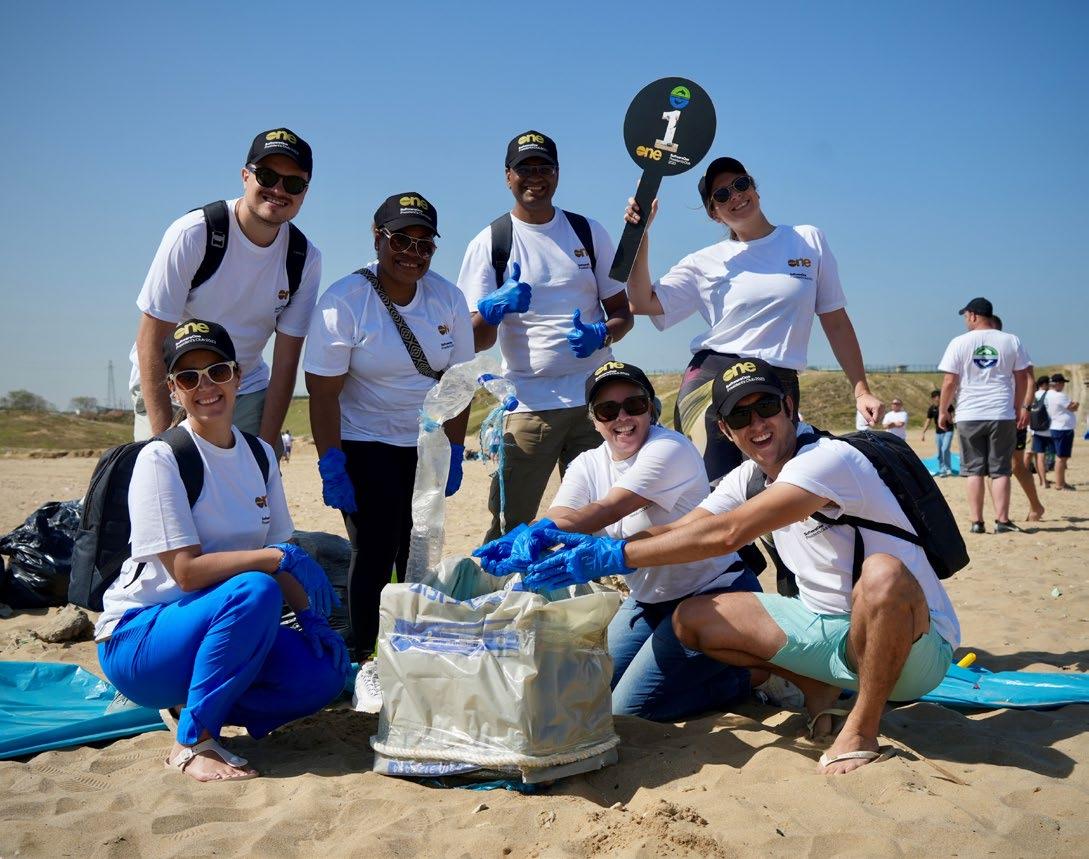
focused on our entire community.
How do you as a business tackle these challenges? Most companies pick from the UN SDGs – what’s your approach?
Our SoftwareOne ESG programme hinges on four key actions. Firstly, empowering employees worldwide to help non-government organisations by providing digital services and consultancy – enabling passionate and well-versed, but underfunded organisations, to have access to state-of-the-art technology solutions.

pillars – and has been very successful. In 2023 alone, we supported 1,228 causes, giving over $97,000 to charities.
Third, building on the UN Sustainable Development Goals, SoftwareOne focuses on developing and establishing a diverse workforce. To achieve this, we reviewed,
and implement solutions for our clients that enable and drive sustainable action. Leveraging our existing partnerships with all relevant hyperscalers worldwide, SoftwareOne is in a unique position to deploy tailor-made solutions that cover the individual needs of businesses.
SoftwareOne aspires to make continuous progress towards lessening our environmental impact and positively supporting the people and communities around us
Secondly, encouraging employees to donate to NGOs that align with their interests and communities. The “SoftwareOne Gives Back” programme was established to achieve both
analysed, and audited our current hiring process to attract diverse talent by encouraging the use of inclusive language and fair and unbiased hiring decisions.
Finally, as a technology company, we play to our strengths of leveraging the expertise of SoftwareOne to audit, select,
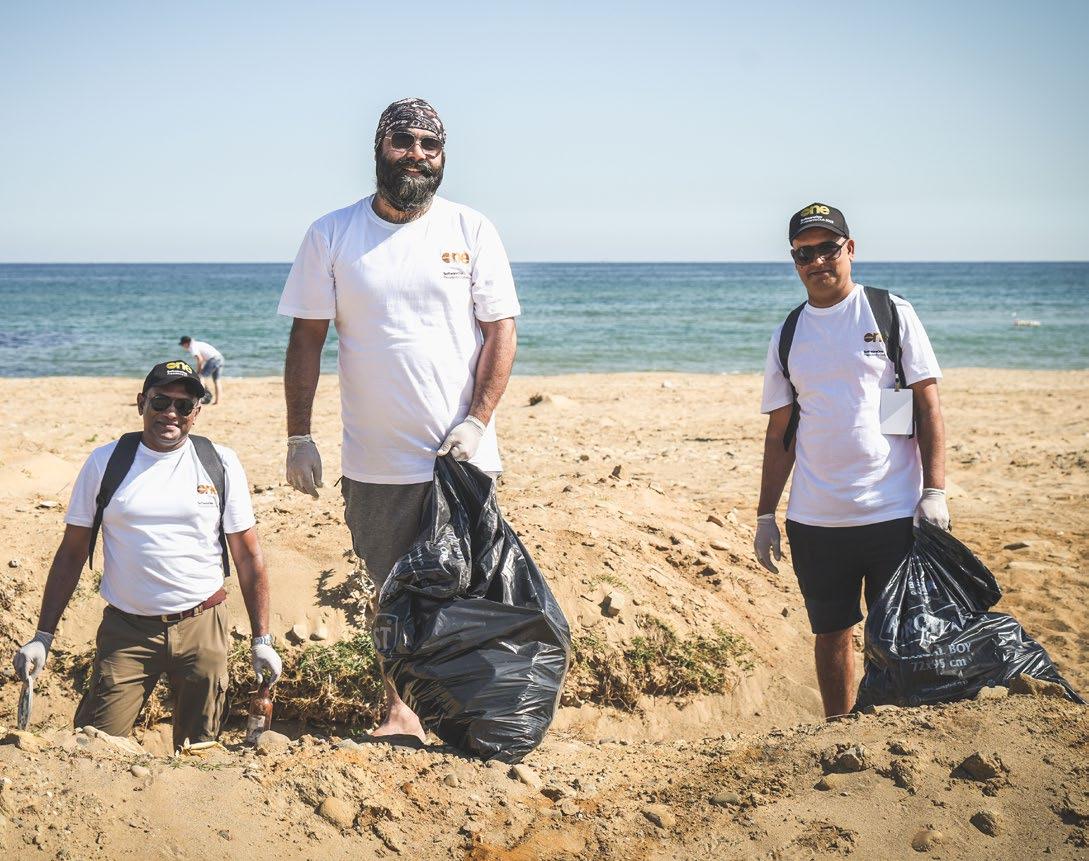
The reality for most businesses is that they have intangible knowledge of how sustainable their organisation is – or can be. Innovative cloudbased solutions are a beacon of hope to standardise and automate ESG measuring, building the base for decision-makers to act and set up a sustainable business. Whilst SoftwareOne is not perfect, we are diligently working on being the best we can be and continually evolving in this area.
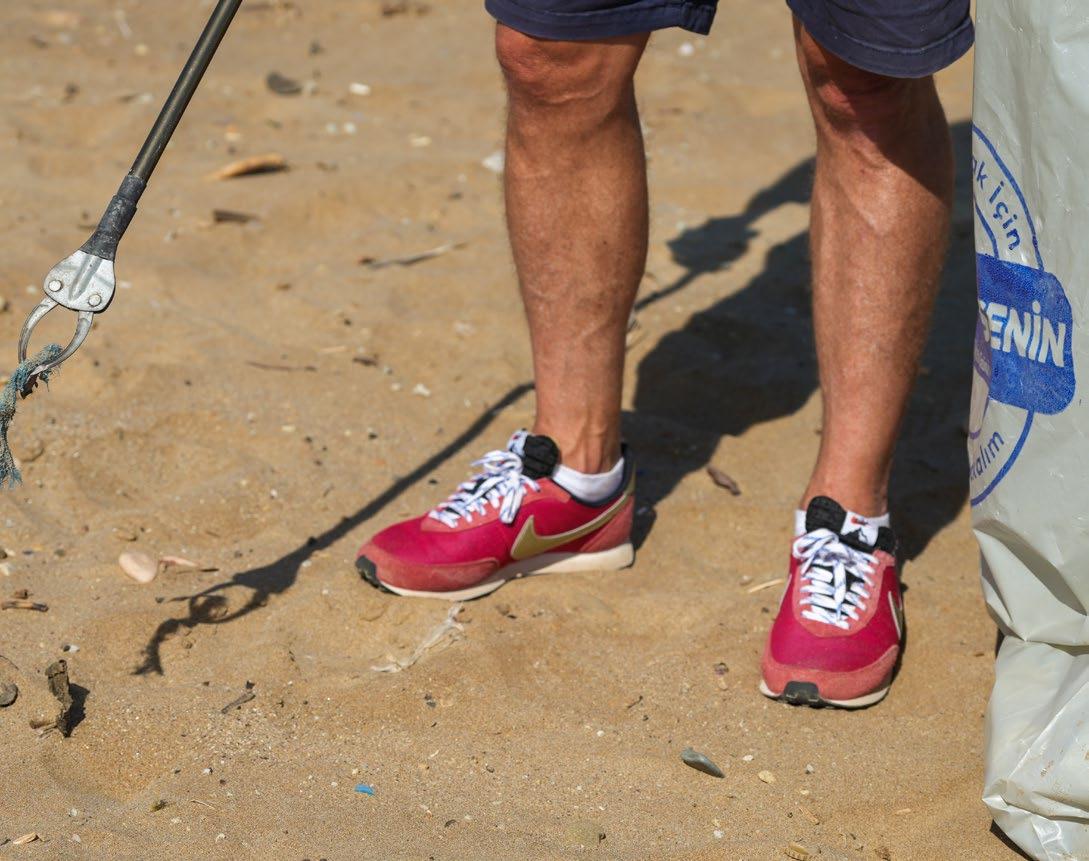
SINGAPORE BUSINESS REVIEW | Q2 2024 49
EMPLOYEE ENGAGEMENT OF THE YEAR - COMPUTER SOFTWARE TEAM OF THE YEAR - COMPUTER SOFTWARE
Beach winners Presidents Club Legacy Projects
Truegenics: Local Health Supplements Startup Surpasses $184 Million in Sales in the U.S. Market
Their journey recently culminated in a significant accolade, clinching the Team of the Year award.
Truegenics Pte Ltd, a Singapore-based e-commerce company, encompassing notable brands in the U.S. like Simple Promise, 5th & Glow, N-Labs, and 7th Manna, has emerged as a beacon of innovation and exemplary work culture.
This SBR Management Excellence Team of the Year award highlights the unique ethos and collaborative spirit that have become the hallmarks of Truegenics. As a company making bold strides in the U.S. market, having sold over USD $184 million worth of products, Truegenics stands as a paragon of how cultural diversity and inclusive work environments can pave the way for global success.
The Truegenics Work Culture
Truegenics attributes its success to a vibrant, inclusive culture, championed by CEO Alvin Huang’s belief in unity and diversity, excluding any room for ego. This philosophy permeates recruitment, development, and operations, fostering an environment where innovation and creativity are not just encouraged but celebrated.
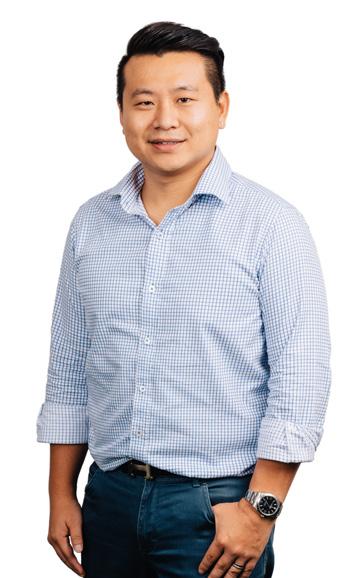
The company has nurtured this atmosphere through consistent team-building retreats, weekly updates from the CEO, and monthly informal gatherings. “We believe in providing the infrastructure to support multiple touch points between different team members to cultivate stronger personal bonds and better working relationships,” shares HR Manager, Hidayah. This conducive environment is reflected in the impressive average length of service, which stands at approximately 3.5 years, signalling high employee satisfaction and loyalty.
Suliza, a 10-year veteran at Truegenics, shares, “Working here pushes me to grow past my boundaries in a good way,” crediting her growth to supportive leadership, a vibrant environment, and work-life balance.
A prime example of great teamwork in action is the remarkable output achieved by our cross-functional teams. Since 2021, these
dedicated groups have been pivotal in increasing Truegenic’s product launches from the usual two per year to an impressive range of eight to ten new products annually.
This surge in new product introductions has significantly expanded their footprint in their target markets, enhancing their ability to penetrate deeper into their desired demographic.
Overcoming Challenges
The road to success, however, was paved with challenges. For Truegenics, expanding into the U.S. e-commerce market meant navigating unfamiliar terrain, filled with cultural, logistical, and regulatory complexities. The company tackled these challenges head-on, turning potential setbacks into opportunities for growth.
“Adapting to different time zones required us to be more flexible and creative in our communication and project management,” explains Julius Yap, Senior Manager for Customer Service and Supply Chain. This adaptability became a core strength, enabling the team to work efficiently across borders
Thriving in the U.S. Market
Truegenics’ success in the U.S. market is a testament to its strategic vision and understanding of global commerce. The company’s approach was multifaceted – involving thorough market research, building strong local
partnerships, and continuously adapting its offerings to resonate with U.S. consumers.
Together with Kayti Doolittle, our Head of Copy and Product Development, who is based in the States, Truegenics embraced this challenge, continuously learning and evolving its strategies to align with market needs. This perseverance paid off, resulting in significant breakthroughs and a robust foothold in the competitive U.S. market.
“We knew we couldn’t just replicate the usual Singaporean strategies; we needed a tailored approach,” notes Ryan Pua, Affiliate Sales Manager . This calculated strategy was not just about altering products; it encompassed marketing, customer service, and even the nuances of digital engagement.
Truegenics’ efforts have clearly paid off, as it has distinguished itself in the U.S. e-commerce scene through a unique blend of Singaporean operational excellence and adaptability to American preferences.
Onward & Forward
Truegenics’ rise from a Singaporean startup to making impactful strides in the U.S. e-commerce market exemplifies vision, teamwork, and resilience. Celebrated with the 2023 SBR Management Excellence Team of the Year award, Truegenics is now focused on harnessing AI to elevate its operations and marketing for future successes.
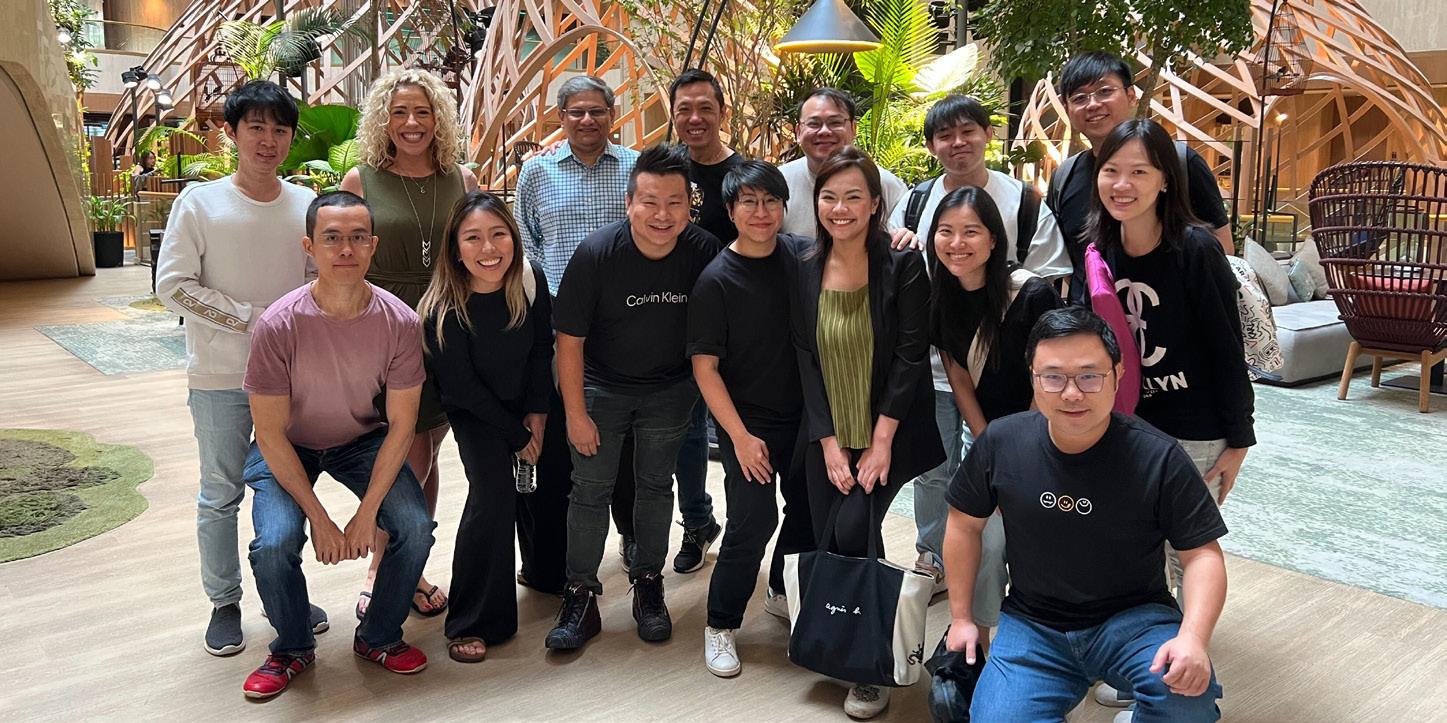
Post-Quarterly
“At Truegenics, I feel empowered to bring my ideas to the table right from Day 1, no matter how unconventional they may be.”
—Yong Heng, Team Lead, Conversion Optimization
50 SINGAPORE BUSINESS REVIEW | Q2 2024
TEAM OF THE YEAR - CONSUMER PRODUCTS - NON-DURABLES
Truegenics’ Management Team:
Business Review Meeting
Alvin Huang CEO of Truegenics
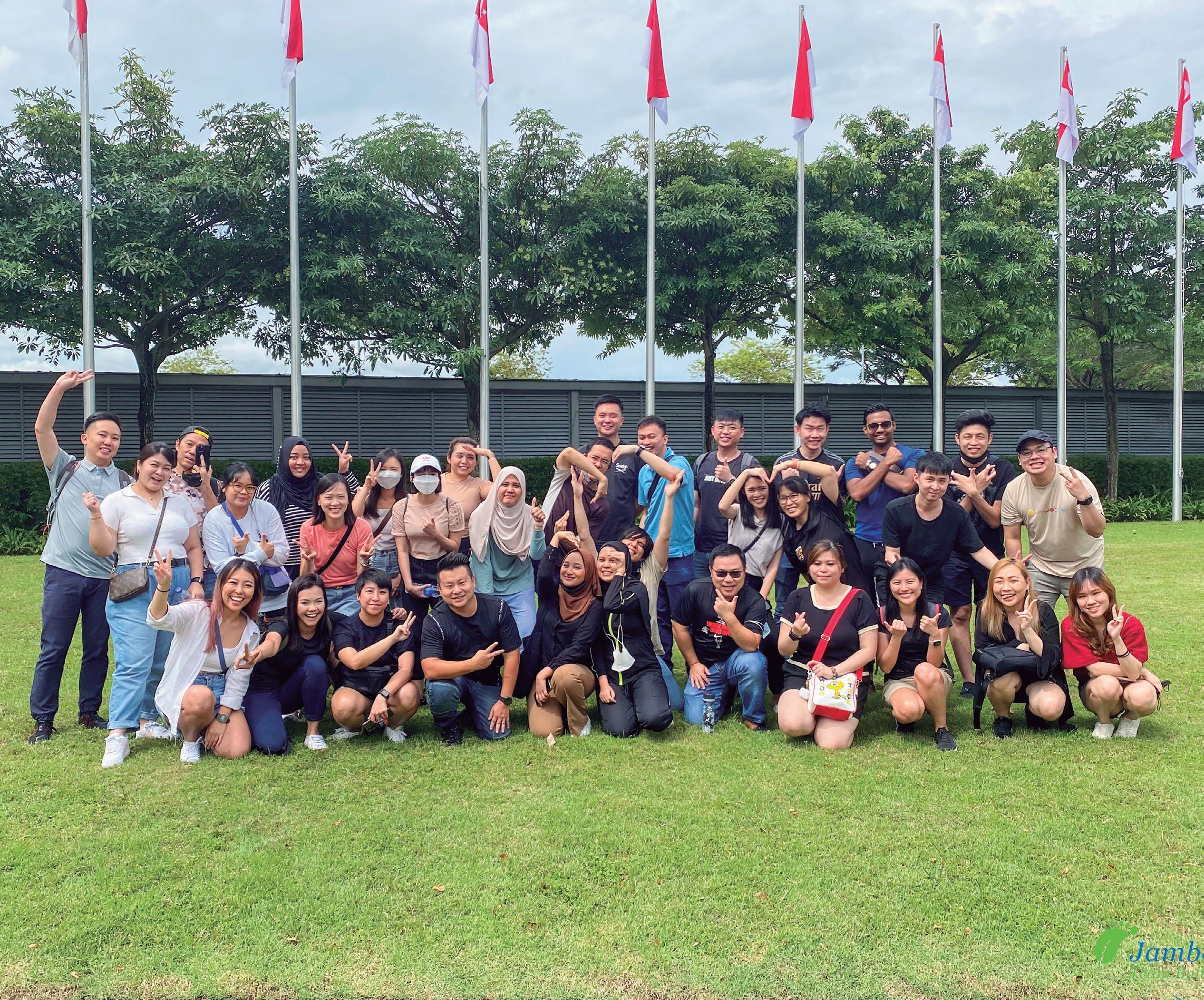

SINGAPORE BUSINESS REVIEW | Q2 2024 51 We’re
Embark
Revolutionize the E-Commerce Landscape in the Health Sector with Truegenics JOIN OUR TEAM Fuel Progress. Cultivate Success. 190 Middle Road, #18-07, Singapore 188979 www.truegenics.com +65 6568 3842 news@truegenics.com
always seeking experts in digital marketing/e-commerce who are ready to make an impact and thrive in a dynamic, purpose-driven environment.
on a career matched with a collaborative culture of support, and fun at truegenics.com/careers.

Driving Innovation with Generative AI
By AndrewTan,EnterpriseSolutionLead,SoftServeAPAC

Generative Artificial Intelligence (GenAI) is poised to dominate executive agendas in 2024, with leaders expecting it to catalyse innovation, streamline operations, and create new competitive advantages. The Boston Consulting Group (BCG) found that almost 90% of executives surveyed rank AI and GenAI as a top-three priority for 2024, with 85% planning to increase spending on AI and GenAI this year. The transformational potential of GenAI, akin to the seismic shift brought about by the internet three decades ago, stems from GenAI’s ability to “create” novel ideas, content, and solutions across different mediums by synthesising content from a vast body of training data and other sources.
Importantly, realising GenAI's full potential goes beyond the mere deployment of piecemeal technological tools. It necessitates a holistic approach encompassing crossdisciplinary thinking, strategic foresight, multifaceted technical expertise, and a network of strategic partners to navigate the rapidly evolving GenAI space.
Embarking on a GenAI-Driven Transformation Journey
GenAI is set to revolutionise our approach to problem-solving and both creative and repetitive tasks. Opportunities lie in solving complex challenges such as drug discovery
and protein synthesis to more ubiquitous tasks like enterprise search tools, coding, report automation, and content generation for marketing and sales. Identifying and leveraging these opportunities requires a blend of internal expertise across various domains and external collaborations to understand the vast possibilities, and an environment of continuous hypothesis testing, prioritisation, and experimentation to unlock tangible value.
Establishing the GenAI Infrastructure
The technological landscape for GenAI is rapidly advancing, marked by the introduction of new large language models, GPU-based tools, and interfaces practically every month. Keeping up with the latest technology –often both open and closed-source – is a big challenge. Yet, these technologies represent just one facet of deriving value from GenAI across its end-to-end lifecycle. Other critical components include data governance, IT infrastructure, and integration with existing systems. Effective data governance (including ensuring data quality, security and privacy), scalable and reproducible IT configurations, and seamless integration into current workflows are key to the successful
deployment and monitoring of GenAI solutions, and will also enable organisations to measure impact and refine strategies iteratively.
At SoftServe, we understand the multifaceted nature of GenAI implementations and advocate a comprehensive approach that ensures executive alignment and cross-functional collaboration along with the right technical talent. Our legacy of fostering technological innovation and strategic transformation equips us to lead businesses through the GenAI maze with a focus on ethical practices and long-term success.
Transitioning from Prototype to Production
Today, many clients that we work with are navigating the process of use case identification, prototype building, and subsequent transition to full-scale production. The latter phase often takes at least two to three times longer than expected because of governance and ethical considerations, including data privacy and accurate outputs that are free of hallucination. These challenges are more acute for GenAI than other AI solutions, as GenAI-generated content is inherently more “creative” - hence requiring special guardrails and responsible AI approaches to be implemented alongside. Navigating these challenges requires a balanced approach to risk management that is also practical, and guided by suitable frameworks such as the Infocomm and Media Development Authority (IMDA)’s Model AI Governance Framework for Generative AI.
Cultivating Strategic Partnerships for GenAI Advancement
The monumental opportunity that GenAI presents for innovation and efficiency cannot be ignored. Adopting a holistic, strategic approach will allow organisations to navigate complexity, reduce risk, and become leaders in their industry in capturing value from GenAI. SoftServe partners organisations throughout this journey, guiding businesses with our expertise, vision, and commitment to ethical and effective end-to-end GenAI deployment.
GenAI is set to revolutionise our approach to problem-solving and both creative and repetitive tasks
52 SINGAPORE BUSINESS REVIEW | Q2 2024
EXECUTIVE OF THE YEAR - TECHNOLOGY
Andrew Tan, Enterprise Solution Lead, SoftServe APAC





































































































REVOLUTIONIZE YOUR OPERATIONS WITH SOFTSERVE'S GENERATIVE AI
In an era where digital innovation defines market leadership, SoftServe stands at the forefront, pioneering the integration of Generative AI across industries. Our bespoke AI solutions are not just about technology; they're about transforming your business to lead in the digital age.



GEN AI FOR BANKING & FINANCE
GEN AI FOR MANUFACTURING




Redefining Possibilities
Risk Management: Leverage AI to predict and mitigate risks in real-time, enhancing decision-making and operational resilience.
Customer Experience: Deploy sophisticated chatbots and personalized services, turning every interaction into an opportunity to impress.
Operational Efficiency: Automate processes, from credit scoring to compliance checks, reducing costs and freeing your team to focus on strategic initiatives.
Driving Innovation & efficiency



Supply Chain Optimization: Predictive analytics for demand forecasting and inventory management, ensuring you stay ahead of market dynamics.
Quality Control: Advanced vision systems and anomaly detection tools to maintain impeccable product standards.
Sustainable Operations: AI-driven insights to optimize energy use and reduce waste, aligning profitability with environmental responsibility.
WHY SOFTSERVE?
Expertise: Decades of experience blended with cutting-edge innovation.
Customized Solutions: Tailored strategies that align with your specific business needs.
Global Impact: A trusted partner for leading firms around the world, driving digital transformation.
JOIN


































SINGAPORE BUSINESS REVIEW | Q2 2024
THE LEADERS. EMBRACE THE DIGITAL TRANSFORMATION WITH SOFTSERVE. SCAN THE QR CODES ABOVE TO FIND OUT HOW.




CDP is a not-for-profit charity that runs the global disclosure system for investors, companies, cities, states, and regions to manage their environmental impacts.
The Asia Pacific region, responsible for over 50% of global greenhouse gas emissions, plays a critical role in combating climate change and nature loss.
A record 8,000 companies in Asia disclosed their environmental data through CDP in 2023, an increase of over 170% since 2020. These corporate, investor, and city disclosures are vital for averting extreme environmental impacts.



Lendlease Global Commercial REIT Tops Global Ranking for Sustainability
Lendlease Global Commercial REIT clinched the top spot as Global and Regional Sector Leader (Retail) in GRESB ranking, achieving the highest score among peers and scored the highest-tier 5 stars rating for its ESG performance and strong leadership in sustainability. In addition, it scored “A” for Public Disclosure, demonstrating its commitment to continually improve its performance in ESG transparency and stakeholder engagement. Its assets in Singapore, Jem and 313@somerset, and three Grade A office buildings in Milan are awarded BCA Green Mark (Platinum) and LEED Gold certification, respectively. Lendlease Global Commercial REIT was also the first Singapore REIT to achieve Net Zero Carbon in 2022.
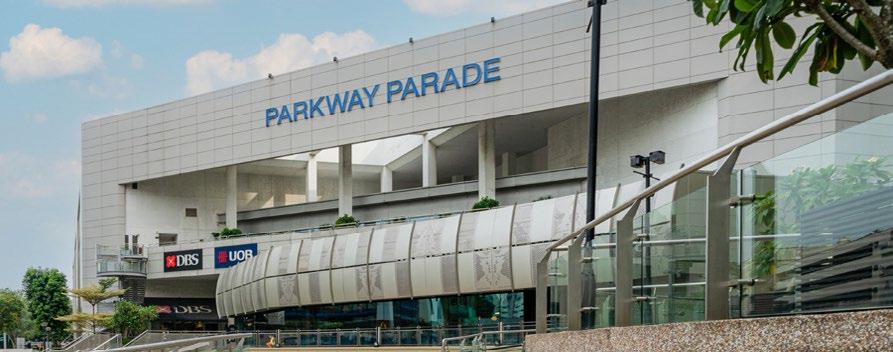











SINGAPORE BUSINESS REVIEW | Q2 2024 55
Jem, Singapore 313@somerset, Singapore
Three Grade A office buildings, Milan
LREIT holds 10.0% interest in Parkway Parade Partnership Pte Ltd, which indirectly holds 77.09% of the share value in Parkway Parade. Scan here
view LREIT’s factsheet
Improved score to 95 points (from 94.8 in 2022) on the Singapore Governance and Transparency Index 2023
to

Map the Underground, One Pipe at a Time
Pseudonyms are used instead of actual names and places in this article for data protection.
When plans were made to connect a new mixed development to the grid, an underground service tunnel across a five-lane carriageway was required. The Developer was no stranger to the task, but when confirming what other pipes and utilities the tunnel had to pass under, trouble struck. According to records, there were nine existing services underground – the Developer found eight. Over many weeks, sections of the road were closed and trial holes were dug across the major roadway. However, the location of the ninth pipe could not be visually confirmed. The tunnel would not be approved and construction catastrophically delayed, at this rate.
HSC Pipeline Engineering was approached to solve this issue. Led by their Managing Director, Shane Shi Hong Sheng, the team at HSC began their subsurface utility forensics. Subsurface utility mapping has gone largely unregulated in the world in the past century, but with 30 years of industry experience here in Singapore, HSC had a grasp of major infrastructure changes in the vicinity of the Developer’s project site. In particular, the carriageway was diverted several years ago to enable deep tunnelling works for a new underground subway line.
Uncovering Hidden Utilities
When the carriageway was moved back to its original location, no survey was undertaken to update the existing subsurface utility map. However, the slope of the roadway had changed, and given the increased amount of material used to re-lay the road, HSC formulated the hypothesis that the ninth pipe is now buried deeper than before, and one of the other eight existing utilities was laid above it in the new “space” that became available since the completion of the subway line. Trial holes expose existing utilities underground, but digging past the first uncovered utility risks damaging it and is incredibly dangerous. The Developer needed more evidence before they could justify a deep dig. HSC took to the field with conventional detection equipment to confirm the location of the first eight utilities, corroborating the Developer’s original findings. Then, HSC went a step further and deployed its advanced detection solution – a ground-penetrating radar array that non-destructively scans the underground for objects. Canvasing the entire roadway, HSC collected data to reproduce the area’s underground tomography up to a depth of three meters.
Strategic Discovery Averts Construction Crisis
Equipped with this information, HSC located the nearest ground-level valve that is known to connect to the ninth pipe and traced it all the way back to the Developer’s project site. HSC’s hypothesis proved true when the ground penetrating radar data showed that the missing pipe travelled into the carriageway and dipped below another buried utility, effectively obscuring it from anyone who did not know what to look for.
HSC advised the Developer on the best location for a trial hole to visually confirm the ninth pipe, and within the week all existing buried utilities were accounted for. Had the Developer proceeded prematurely, their service tunnel would have struck this ninth “missing” utility. The information provided by HSC enabled them to adjust their planned works and still keep to their development schedule.
Combining traditional techniques and innovative new technology, HSC is committed to making operations in civil construction smarter for all. HSC is heartened to receive twofold recognition from the Singapore Business Review Management Excellence Awards 2023 – Executive of the Year, and Team of the Year.
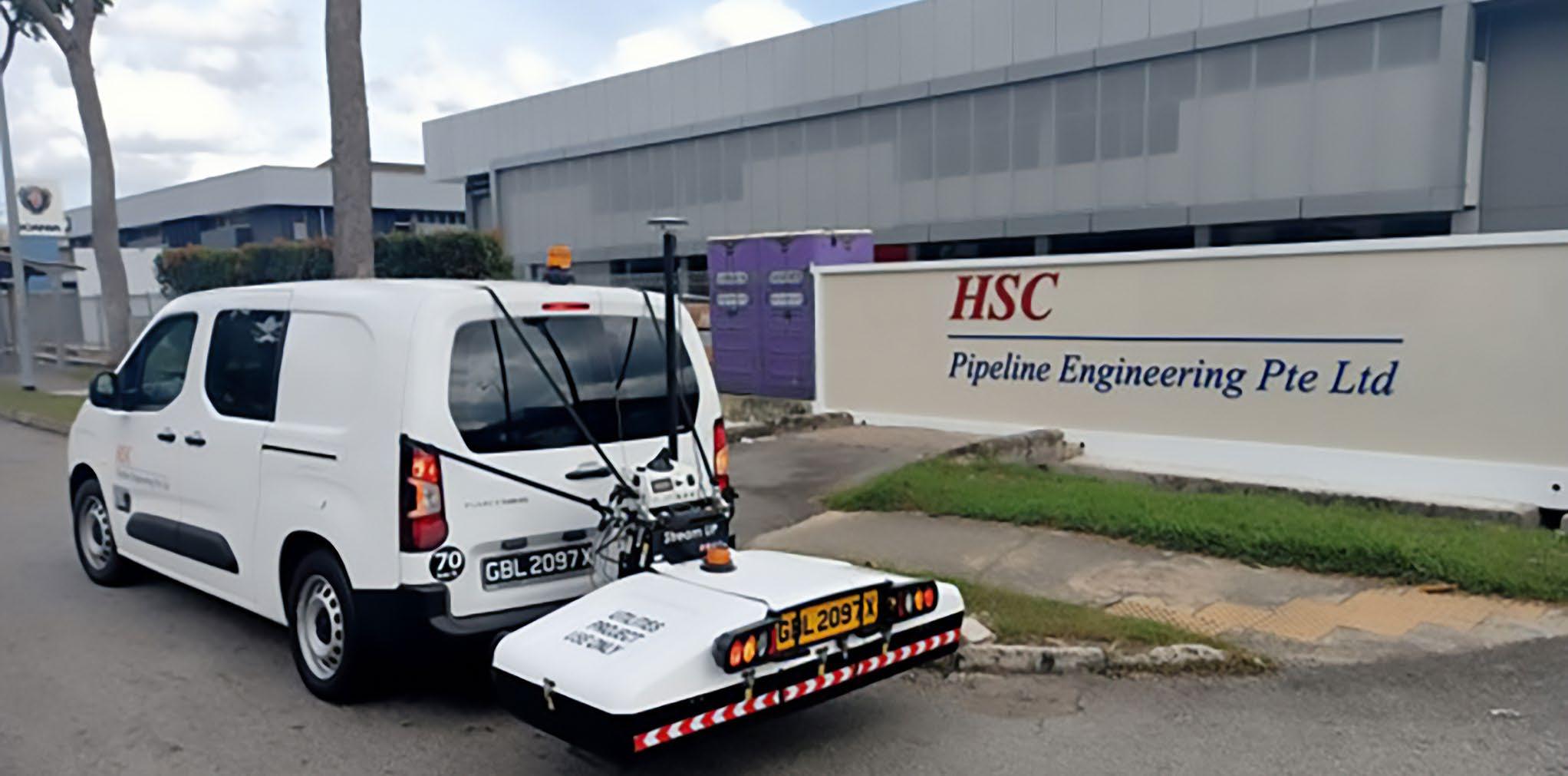
56 SINGAPORE BUSINESS REVIEW | Q2 2024
Combining traditional techniques and innovative new technology, HSC is committed to making operations in civil construction smarter for all Vehicle Mounted Multi Channel Ground Penetrating Radar
EXECUTIVE OF THE YEAR - HEAVY CIVIL CONSTRUCTION TEAM OF THE YEAR - HEAVY CIVIL CONSTRUCTION
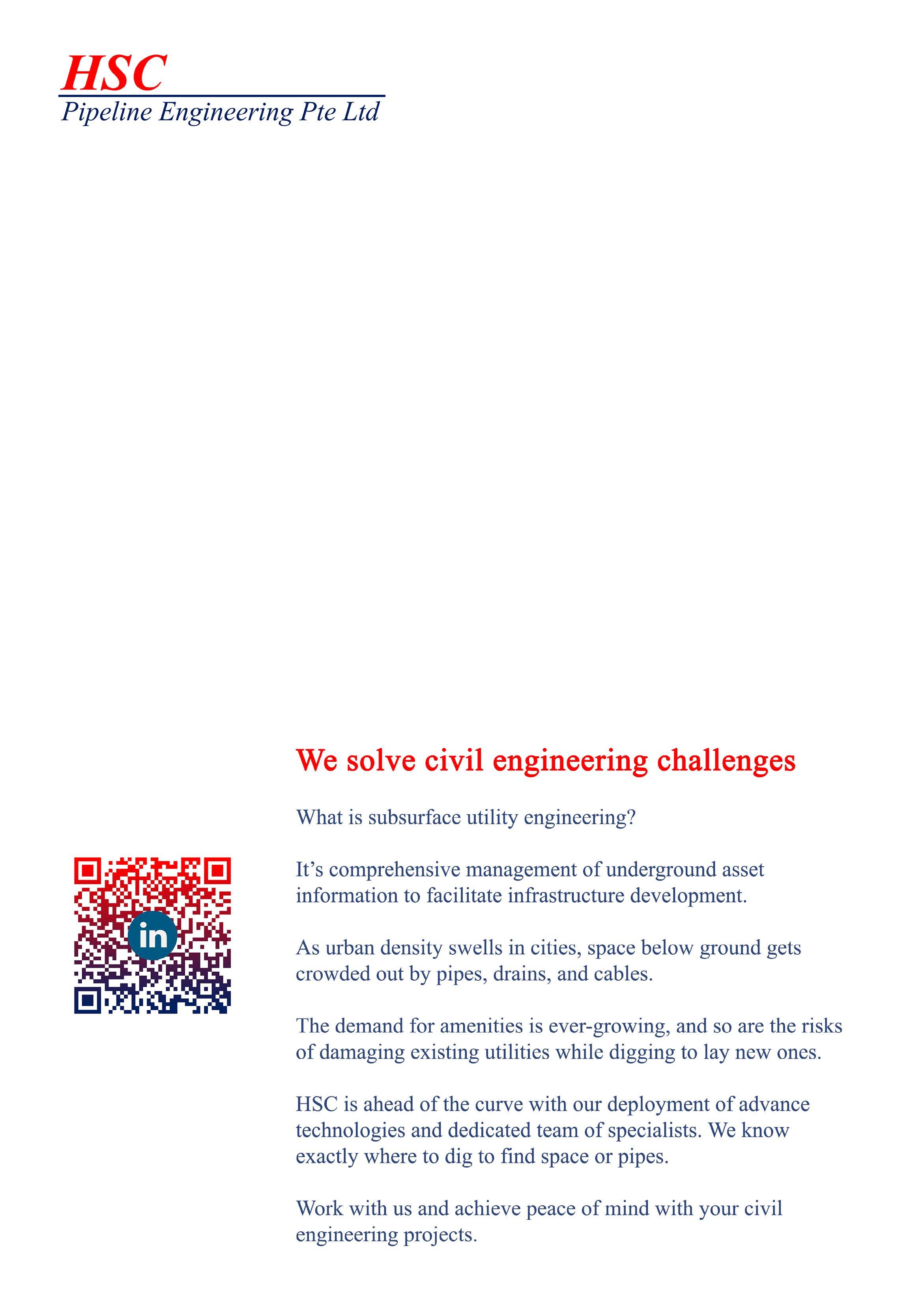


Building decarbonisation: an essential approach to value creation
By Josephine Yip, Vice-President, Investments and Asset Management, APAC, and Xuchao Wu, Manager, Sustainable Investment, APAC, at Ivanhoé Cambridge
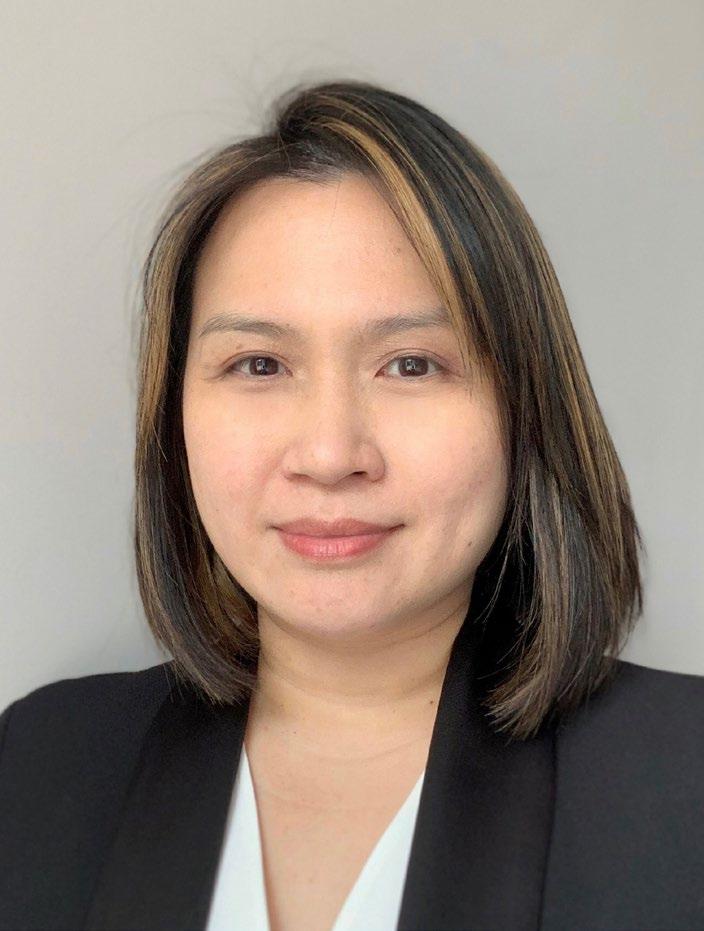
The world has embarked on a profound climate and environmental transition. Real estate is no exception to this groundswell. Our industry accounts for nearly 40% of global greenhouse gas emissions. More importantly, 80% of existing buildings in urban centres will need to be retrofitted to achieve alignment with the Paris Agreement 1.5°C pathway. Given the urgency, the status quo is clearly no longer an option and the required upgrades to the existing real estate stock will certainly have an impact on asset valuations.
Decarbonisation is key.
Currently, there are two major trends affecting real estate. First, the price of carbon. Due to a lack of standardisation and global regulations, only 30% of global carbon emissions are covered by carbon pricing worldwide. Secondly, we are seeing a re-pricing of assets – through green premiums and brown discounts. Not only is it increasingly profitable to be green, it costs more and more to be brown. Failure to act will put existing properties at financial risk. If we do nothing, the result may well be higher operational losses and costs and higher vacancies.
Valuations and cash flows from our assets could also be impaired over time. All these elements demonstrate that we urgently need to decarbonise our buildings to avoid the risk of obsolescence.
Across the Asia-Pacific (APAC) region, we have already started developing and rolling out decarbonization plans for our key assets, incorporating currently available measures and options in energy efficiency. Renewable energy has become one of the key decarbonization drivers for the APAC portfolio, and good progress has been made in the past few years. The focus has been on the wider adoption of renewable energy and more mechanisms for accessing renewable energy sources. For example, we include onsite rooftop solar on our Younghusband property in Melbourne, a 120-year building. Furthermore, Moorebank Logistics Park, based in Sydney, will have the largest solar array in the southern hemisphere. Offsite green power procurement is more feasible for commercial buildings with limited clear roof space. Discovery – our tech office portfolio in India managed by our partner Mapletree – and Neovantage –our life science portfolio in India managed by Lighthouse Canton – are both getting renewable energy through this means.
A Green IRR approach.
We are also establishing a “brown-to-green” investment strategy that aims to renovate existing assets and significantly reduce their carbon intensity. This approach represents an investment opportunity that extends the useful life of buildings, bringing them in line with the future expectations of investors, tenants and regulatory authorities.
To complement and enable this strategy, we have developed an internal indicator called Green IRR (or Green Internal Rate of Return) that puts a value on carbon-related risks and opportunities. Currently, asset valuations rarely reflect carbon performance, which can lead to asset mispricing. We have therefore chosen to be proactive by integrating a carbon value and green premium / brown discount into our financial modelling. This Green IRR metric

offers a more comprehensive assessment of the financial outcomes associated with sustainability-related expenditure.
Since its launch last year, we have seen a lot of interest from capital partners and industry bodies in the APAC region who are keen to know more about the methodology and implementation plan, with a view to developing a similar approach for themselves or even an industry standard.
Alignment of interests.
We strive to deploy capital with counterparties that are aligned with our ESG agenda in the medium and long run. We must see a broader picture because investments in certain ESG initiatives may generate a higher return over the long term. To create an alignment of interest, we are pleased to have agreed on a green promotion – a structure that includes ESG and carbon targets alongside financial ones – with one of our Australian partners. This green promotion incentivises the partner to exceed the targeted ESG performance and imposes a penalty if targets are unmet. Discussions with other managers are underway to have some similar promotion structures in place.
We are establishing a “brown-to-green” investment strategy that aims to renovate existing assets and significantly reduce their carbon intensity
58 SINGAPORE BUSINESS REVIEW | Q2 2024
Josephine Yip, Vice-President, Investments and Asset Management, APAC at Ivanhoé Cambridge
EXECUTIVE OF THE YEAR - REAL ESTATE
1Source : JLL « Decarbonizing Cities and Real Estate », may 2022
Xuchao Wu, Manager, Sustainable Investment, APAC at Ivanhoé Cambridge

Invaluable. Black & Veatch won the Team of the Year — Energy in the SBR Management Excellence Awards 2023 bv.com
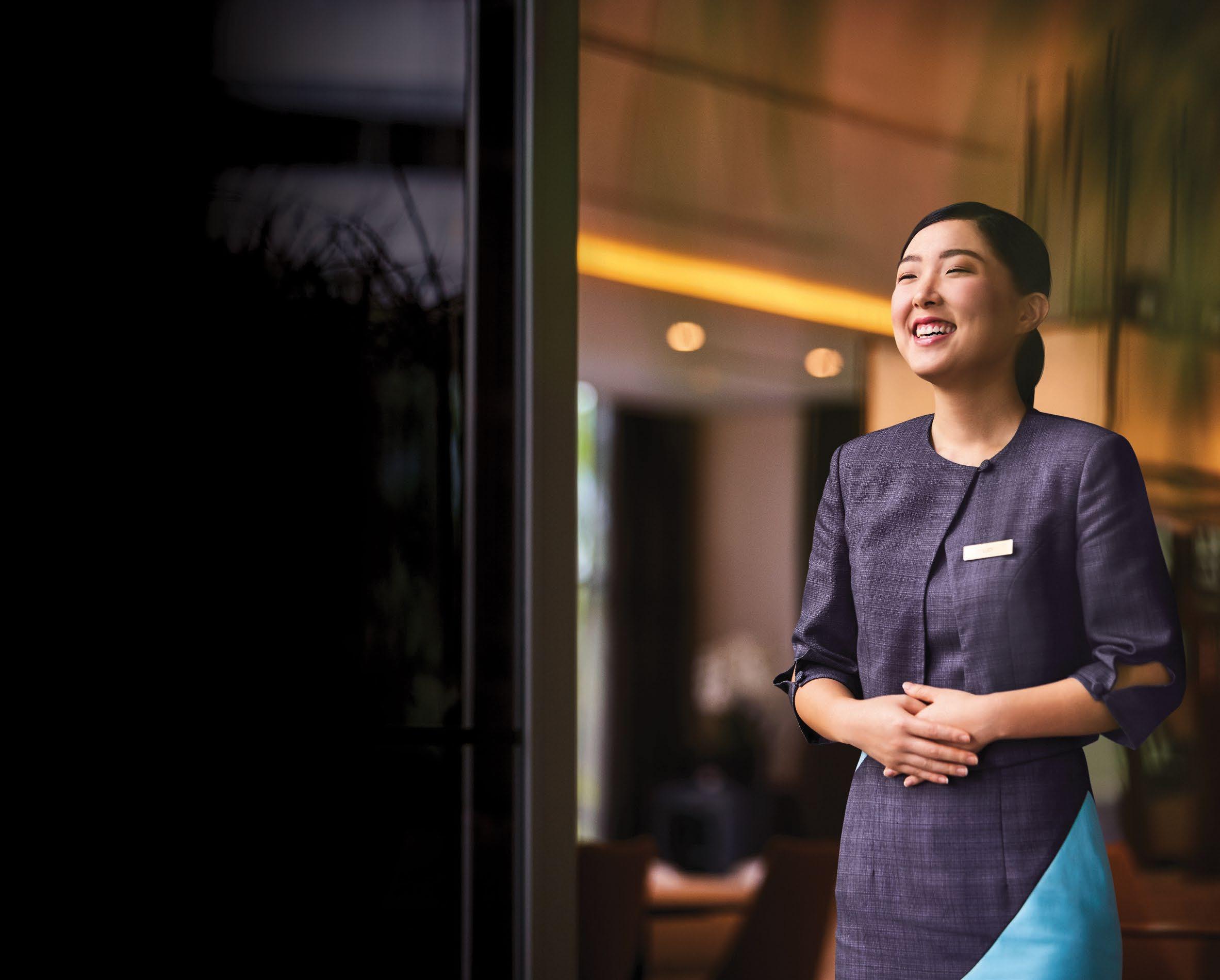


Invisible.
F eel a t hom e a r o u nd t h e w o r l d Since r
You r s The World of Pan Pacific Hotels Group | panpacific com Singapore • Kuala Lumpur • Penang • Malacca • Langkawi • Bangkok • Yangon • Nay Pyi Taw • Hanoi • Ho Chi Minh City • Phnom Penh • Siem Reap • Jakarta • Dhaka Beijing • Tianjin • Xiamen • Suzhou • Ningbo • Dalian • Sydney • Melbourne • Perth • Tokyo • London • Seattle • Vancouver • Whistler, British Columbia • Toronto • Nairobi
ely

Starbucks Singapore's Patrick Kwok earns Executive of the Year - Food & Beverage Award
His transformative leadership helped the company surpass all the challenges it faced.
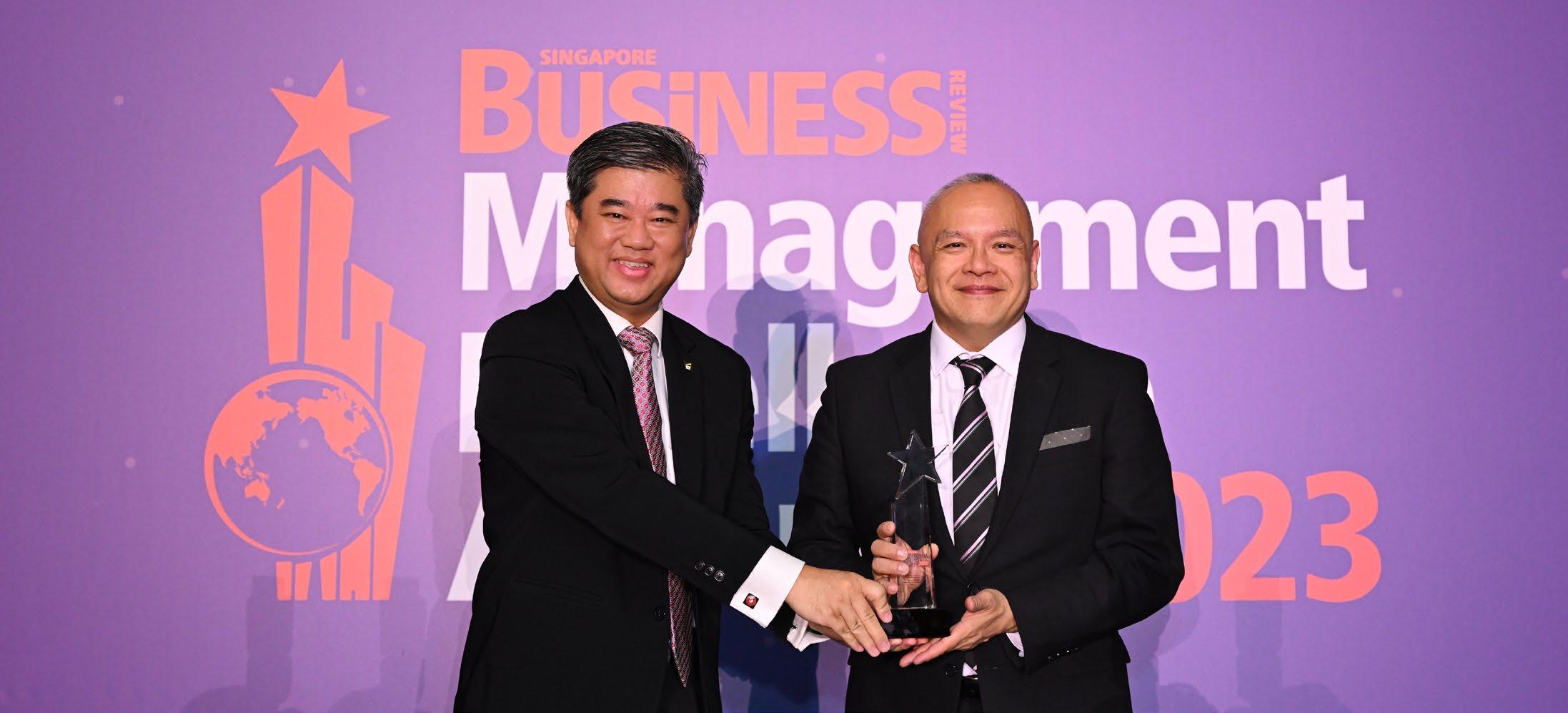
Starbucks Singapore’s General Manager, Patrick Kwok achieved a significant milestone by securing the Executive of the Year - Food & Beverage at the SBR Management Excellence Awards, a welldeserved accolade attributed to his innovative leadership. Kwok, a driving force behind the coffee chain's success, employed a variety of techniques to navigate and overcome challenges, solidifying Starbucks Singapore's reputation as an industry leader.
Patrick Kwok's leadership is marked by exceptional and brilliant skills, focusing on forward-thinking business strategies and innovations that result in exceptional customer experiences, complemented by a team of skilled baristas. Under Kwok's guidance, Starbucks Singapore exhibited resilience, strategic planning, and maintained an energetic workforce even amidst the challenges posed by the global COVID-19 pandemic.
Innovating Customer Experience and Sustainability
Kwok's management prowess is evident through unparalleled achievements in three critical areas: building a future-ready business, investing in people, innovation, and sustainability, and upholding the highest standards in Starbucks' experience, service,
and coffee expertise. Recognising the impact of technology on daily lives, Kwok strategically invested in digital platforms such as Shopee, Lazada, Grab, and an inhouse digital ecosystem, leading to recordbreaking digital sales.
Committed to delivering unforgettable customer experiences, Starbucks Singapore, under Patrick Kwok's leadership, embraced industry 4.0 technologies with the introduction of the award-winning Mobile Order & Pay feature on the Starbucks mobile application. Environmental stewardship is another pillar of Kwok's leadership, demonstrated through sustainability initiatives like transitioning to recycled and biodegradable materials for all single-use items since 2019. Starbucks Singapore actively promoted the use of for-here cups and implemented policies such as Bring Your Own Tumbler (BYOT) and Bring Your Own Bag (BYOB) to reduce single-use disposables.
Leadership Excellence in Adversity
In response to the challenges posed by the
pandemic, Starbucks Singapore, under Kwok's leadership, exhibited unwavering support for local and foreign partners, avoiding retrenchment or salary cuts for its workforce. The company received recognition from various organisations, earning accolades such as being the #1 F&B employer in The Strait Times’ Singapore’s Best Employers Survey, #1 Customer Service (Coffeehouse Chains) in The Straits Times’ Best Customer Service Survey, and receiving Business Review’s Technology Excellence Award for its Mobile Order & Pay feature on the Starbucks mobile application.
Starbucks Singapore, under the exemplary leadership of Patrick Kwok, has become synonymous with innovation, sustainability, and a steadfast commitment to both customers and its workforce. Kwok's transformative approach has not only driven Starbucks to unparalleled success but has also unequivocally proven that he deserves the Executive of the YearFood & Beverage recognition.
Starbucks Singapore, under the exemplary leadership of Patrick Kwok, has become synonymous with innovation, sustainability, and a steadfast commitment to both customers and its workforce
60 SINGAPORE BUSINESS REVIEW | Q2 2024
EXECUTIVE OF THE YEAR - FOOD & BEVERAGE
Patrick Kwok, Starbucks Singapore’s General Manager, at the SBR Management Excellence Awards

NAVIGATE NAVIGATEASIA'SASIA'SFINANCIALFINANCIALFRONTIERS FRONTIERS WITHWITH CGSCGSINTERNATIONAL INTERNATIONAL
With an extensive global distribution network and wide range of products and services, let us empower your investment journeys

WE’RE WITH YOU THROUGH EVERY TWIST AND TURN JUST ASK F1®
F1® circuits are replete with challenging hairpins and chicanes, and for over a decade we have been trusted to deliver every millisecond of the live action to millions of fans globally.
If we can do it for F1®, we can do it for you.




The F1 logo, FORMULA 1, F1, GRAND PRIX and related marks are trademarks of Formula One Licensing BV, a Formula 1 company All rights reserved.

Coca-Cola ASEAN & South Pacific champions gender equality and diversity with global initiatives
Aspiring to reflect the markets it serves, including to be 50% led by women globally, Coca-Cola supports gender diversity through inclusive practices, and development programmes.

As a purpose-driven organisation, The Coca-Cola Company and its global affiliates (collectively referred to as “Coca-Cola”) remain focused on investing to improve the lives of people, from employees to the people in the communities where Coca-Cola operates. Coca-Cola continues to prioritise listening and learning; executing its strategy consistently; and holding itself accountable for continuous progress.
Supporting inclusion and women
Coca-Cola's Global Women's Leadership Council consists of consists of senior female and male executives from across the organisation. The Council aims to identify and address barriers to women's advancement, develop initiatives, and ensure the organisation stays on track to achieve its 2030 aspirations to reflect the markets we serve, including, for example, to be 50% led by women globally. The Global Women's Leadership Council is currently chaired by Claudia Lorenzo, the Singapore-based president of Coca-Cola’s ASEAN & South Pacific operating unit.
Coca-Cola’s ASEAN & South Pacific operating unit is working to implement targeted capability-building and development programs for female talent at various stages of their careers. These programs include
leadership training, networking opportunities, opportunities for short-term assignments, coaching and mentorship, and skill-building workshops. These initiatives aim to prepare women for leadership positions. In addition, the ASEAN & South Pacific operating unit is focused on the following:
• Talent acquisition and hiring nextgen development strategies: we place a strong emphasis on sourcing and hiring diverse talent. We are working with recruiters and partners to ensure we're attracting talented women across all levels of the organisation. In addition, we’ve launched in the region a Young Professionals Program, which is a two-year early career journey aimed to help foster the next generation of talent in our organisation.
• Employee-led Inclusion Networks serve as valuable
resources to both employees and our company by providing opportunities to connect with colleagues across the business. In ASEAN & South Pacific, we have a very active Gender Balance Inclusion Network. This employeeled network rolls out programs to strengthen engagement, education, allyship, and action.
• Flexible work arrangements: We recognise the importance of worklife balance for all employees. We are committed to providing flexible work arrangements and supportive policies to help all employees succeed at work whilst maintaining a healthy work-life balance.
Our progress
Coca-Cola regularly tracks the progress of its initiatives. By holding itself accountable, Coca-Cola can ensure it is making tangible steps towards its aspirations. Coca-Cola also collaborates with partners to support women's leadership and advancement in the workplace.
Last year, coinciding with the final matches of the FIFA Women’s World Cup, Coca-Cola held its first-ever global DEI summit in Sydney. The one-day ‘Level the Playing Field’ summit was intended to drive enhanced focus for women and diverse underrepresented groups in business and society. It attracted influential changemakers from across the world, including Nobel Peace Prize winner Malala Yousafzai.

Coca-Cola collaborates with partners to support women's leadership and advancement in the workplace
62 SINGAPORE BUSINESS REVIEW | Q2 2024
DIVERSITY & INCLUSION INITIATIVE OF THE YEAR - FMCG














We understand that innovation is the cornerstone of progress. At HOYA Electronics, you’re empowered to bring your ideas to life and shape a brighter future.
With our supportive and inclusive workplace, you'll experience a culture that fosters your growth and development, providing you with abundant opportunities for skill-building and career advancement.
We recognize that your contributions are a vital part of our collective journey toward a better tomorrow, and we demonstrate our care by ensuring that your rewards are fair and competitive. Your unique contributions are valued, and together, we celebrate excellence.
You’ve come to the right place if you’re looking for a workplace that empowers you to innovate, develop, and grow while prioritizing your well-being.

Visit us at: Shaping Futures, Endless Career Possibilities HOYA Electronics
Empowered to make a difference 10 Tampines Industrial Crescent Singapore 528603 Scan for Job Opportunities
www.nus.edu.sg/careers
#WeAreHOYAElectronics
We’re more than just a company; we’re a community of forwardthinkers, innovators, and dreamers driven by a shared vision of innovating for a better tomorrow
LIM KEONG WEE OPINION
Singapore transforms urban housing with community-focused co-living spaces
Co-living has become a popular choice for young adults, offering an affordable and accessible housing option. Successful cohousing examples such as Vinderhoute Cohousing Project, Belgium and Svanholm, Denmark, where residents share communal facilities, have been shown to decrease isolation, particularly in seniors, and enhance the quality of life and mental health of residents.
They foster mutual support and create a sense of community, crucial in a high-density living environment like Singapore. However, co-living environments also present challenges, such as the risk of isolation leading to depression. To mitigate this, shared spaces need to be designed, planned and programmed to encourage social connections, networking, and learning, aiding in building lasting friendships.
Why are people so stressed out?
In Singapore's highly dense urban environment, several factors contribute to increased stress levels among residents.
The limited availability of land and the resultant space constraints have led to smaller living areas compared to previous decades.
This, coupled with a lack of natural hinterlands, intensifies the feeling of being cramped and contributes to daily stress.
The digital era has ushered in a fast-paced and competitive work culture, exacerbated by the rise of the internet and digital technologies.
This environment often leads to extended working hours, blurring the lines between professional and personal life, especially with the increasing adoption of hybrid work models.
Additionally, Singapore's high cost of living, as evidenced by its ranking as the most expensive city in the world in the Economist Intelligence Unit Worldwide Cost of Living Survey released on 30 November, places further strain on residents, particularly those in middle and lower income brackets.
A study by the Institute of Mental Health (IMH) during the pandemic revealed concerning levels of mental health issues among the Singapore population, with significant percentages suffering from clinical depression, anxiety, and stress. These findings suggest the need for ongoing research, especially in the post-pandemic era, where new challenges such as rising healthcare costs add to the existing pressures.
Design for wellness has to start early
Addressing these issues requires early intervention in designing environments conducive to mental wellness. This involves a holistic approach to spatial design, including the incorporation of biophilic elements, quiet spaces, and communal areas to enhance mental health.
The National Mental Health and Well-being Strategy of Singapore emphasizes the importance of a stigma-free environment, facilitating easy access to mental health services and support.
Innovative design approaches, such as salutogenic designs, more human-centered than disease-focused concepts which are used in healthcare settings to improve patient recovery, can be adapted for co-living spaces. These designs aim to reduce stress and foster community interaction, which is essential for mental health.
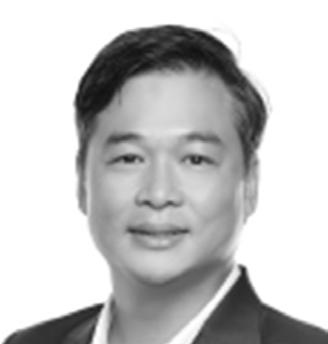 LIM KEONG WEE Designer, Entrepreneur, Co-founder, and Director PAC Pte Ltd
LIM KEONG WEE Designer, Entrepreneur, Co-founder, and Director PAC Pte Ltd
Technology also plays a significant role in enhancing accessibility to mental wellness resources. Digital platforms and apps focusing on mental wellness, like Safe Space that offers live online support, are becoming increasingly popular.
Collaboration with mental health experts in co-living spaces is critical for implementing effective mental wellness programs, normalising discussions about well-being, and providing early detection and support for those in need.
Community engagement and continuous feedback are vital in shaping relevant mental wellness initiatives and ensuring their effectiveness. Programs like the Mind Science Centre’s Age Well Everyday, which supports community aging well, are examples of such engaging and collaborative initiatives.
Wellness is a way of life
In the context of modern living environments, the emphasis on mental wellness and the implementation of wellness programs have become increasingly important. Recognizing that individuals spend a significant portion of their day at work, often more than a third, the integration of wellness strategies in both work and living spaces is essential and must be a priority for owners and developers.
One prominent approach to enhancing wellness in workspaces is the use of biophilic design. This design philosophy incorporates elements of nature, such as greenery, into the built environment.
Wellness initiatives should not be an exceptional practice but rather a standard aspect of culture. This approach extends beyond traditional office spaces to include co-living and co-working environments, reflecting the changing societal norms and the increasing prevalence of such spaces.
In line with this, the Singapore Land Authority has announced plans to allocate more state properties for co-living purposes. These co-living spaces, distinct from conventional residential models, require unique integration strategies. They need to be developed as independent communities, quite different from the typical networks which come under the People’s Association umbrella. This shift calls for a thoughtful approach to ensure that these spaces effectively support the well-being of their residents. The Singapore government, through its National Mental Health and Well-being Strategy, has laid out a vision for the future where mental wellness is a fundamental component of the overall well-being of its citizens. This strategy outlines the need for a comprehensive and integrative approach to mental health, considering the various facets of daily life, from work to living environments.
The successful execution and integration of these wellness strategies are crucial. The goal is to foster a society where mental well-being is regarded as vital as other basic needs, ensuring a holistic approach to health that encompasses both physical and mental aspects. This vision advocates for a paradigm shift in how mental wellness is perceived and addressed within the societal fabric of Singapore.
64 SINGAPORE BUSINESS REVIEW | Q2 2024

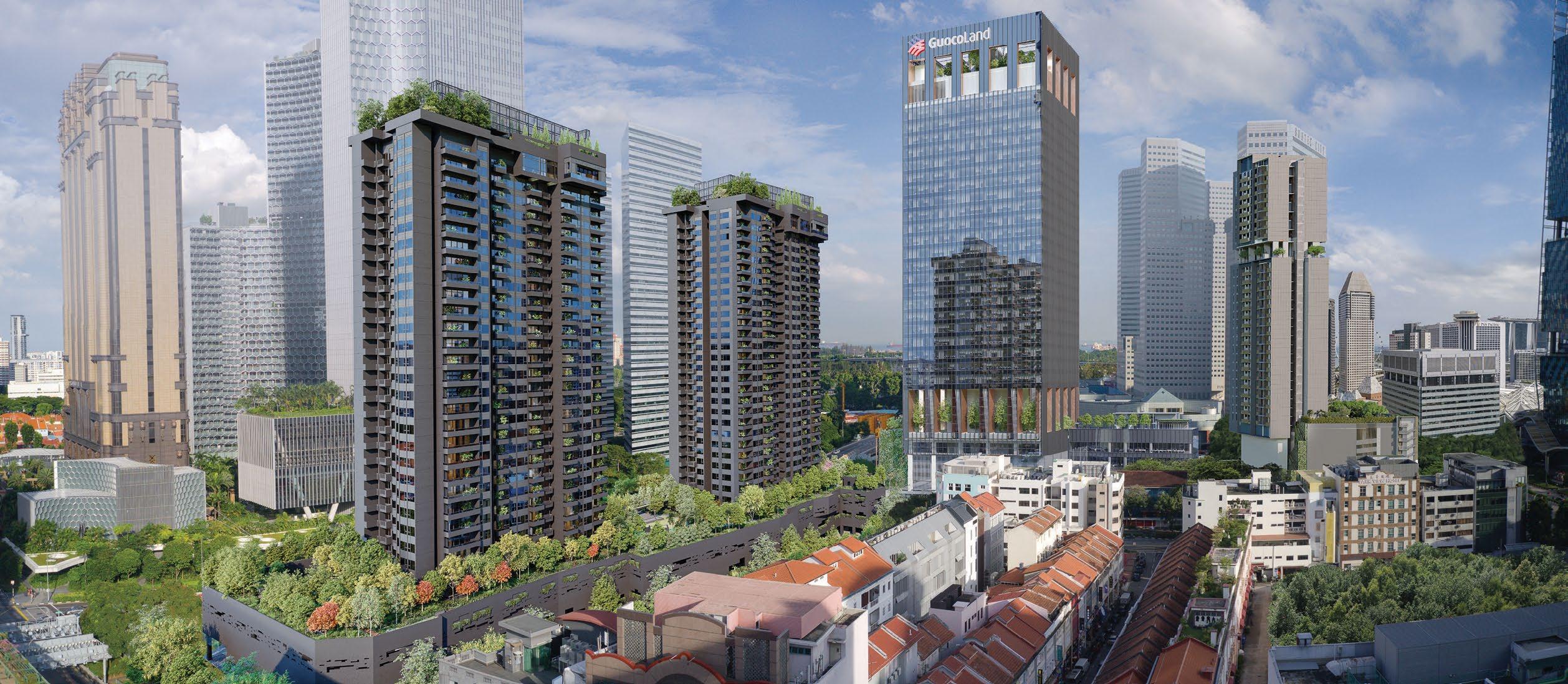




















































































































































































































































































































































































 LIM KEONG WEE Designer, Entrepreneur, Co-founder, and Director PAC Pte Ltd
LIM KEONG WEE Designer, Entrepreneur, Co-founder, and Director PAC Pte Ltd




